Free shipping over $75 USD
Get the most effective travel essentials here.

Learn about our story and our products.

- Try FLIGHTFŪD We're currently experiencing turbulence


Your carry on baggage
Free US Shipping on Orders $39+
Before you take off, we think you may also love this.

Water Bottle
- Try FLIGHTFŪD
- The Frequent Flyer's Guide to Traveling with Vitamins
It’s easy to lose track of a few things when you’re traveling, but the one thing you don’t want to lose track of is your health.
When you’re waking up early for your flight, spending your entire day in the air at 35,000 feet, and sitting in a box full of germs and airborne viruses, your body is subject to a few health impacts .
And that’s just the physical act of traveling! Not to mention what happens to your body when you arrive at your destination.
It’s important to make sure your body has what it needs no matter where you are. With this guide, we’ll help you understand everything you need to know about traveling with vitamins and supplements.
The Importance of Traveling with Vitamins
It might not seem like it sometimes, but packing vitamins is more important than remembering to bring your laptop or portable charger.
Our bodies need a daily dose of vitamins, minerals and enzymes that help us maintain our overall health and boost our immunity to prevent getting sick. We typically get these vitamins through a balanced, whole-food diet.
Read More: Research Shows You’re 100x More Likely to Get Sick on a Plane. Here's Why
But when we travel, we don’t always get the chance to take in all the vitamins our bodies need.
Traveling with vitamin supplements is essential for your health because finding healthy food options can be scarce when you travel. It's also one of the many Just because you’re on the go doesn’t mean you should sacrifice your daily routine that keeps your body operating at peak production levels.
Making sure vitamins are a priority when you travel can give you the energy and strength you need for your next trip and benefit your overall health.
Best Vitamins and Supplements for Traveling
There are 13 different vitamins that your body needs and a ton of other supplements out there that help with your health, but only a few are essential for travel.
When you travel you miss out on things like getting enough sunlight and enough whole-food options plus your immune system is constantly fighting off all the germs that can be on the plane. Some of the best vitamins to bring with you can help you give your body the boost it needs.
#1. Vitamin D
This vitamin is crucial to bring with you during your travels because it supports bone, blood, and immune system health. Vitamin D allows your body to absorb calcium to build strong bones. It also helps maintain phosphorus levels in the blood and helps your immune system fight off disease.
Vitamin D is the sunshine vitamin because you absorb it through exposure to the sun. But during most trips, your only exposure to the sun will be when you’re entering or leaving the airport. Overall, you won’t be absorbing much Vitamin D when you travel. Vitamin D can also be found in foods such as fatty fish and mushrooms, but you won’t usually find many of those options on a menu at the airport or on the plane.
Bringing Vitamin D supplements with you when you fly will help your bones, blood and immune system maintain its healthy functions even when you don’t have time to walk in the sunshine.
#2. Vitamin C
Planes and airports are a hub for all kinds of germs. Even if you bring as much hand sanitizer as the TSA will allow, you need to be sure your immune system is up to the challenge when you fly.
Vitamin C is an essential nutrient that helps your immune system by giving your white blood cells the boost they need to fight off disease. It’s also important for maintaining your blood pressure, which could increase with the stress that comes from traveling.
Vitamin C supplements come in many forms but the most popular is a powdered drink mix or tablet.
One pack of Flight Elixir has 110% of your recommended daily Vitamin C intake through its natural ingredients like the Camu Camu berry, goji berries, and coconut water.
The battle against airborne germs can seem endless, but supplementing with vitamin C (and staying hydrated!) can keep your immune system strong enough to fight off disease.
#3. Melatonin
Abrupt changes to your time zone and sleep schedule are sometimes unavoidable when you travel.
Melatonin is a natural alternative to other sleep aids that can help you get some sleep when you find yourself tossing and turning away from home.
One of the most natural ways to get a dose of melatonin is through the tart cherry, which is a key ingredient of the Flight Elixir .
With the added melatonin from the tart cherry, Flight Elixir can help you get some much-needed rest and back on track with your circadian rhythm during an exhausting travel day.
#4. Magnesium
Sitting in a middle seat for a long haul flight with no hope of stretching your legs can put a lot of stress on your muscles up until it’s time to land. Magnesium is a great supplement to help when you’re crammed onto a tiny plane and need to help your muscles relieve tension and aid with overall soreness
Falling asleep on the plane is also tricky sometimes, but magnesium naturally relaxes your body so it can help you avoid issues when you’re trying to fall asleep on the plane . Getting enough sleep and protecting your muscles from any extra strain is crucial to keep you feeling rested and ready for the challenges you might face on your next trip.
Circulation Support
#5. vitamin b12 .
Take care of your blood flow instead of stressing about traffic flow when you’re traveling by bringing Vitamin B12 with you on your next trip. This vitamin is essential for the health of both your blood and nervous systems so having it with you will help support healthy blood circulation.
Vitamin B12 can also help you sharpen your focus when you feel like you’re in a fog because it supports healthy brain function. That’s super important when you’re feeling rundown at the terminal but still need to read the signs to find your gate.
As an added bonus, Vitamin B12 can even help improve your mood when the stress of traveling is putting a damper on your travel day.
Read More : Swelling When Traveling? Here’s Why It Happens + What to Do
#6. Iron Supplements
Iron is a major supporter of red blood cells and helps produce the protein that allows these cells to bring oxygen to other parts of the body. Getting enough iron in your day is crucial for proper blood circulation, which is even more important when you’re out traveling all day.
While supplements are one way to get enough iron, you can also find iron in many natural foods like leafy greens, quinoa, and goji berries.
Cosmic Radiation Support
#7. vitamin e.
Antioxidants give our bodies a boost when it comes to fighting off disease and Vitamin E is a great antioxidant for traveling. Not only will Vitamin E support your immune system, but it also helps your body fight off free radicals, which you’re more exposed to when you’re traveling on a plane.
When we fly, we’re more at risk to the effects of cosmic radiation, so packing Vitamin E along can help you fight off the damage this radiation can cause to your cells.
#8. Chlorella and Spirulina
Another way to heal from the effects of cosmic radiation is the natural supplements Chlorella and Spirulina. These two strains of algae bind to radioactive particles remove them from your system entirely. They also help repair DNA damage to already harmed cells from your previous travels.
Flight Elixir contains both Chlorella and Spirulina as a way to fight off the effects of cosmic radiation so you can keep traveling as much as you want without having to worry about the long term effects on your body.
Digestion & Bloating
#9. whole foods powders.
If you’re someone who likes to travel light, you can get a little bit of everything you need with a whole foods powders, which are made from greens, vegetables, seaweed, probiotics, and digestive enzymes.
With the added bonus of probiotics and digestive enzymes, whole food powders can also help with the symptoms of bloating and aid in digestion when you’ve been traveling all day.
Read More : Bloating after Flying: What Causes Jet Belly & How to Prevent It
One of the best natural sources of digestive enzymes is papaya (which is why it’s a key ingredient we use!). Papaya is a rich source of the enzymes papain, chymopapain, caricain and glycyl endopeptidase that each aid in healthy digestion.
TSA Rules for Traveling with Vitamins
The TSA has a lot of rules that can be tough to remember when you’ve already got so many things on your mind.
You might think that the TSA restricts transporting vitamins and supplements because they could be mistaken for other medications. But in reality, the TSA rules for vitamins are simple.
Vitamins and Supplements in your Carry-On

You can carry the following in your carry-on:
- An unlimited number of vitamins in pill or tablet form (though you may be stopped at the security checkpoint if you have massive quantities)
- Powdered supplements (such as protein powders, greens powders, and Flight Elixir !)
If your vitamins are in liquid form, you just have to comply with the TSA’s policy on liquids which restricts containers to 3.4 ounces or less.
As long as you comply with the liquid policy, there’s no need to inform the TSA officer of your vitamins or leave them in their original packaging.
Knowing that the TSA actually allows you to bring your vitamins with limited restrictions can help you be able to take your vitamins before and after you’re through security.
Vitamins and Supplements in your Checked Bags
Traveling with anything in your checked baggage is much more simple than in a carry-on.
You can typically get away with more volume without getting stopped at the security checkpoint to be searched, and you can pack full-sized bottles of liquid vitamins and supplements in your checked bags.
Just be careful to pad any glass bottling properly so nothing gets broken in transit. The last thing you want is to arrive at your destination and find a broken bottle of fish oil ruined your clothes and suitcase!
Tips for Packing Vitamins for Your Flight
Making sure you have enough vitamins for your trip and that they are easy to access on a flight is crucial to staying healthy when you travel. You’ll want to be sure you have everything you need and can find your vitamins with ease on your next trip. Here are a few tips for packing vitamins for your travels.
#1. Bring Extra Doses of Your Daily Vitamins
When you’re packing your carry-on make sure that you bring at least two days worth of vitamins, even if it’s a short trip, just in case you can’t get a hold of your checked luggage right away. Having vitamins with you at all times helps you be prepared for the unexpected so you don’t have to sacrifice your health when something goes wrong.
#2. Keep Vitamins Close in your Carry-on
You might be on the go all day and the only time you have to take your vitamins is while you’re sitting on the plane. In that case, you’ll need your vitamins packed in your carry-on so you can take them while you have the time.
Waiting for checked luggage or for the free time after a day is already done can make you miss out on key nutrients for your travel day so keep your vitamins handy and ready to go in your carry-on luggage.
#3. Try a Travel Pill Case
The TSA allows for an unlimited number of vitamins in pill form, but packing different pills that all look the same can get confusing. A great way to avoid the hassle of digging through your bag to find the right pills is a travel pill case. You can fill each day accordingly with the vitamin dosage of your choosing.
#4. Bring The Travel Water Bottle
When you’re rushing through the airport to make it to your gate, you don’t always have time to stop for a bottle of water. Bringing The Travel Water Bottle with you on your flight can help you when you need to have a little water for swallowing vitamins in pill form or having something to pour your powdered vitamins into.
Taking Vitamins on the Plane
The TSA allows you to bring vitamins in pill, liquid and powdered form as long as you comply with the overall liquid standards so you’ll be able to take your vitamins with you on the plane.
Just like any other medication, here are a few helpful reminders for taking vitamins on the flight:
- Bring water with you so you can take your vitamins even before the flight attendants have started their service
- Keep track of your daily doses if you’re headed to a new time zone and try to stay with the same time as you would if you were at home
- Take sleep-aiding vitamins with care to maximize their help in beating the effects of jet lag
Traveling with Vitamins Made Simple
Taking your vitamins is an important part of everyday life, but it can get lost in the midst of a busy travel day. Knowing what vitamins to bring with you and how to bring them on your flight can help you maintain your health while you’re away from home.
What vitamins do you bring with you when you travel? Did we forget any vitamins you think are important? Do you have any suggestions for maintaining your health when you travel? Let us know in the comments below.
Check out : Travel Fatigue Explained: Signs, Symptoms & Causes
Sarah Peterson
Sarah Peterson is the co-founder and head of marketing at FLIGHTFŪD. She's a travel health expert and after having visited 20+ countries as a digital nomad and flying every 4-6 weeks for business, she became passionate about empowering others to protect their bodies on the go.
Leave a comment
Explore more.
- Healthy Travel
- things to do
- Travel Destinations
- travel essentials
- Where to eat
- where to stay
Popular posts

Featured product
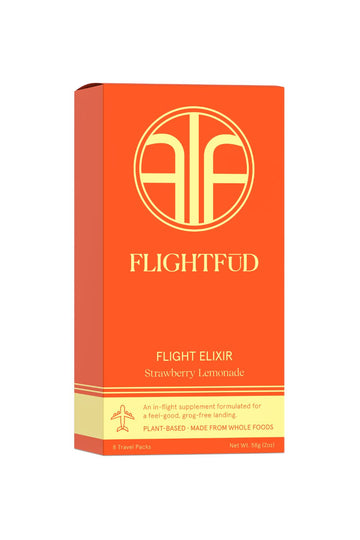
FLIGHT CHECK IN
Check into the VIP News Room. Stay up to date on all flight changes.
Should I take supplements during air travel — if so, which ones?

The word supplement means exactly what it says on the packet ... an add-on that supplements something. Dietary supplements are not designed to replace a healthy eating plan. However, we are in a fast-paced society where there are a lot of toxins, poor food choices and nutrient-depleted soil, so now it is more important than ever to consider a supplement in your daily routine.
Are supplements expensive?
Supplement quality varies just the same as food quality does. For instance, you can choose to buy basic "economy" meat or organic free-range meat. This applies to supplements, and most mass market-produced supplements are low quality and have little effect on the body. There are, however, some supplements that have shown efficacy in clinical trials and support the body the way they are intended to.
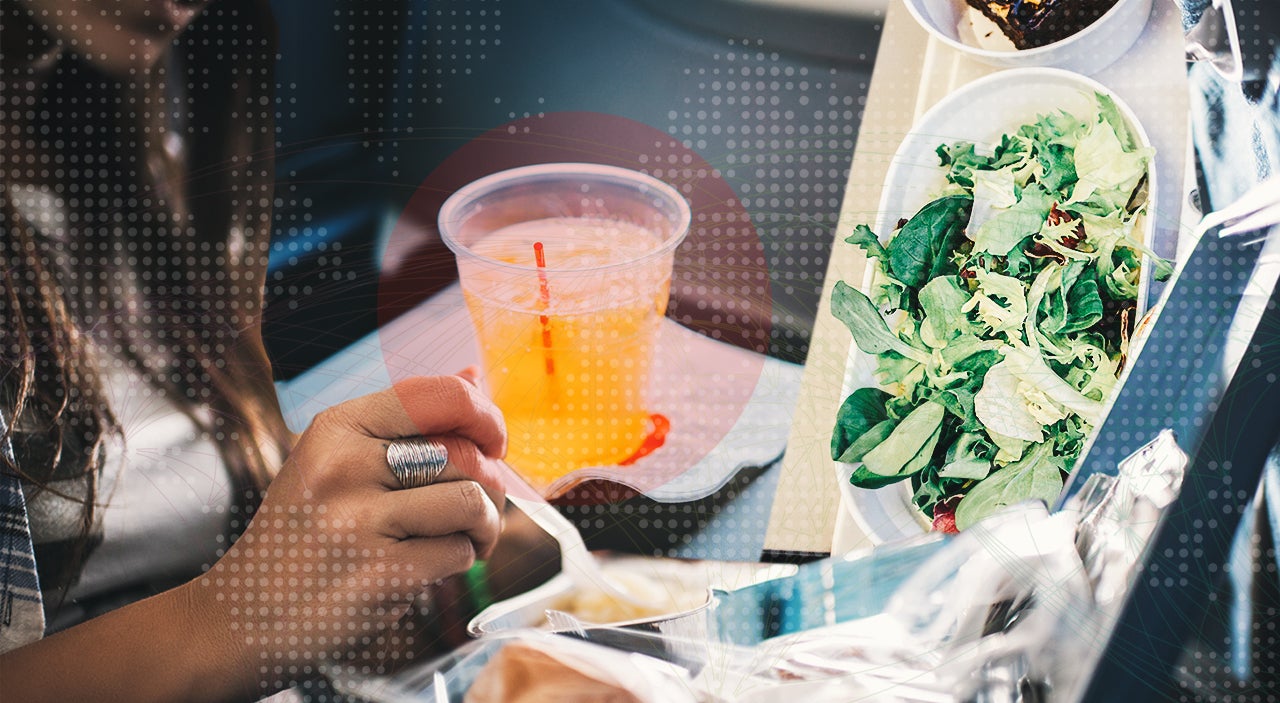
How to choose a good supplement
The first thing is to look at what fillers and binders are in the supplement. These can be ingredients such as magnesium stearate, sucrose (sugar), silca and calcium carbonate. Ideally you should avoid these entirely — so look for a company that does not use any fillers or binders. Next, the vitamins should be in their "active" form. Look for L-Methyl Folate over Folic Acid, Magnesium Glycinate over Magnesium Oxide and Methyl-B12 over Cyno-B12. Finally you should consider the amounts you are getting in the supplements. A good quality supplement brand can offer 25-50mg of B2 where an inferior brand may only offer 1mg, for example.
Whilst supplements can be very effective, you should be careful that they don't interfere with medication that you are already taking. Speak to a health professional before taking any.
Further reading : How to stick to your diet if you're a frequent flyer
Supplements do different things, so there isn't a single multi-tablet you can take that will cover everything you need. Obviously, there are some side effects that can occur as a result from flying long hours, and in this case, taking a supplement can prevent unwanted symptoms or help speed up recovery at your destination.
With the low cabin pressure, some passengers can get off a long-haul flight feeling bloated and even constipated for a few days. Coupled with a new environment and cuisine, it may give some digestion issues, so it's good to support digestion with a probiotic when traveling.
It can be particularly useful to supplement this with Sacromyces Boulardii, which will further support the immune system of the gut and ward off the unwanted "Delhi Belly." Saccharomyces boulardii helps to fight off disease-causing organisms in the gut and you can buy it in health shops. It's often labeled as a "bowel calm" on the packet. It's best to take both for a few days before traveling, during your trip, and a few days after.
Make sure you get a shelf-stable probiotic so you don't have to refrigerate it at your destination.
Digestive Enzymes
To further support digestion, you could consider taking a digestive enzyme on the plane when eating. This can support your body in breaking down food.
There are three main types of digestive enzymes:
- Proteases: These break down protein into small peptides and amino acids.
- Lipases: These break down fat into three fatty acids plus a glycerol molecule.
- Amylases: These break down carbs like starch into simple sugars.
Some people may not be able to naturally make enough digestive enzymes, which can slow the digestion process and therefore lead to uncomfortable symptoms such as bloating and flatulence. You can buy a digestive enzyme complex, which should have all of the enzymes listed above. Enzymes should ideally be taken 20 minutes before eating.
If you just want to take one supplement while traveling, then magnesium is the one. It's the one supplement that can act as an all-rounder and in terms of flying, yields benefits for jet lag, rehydrates by supplying electrolytes, relaxes muscles, helps promote calm in the body and also supports the nervous system for panicky flyers.
Magnesium comes in many forms — the most preferred is Magnesium Glycinate, which has the best bioavailability and is easy on the bowels.
Further reading : Things you should do before, during and after flying to stay healthy
Supplements for preventing leg clots
Nattokinase and Pine Bark extract are researched to help protect against Deep Vein Thrombosis (DVT) , which can occur when traveling long distances without much movement. These supplements can prevent leg swelling and leg clots and thrombotic risks in travelers.
Supplements for the immune system
Traveling can put a stress on the immune system so it's important that it is functioning well. Key nutrients for the immune system include vitamin A, C, D, Zinc, Elderberry and Beta Glucans. Don't fret over taking all of these individually, as many supplement companies offer immune complexes which have most, if not all of the above in their ingredients.
Even if you're not a fan of supplements then it's wise to make sure your vitamin D is sufficient. You can request a test from your GP or online and it's advised to supplement with D3 if deficient.

Antioxidants
These supplements can play a role in fighting free radicals in the body and also protect the skin against sun damage when traveling. If you're a frequent flyer or cabin crew, then it may support the radiation impact from flying. Supplements to include are vitamin C, E, Selenium and also Glutathione — a master antioxidant in the body.
Supplements for jet lag
Melatonin (the sleep hormone) is an over-the-counter supplement and widely used among frequent flyers. There can be other ways to support recovery from jet lag. You can use valerian drops or even use 5-HTP, a supplement, which comes from the seeds of an African shrub known as "Griffonia simplicifolia." 5-HTP helps produce serotonin and then converts it to the hormone melatonin and therefore promotes sleep.

While traveling's exciting, a vacation can also be (ironically) tiring, especially if you're in a different time zone and away from your regular routine. If you want to avoid becoming a traveling zombie, the best vitamins for traveling can help you stay healthy and relaxed while you're out of the office. What's more, in some cases it's even beneficial to switch up your supplement routine while you're traveling.
"Depending on the type of vacation and location, you may consider adding supplements to achieve certain goals, Dr. Jeffrey Gladd, a member of the scientific advisory board for Care/of , which builds personalized vitamin packs, tells Bustle.
"If you are going on a relaxing, rejuvenating trip, it may actually be worth cutting down on some of your supplementation to give yourself a break. This would also help you gauge whether supplements or a focus on relaxation is what you really need." On the other hand, if you current vitamin and supplement is working for you like a boss, it's best to stick with it, though you might want to consider adding supplements depending on your destination. "If you are going to an area where unfamiliar foods may be introduced into your diet, adding a probiotic to your regimen before heading out and continuing for a few weeks upon your return can help support your digestion," Dr. Gladd advises. If you're planning a late-spring getaway, these are the best vitamins and supplements to take while you're traveling based on your vacation goals.
Bump Up The Vitamin B
Vitamin B gives your immune system a boost and amps up your energy, making it an ideal addition to your supplement regimen if your vacation is going to be a little wild. "If you predict your level of alcohol intake is going to increase while on vacation, you may consider increasing your B vitamin intake to a healthy level with a B complex or additional multivitamin," Dr. Gladd advises.
Bring The Probiotics
One of the quickest ways to derail a vacation is by getting an upset stomach, so Dr. Gladd recommends bringing probiotics on any trip where you may be eating unfamiliar food. "Probiotics [are] essential for supporting digestive health, especially when traveling," he tells Bustle. "Probiotics help support gut health by overpopulating the digestive tract with healthy organisms." While probiotics can't prevent you from coming into contact with food-borne illness, they can strengthen your stomach when you're enjoying food you might not eat at home.
Make Room For Milk Thistle
In addition to stocking up on vitamin B during a booze-heavy trip, you'll also want to make sure you bring some milk thistle, which, despite its name, does not contain any dairy. "If your alcohol intake increases, or you plan on taking acetaminophen more regularly throughout your trip, consider additional support from this liver supporting herb," Dr. Gladd recommends.
Always Have Adaptogens
Whether you're traveling for work, or you're on a vacay, the last thing you want to bring with you is stress. This is where adaptogens like Rhodiola or Ashwagandha come in handy. "These adaptogenic herbs can help support stress and can help you maintain balance when things can get hectic. I recommend you start taking them three to four weeks prior to your trip to keep your system in balance and to help maximize your enjoyment during vacation," Dr. Gladd says. "Because studies show that the most stressful parts of a trip are at the end and upon returning home, consider some adrenal support during this time and continue for three-to-four weeks."
Eat Your Elderberry
Between the planes, trains, and automobiles that come along with traveling, a lot of people get sick while on vacation. If you want to increase your chances of staying well, take elderberry, which contains a powerful immune-boosting antioxidant , according to WebMD.
Don't Forget The Vitamin D
Even if you plan on getting your vitamin D from the sun while on vacay, it's still a good idea to make sure you're getting enough of this immune-system-boosting vitamin. With the threat of skin cancer, you're likely not going to spend much time in the sun without your SPF. And, sunscreen actually limits the amount of vitamin D your body can absorb, according to WebMD. This is why it's a good idea to bring a supplement with you.
Master Your Sleep With Magnesium
If you have a hard time sleeping away from home, adding a little extra magnesium to your supplement regimen can not only regulate your digestion, it can also help you drift off to dreamland. According to the blog The Sleep Doctor, "People with low magnesium often experience restless sleep, waking frequently during the night. Maintaining healthy magnesium levels often leads to deeper, more sound sleep."
Travel With Theanine
If it's relaxation you're after during your travels, turn to Theanine. "This is an amino acid found in green tea, among other places, and is connected to the relaxing feeling you get when you drink a cup of tea," Dr. Edison de Mello told The/Thirty. " Theanine has been shown to reduce stress responses in your body so you feel more relaxed, even in situations that stress you out."
Look To Licorice Root
While it's not how your favorite Red Vines are grown, licorice root does have myriad benefits, including helping you feel more awake. "That's because licorice root regulates your adrenal glands , which are the stress glands in your body," Dr. de Mello told The/Thirty. The adrenal glands release two hormones: adrenaline and cortisol. Those are the hormones that make you feel stressed. But licorice root can help slow the production of those hormones."
If you're leaving on a trip tomorrow, it's probably not a great idea to start taking all of these vitamins and supplements and hopping on a plane without knowing how they'll affect you. However, if you've got a trip planned next month, you might want to start sampling these recommendations leading up to your travels. If they work for you, pack them in your carry one to ensure you have them when you land.
Welcome to our store

multivitamins:
- Men's Multivitamins
- Women's Multivitamins
- Kids' Multivitamins
- Prenatal & Postnatal
- All Multivitamins
- All Vitamins
A daily dose of all the key nutrients your body needs—formulated just for men.
supplements:
- Acidophilus
- All Supplements
- All Minerals
- Ashwagandha
- Turmeric Curcumin
omega-3 supplements:
- Fish Oil & Omega 3
- Flaxseed Oil
- Triple Omega
- All Omega-3 Supplements
- Adult Gummies
- Daily Packs
- Diabetes Health Pack
- Hair, Skin & Nails
- Kids First Gummies
Delicious, bite-sized, and full of healthy benefits for your growing kid.
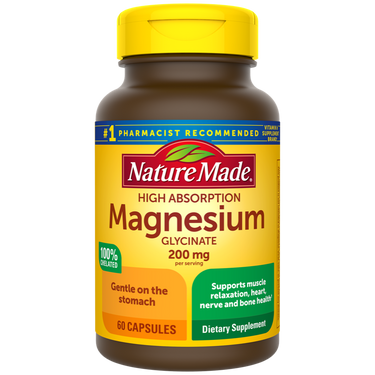
High Absorption Magnesium Glycinate Capsules 200 mg
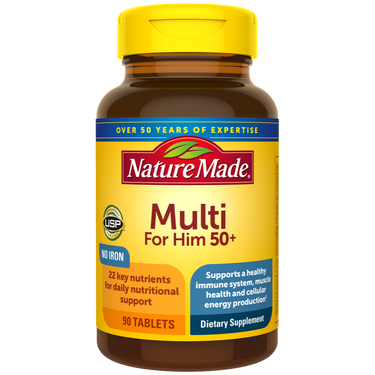
Men's Multivitamin 50+ Tablets
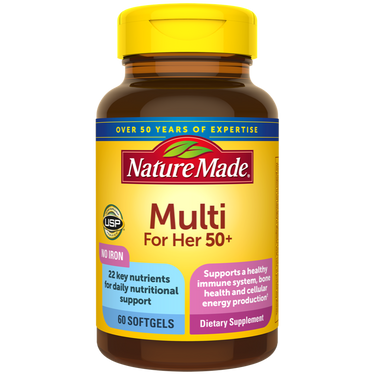
Women's Multivitamin 50+ Softgels

Vitamin D3 2000 IU (50 mcg) Softgels
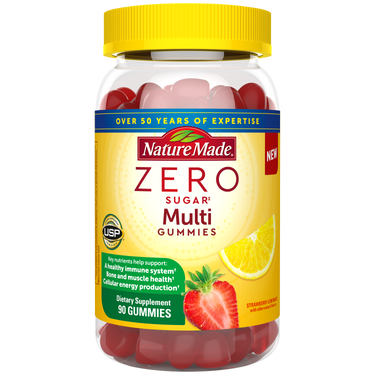
Zero Sugar‡ Multivitamin Gummies
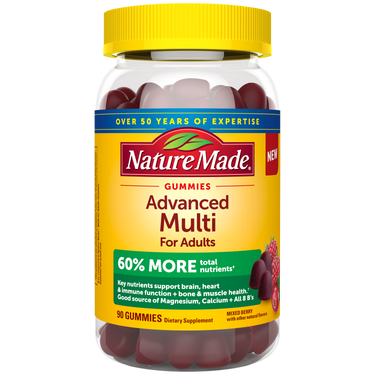
Advanced Multivitamin For Adults Gummies

Choline Extra Strength Dosage 800 Mg Per 3 Capsules
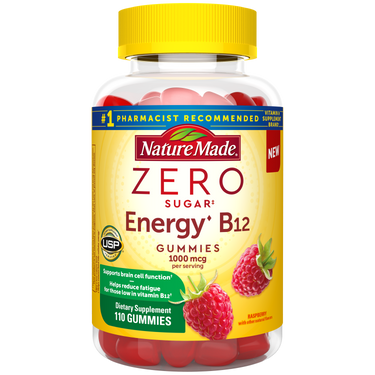
Zero Sugar‡ Energy◆ B12 Gummies 1000 Mcg Per Serving
Access expert insights, research, and other helpful content related to your health.
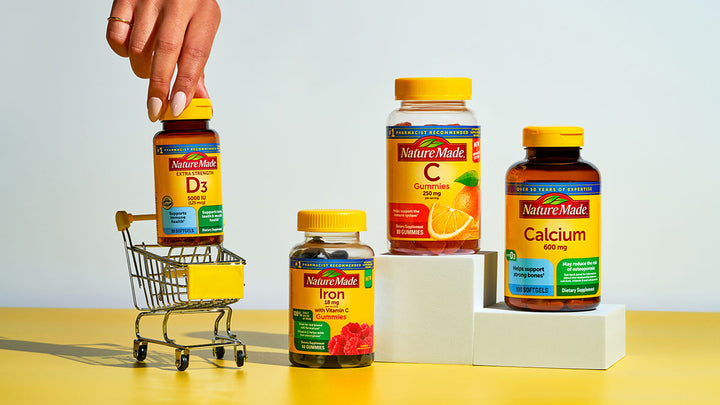
Learn where our story began, and how we continue to evolve alongside our customers.
- Balance Wellness

- Shop All Wellblends
Nature Made ® Wellblends ™ is a complete line of scientifically-designed blends that target your specific sleep, stress & immune health needs.
- Bundle & Save
- Subscribe & Save
- Advanced Multis
- Glucosamine
- Multi + Omega 3
- Multivitamins
- Multivitamins, Advanced
- Omega 3-6-9
- Omega-3 Supplements
- Prenatal & Postnatal Multivitamins
- Supplements
- Triple Flex
- Zero Sugar Gummies

Discover which Nature Made vitamins and supplements can support your wellness goals†
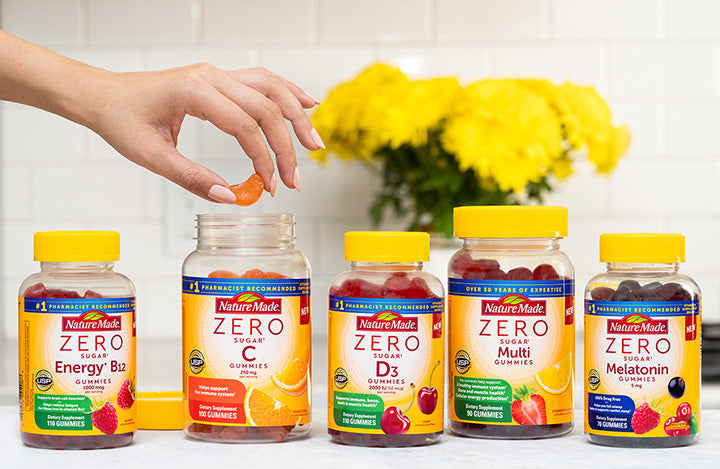
Discover how you can get the benefits you want from the nutrients you need without the sugar normally found in gummies.†
- What Do I Need?
- Ask Our Experts

Adding a multi to your morning routine sets you up for a great day ahead.
- Play Pickleball

- About Nature Made

$25 away from Free Shipping
$35 away from a Free Gift
You May Also Like

Item added to your cart
$0.00 away from Free Shipping You have earned Free Shipping
$35 away from a Free Gift You have earned a Free Gift

Wellblends™ ImmuneMAX® Fizzy Drink Mix
Free ($19.99 value)
5 Supplements, Vitamins & Nutrients that are Essential to Take While Traveling
Quick health scoop:.
- Traveling can be fun and exciting. Try to maintain some of your regular health habits, like your vitamin routine, to help support your overall wellness and enjoyment of your trip.
- Support your stress management, immune health, and digestive health while traveling with supplements like Ashwagandha, Vitamin D, Vitamin C, Magnesium, and Probiotics, respectively.†
- Pack your supplements smartly by keeping them secure in your carry-on luggage, avoiding liquids, and instead choosing forms that are less likely to be affected by environmental changes.
Are you planning a trip to the beach or the city? Catching an international flight or heading for a mountain getaway? Just because you’re taking a hiatus doesn’t mean your everyday health routine has to. In addition to maintaining your diet, exercise, and sleep habits as much as possible, it’s beneficial to continue your normal supplement regimen while traveling .
Let’s consider why traveling with your vitamins and supplements should be a key part of your packing plan, plus which ones we recommend make the cut and how to pack vitamins for travel. By the way, can you bring vitamins on a plane?
The Importance of Traveling With Vitamins
Traveling is a favorite pastime for good reason. But when planning your itinerary of activities and adventures, make time to continue some version of your normal health routine. In order to get the most out of your experience, it’s important to take care of yourself. If you’re used to taking vitamins and supplements at home, this is a simple practice to continue as you travel.
Furthermore, vitamins and supplements can help bridge any potential nutrient gaps you may experience during travel, as you might be eating differently than normal. Traveling can also interrupt your sleep pattern, especially if you’re adjusting to another time zone . Maintaining your supplementation routine may help support your wellness . If you’re asking yourself, what vitamins should I take every day , we’ve got you covered with 11 vitamins, minerals, and supplements to maintain your health.
Learn More: How To Support Your Sleep Schedule: A Guide
5 Supplements and Vitamins that are Essential to Take While Traveling
In addition to your favorite daily multivitamin, the below supplements would be helpful to support your wellness while traveling.
1. Ashwagandha
Along with all the joys of travel can also come new stresses on your body. Ashwagandha is a traditional herb long used for its adaptogenic properties to help adapt to stressors. Additionally, Ashwagandha reduces feelings of stress and occasional anxiousness.[1] Try Nature Made® Ashwagandha Capsules , formulated with clinically studied SENSORIL® Ashwagandha to reduce stress.†
2. Probiotics
One of the most common complaints associated with traveling is a change in bowel habits. This is because your gut microbiome, home to trillions of organisms, can be sensitive to changes in routine, diet, sleep, and more.[2] Probiotics can help support gastrointestinal health. Digestive Probiotics Advanced Dual Action Capsules help support healthy gut flora in the small intestine to relieve occasional gas, bloating, diarrhea and abdominal discomfort, and in the large intestine to help relieve occasional constipation and irregularity. †
3. Vitamin C
Vitamin C is an antioxidant that helps support the immune system.[3] A Vitamin C supplement like 1000 mg Chewable Tablets can be a beneficial travel companion as it’s an easy way to keep up your immune health routine.†
4. Vitamin D
Taking a Vitamin D supplement can be beneficial as part of your regular health routine, particularly when you’re traveling, as Vitamin D is essential to support a healthy immune response.[4] Since most Americans do not get enough Vitamin D in their daily diet (95%) you don’t want to miss out on this important nutrient.[5] Consider Nature Made® Vitamin D3 2000 IU softgels as a daily supplement.†
5. Magnesium
Another great supplement during travel is Magnesium, as it supports muscle relaxation and helps relax the body.[6] Nature Made® High Absorption Magnesium Glycinate provides 200 mg of Magnesium per serving.†
Learn More: How Much Ashwagandha Per Day Should I Take?
Can You Bring Vitamins on a Plane?
Regular flyers are well-versed in TSA rules for what can and cannot come on board a plane. But are vitamins and other supplements allowed, and if so, how should you pack them?
The TSA website clearly states that yes, packing vitamins is allowed in both your carry-on bag and checked baggage.[7] As long as they are in solid form, such as capsules, tablets, or gummies, you are permitted to pack as many supplements as you like, and they don’t have to be labeled.
If your vitamins and supplements are in liquid form, however, these will fall under the 3.4-ounce size requirement for liquids if you’re packing them in your carry-on. Liquids have to be packed in a one-quart-sized resealable clear bag that will go through security screening.[8]
So, can you bring vitamins on a plane? Yes. The final decision about anything in your bag will rest in the hands of the TSA officer at the security checkpoint, but it is unlikely that supplements packed in alignment with the requirements above will be turned away.
How to Pack Vitamins for Travel
Now that you know that bringing vitamins is allowed , you’re probably strategizing how to pack them well for travel. After all, living out of a suitcase is hard enough without random supplements either spilling out all over your stuff or bottles taking up too much space.
Here are some tips for how to pack vitamins for travel:.
Avoid Liquids
Not only is the TSA not going to allow you to pack liquid vitamins in your carry-on bag, but they can be inconvenient while traveling. Liquid vitamins have to be measured into single serving sizes. This can be a pain to manage when you’re not in the comfort of your own home. Plus, liquids can expand and contract during travel and potentially spill on other items.
Keep Them Safely Secured
Things can shift in your suitcase during travel. To prevent your supplements from spilling or getting mixed up with other items, be sure to secure them. For instance, place them in a resealable bag together. If you’re traveling for a week or less, divide them into a 7-day pill box that has AM and PM slots.
Pack Them in Your Carry-On Bag
Your carry-on is the best place for your most important items when traveling. While it’s not inevitable, bags that are checked at the airport do sometimes get lost or temporarily misplaced on their way to your destination. Keep your bag of vitamins in your carry-on to prevent any potential disruption in your health routine.
Choose Capsules, Tablets, or Softgels
Keep in mind that liquids might be inconvenient, and gummies might melt and stick together with fluctuations in temperature. Instead, opt for capsules, tablets, or hard softgels that are less likely to be affected by changes in the environment as you travel.
Get more tips for travel:
- Staying Healthy While Traveling: Summer Wellness Tips
- 7 Tips For Healthy Traveling
- How To Prepare Your Sleep Schedule For A Time Zone Change
Follow @NatureMadeVitamins on Instagram for new product news, healthy tips, and more.
† These statements have not been evaluated by the Food and Drug Administration. These products are not intended to diagnose, treat, cure, or prevent any disease.
- Salve J, Pate S, Debnath K, Langade D. Adaptogenic and Anxiolytic Effects of Ashwagandha Root Extract in Healthy Adults: A Double-blind, Randomized, Placebo-controlled Clinical Study. Cureus . 2019;11(12):e6466. Published 2019 Dec 25. doi:10.7759/cureus.6466
- Conlon MA, Bird AR. The impact of diet and lifestyle on gut microbiota and human health. Nutrients . 2014;7(1):17-44. Published 2014 Dec 24. doi:10.3390/nu7010017
- Carr AC, Maggini S. Vitamin C and Immune Function. Nutrients . 2017;9(11):1211. Published 2017 Nov 3. doi:10.3390/nu9111211
- L Bishop E, Ismailova A, Dimeloe S, Hewison M, White JH. Vitamin D and Immune Regulation: Antibacterial, Antiviral, Anti-Inflammatory. JBMR Plus. 2020;5(1):e10405. Published 2020 Sep 15. doi:10.1002/jbm4.10405
- Reider CA, Chung RY, Devarshi PP, Grant RW, Hazels Mitmesser S. Inadequacy of Immune Health Nutrients: Intakes in US Adults, the 2005-2016 NHANES. Nutrients. 2020;12(6):1735. Published 2020 Jun 10. doi:10.3390/nu12061735.
- Al Alawi AM, Majoni SW, Falhammar H. Magnesium and Human Health: Perspectives and Research Directions. Int J Endocrinol. 2018;2018:9041694. Published 2018 Apr 16. doi:10.1155/2018/9041694
- “Vitamins.” Transportation Security Administration. Available from: https://www.tsa.gov/travel/security-screening/whatcanibring/items/vitamins
- “What Can I Bring?” Transportation Security Administration. Available from: https://www.tsa.gov/travel/security-screening/whatcanibring/medical?page=1
Share This:
- Share on Facebook Opens in a new window.
- Tweet on Twitter Opens in a new window.
- Pin on Pinterest Opens in a new window.
- Email Email
You Might Like
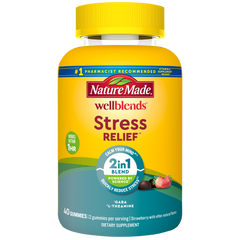
Wellblends™ Stress Relief™ Gummies
BEST SELLER
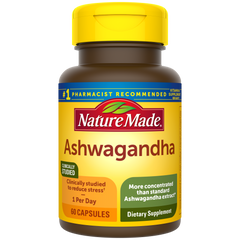
Ashwagandha Capsules
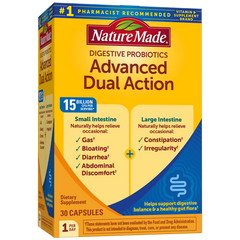
Digestive Probiotics Advanced Dual Action Capsules
Sign Up For More insights From Nature Made
Receive the Latest News and Special Offers
Related Resources
Learn more by exploring helpful, curated content.
- Choosing a selection results in a full page refresh.
We have combined both carts to keep all items.

- Real Estate
- Attractions
Search LaJolla.com
Travel vitamins you don’t want to forget.

Are you yearning to savor the sensational spice markets of Morocco? Perhaps you’re dreaming of traveling to La Jolla for whale watching or beachcombing on our bedazzling shorelines. Then again, maybe you’re planning a business trip to the Big Apple, NY. No matter the destination or purpose of your excursions around the world, there’s nothing like travel to expand the mind and liberate the soul. So, be sure you take full advantage of every opportunity during your travels by packing your bag with the right travel vitamins before you go. This guide on traveling with vitamins and supplements will help ensure you stay happy and healthy while relishing fabulous festivities, flavors, and fun on your journey.
Best Supplements And Immune Support Vitamins for Travel
Whether by boat or by private jet , the very nature of travel poses a whole passel of surprises and unpredictable situations. If you think about it, it’s the unexpected moments that often make travel so exhilarating. However, nothing puts the kibosh on a trip faster than feeling sick, rundown, or off-kilter. That’s why it’s crucial to know what vitamins to take while traveling. Read further about selecting the best immune support supplements and travel vitamins, so you’re prepared to face any quirk or kink on your way.
Travel Supplements To Soothe Stress & Anxiety
While travel offers loads of opportunities for relaxation, the process of getting to your destination can be stressful and overwhelming. Layovers, overbooked flights, hustling, and bustling – even the clamor of a new city or a different environment can provoke anxiety. Moreover, it’s important to pack vitamins to keep your energy high while traveling. Remember, vitamins boost energy levels too. That’s why, in addition to the vitamins listed here, you should think about taking power-packed vitamins to keep your energy levels elevated. Here are a few travel vitamins and supplements that can help ease tension so you can enjoy a stress-free trip.
- B-Complex Vitamins : According to a medical report published by the National Institute of Health, these beauties have been known to reduce stress, suppress anxiety, and thwart depression. B-complex vitamins also help convert food into energy. Less stress and more energy make B-complex one of the best vitamins to take when traveling.
- Kava : For centuries, Pacific Islanders have used kava (also known as kava kava) in ceremonies for its soothing effects. This natural sedative is derived from the kava shrub and contains kavalactones known to take the edge off nerve-racking situations. You can take it as a tea, and it also comes in powder or capsule form to quell stress while traveling.
- Ashwagandha : A native herb of India, ashwagandha has gotten used in ayurvedic medicine for over 6000 years. It is a natural remedy reported to reduce stress and boost moods. This supplement produces a gentle, calming effect that can dispel nervousness or jitters during travel.
- Melatonin : You may be familiar with this supplement, or maybe you’re taking it right now. It’s a safe sleep aid known to induce sleep faster and enhance the quality of slumber. Sometimes sleeping in an unfamiliar environment can rob travelers of a good night’s sleep. Melatonin might be your best solution for getting much-needed z’s while you’re abroad.
Travel Vitamins For Immune System Support
Immune support vitamins are perhaps the number one go-to health aid for travelers. Why? Because the chances of contracting foreign illnesses get markedly increased while traveling. Even domestic travel can weaken your immune system. Therefore, when you’re packing vitamins for travel, consider including some of these immune-boosting aids to safeguard your health.
- Elderberry : A study conducted on international travelers revealed they encountered fewer episodes of illness while taking elderberry supplements and fewer cold-related symptoms. Elderberry comes in a variety of forms, such as powder, capsule, or juice. It is all-natural and can pack a punch when boosting immunity during your trip and can be a fun snack if you skip the capsule and order some elderberry gummy vitamins for your toiletry bag.
- Vitamin C : Almost everybody knows vitamin C helps strengthen immunity. But it also helps reduce stress which is the leading cause for a weakened immune system while traveling. Vitamin C is a tried-and-true friend when it comes to keeping you healthy on your journeys. Many travel-goers claim the best vitamin C for travel comes in effervescent tablets that dissolve in water (such as Emergen-C). However, this essential vitamin also comes in chewables, pills, and even in gummies.
- Vitamin E : You might be familiar with this gem in the form of healing creams or lotions. But ingesting vitamin E pill form can go to battle on your behalf to maintain a healthy immune system. This vitamin is a potent antioxidant and a must-have in your arsenal of travel vitamins.
- Oregano Oil : This is a natural remedy known to combat the risk of many unwanted conditions such as respiratory and fungal infections. It’s an antiviral as well as an anti-inflammatory, and it can be a powerful ally in your mission to fight infections while enjoying your get-away.
Essential Travel Vitamins For Digestive Health
Whether business or pleasure, most folks agree that one of the best aspects of travel is feasting fantastic food. No matter where you go, every culture has a crave-worthy cuisine or beverage that begs you to sample it while you’re touring new destinations. While you may get tempted to tuck into tasty treats, your tummy might not settle with the local fare. So, be sure to pack these travel vitamins for digestive health so you can have your tres leches cake and eat it too!
- Probiotics : These are good bacteria that naturally live in your body. Probiotics are essential to digestive health. Why take a probiotic supplement if these microorganisms already exist in the body? Because stress or altered eating habits such as often experienced in traveling can weaken or reduce probiotic levels. Taking a probiotic can support your bowel health, aid in digestion, and may also prevent unwanted travel discomforts such as constipation or diarrhea.
- Vitamin D : Not only is this vitamin effective in helping the immune system, Vitamin D is also essential to regularity and digestive health. Studies show this vitamin can restore healthy gut bacteria as well as improve metabolism.
- Digestive Enzymes : Certain enzymes play a big role in helping you digest food. In turn, digestive enzymes may help you avoid diarrhea, gas, bloating, or stomaches. Helpful digestive enzymes such as amylase, protease, bromelain, and lipase can be found in common foods like meats and cheeses. However, if you’re on a limited diet, or in a part of the world that doesn’t offer foods rich in these enzymes, a supplement might be a better bet.
Best Travel Vitamins For Energy & Endurance
Rest and relaxation are likely on the agenda during your trip, but you need optimal energy when you’re ready to go exploring. There’s nothing worse than missing out on the fun and excitement if you’re feeling exhausted. Here are a few travel vitamins that can help you attain peak performance so you can take on any adventure.
- Rhodiola Rosea: This is a natural remedy that helps the body handle stress. It is an herb that is used as an adaptogen, which aids in stabilizing mood and energy levels. Unlike many energy drinks or boosters, rhodiola rosea is purported to have little to no side effects such as jitters or jumpiness.
- Iron : This is an essential mineral that promotes growth and stability. Iron also encourages the circulation of oxygen throughout the body. If you or anyone you know struggles with anemia, you may also know that iron is critical in avoiding extreme fatigue. An iron supplement might be just the thing you need to retain and maintain your energy.
- Beetroot Powder : Athletes have known the secret power of beets for a long time because it supplies nitrates to the body which helps improve performance and increases energy in cells. Beetroot powder is a convenient way to get a daily dose of essential nutrients in beets such as fiber, iron, manganese, B9, and vitamin C. All of these vitamins contribute to high levels of vitality so you can keep your energy up on your trip.
Packing Tips For Travel Vitamins
Depending on your travel destination and means of transportation, you may need to follow specific packing instructions. The rules for packing medicine, air travel vitamins, and supplements may vary according to domestic or international flights. Therefore, be sure to check with the Travel Safety Administration (TSA) for regulations on how to pack vitamins for international travel as well as domestic. Read on for helpful tips on how to travel with vitamins on a plane.
- Packaging : Currently, the TSA does not require travel vitamins to be in the original manufacturer’s packaging, so you can store different supplements in one container to last you the duration of your trip. Solid vitamins, including gummies and gel caps, do not need to be contained in a baggie. However, liquid vitamins and supplements need to be enclosed in an airtight quart-sized baggie.
- Convenience and Safety : You can pack your travel vitamins in your check-in luggage, but for convenience’s sake, you may want to tuck them in your carry on bags. This makes for easier access to your supplements. Plus, you avoid losing your vitamins if your check-in luggage gets lost or stolen. Additionally, check-in luggage may be subjected to harsh temperatures during a flight. Such a drastic change in temperature may damage the integrity of certain travel vitamins. So, your best bet is to bring your supplements with you on the plane. If you’re concerned about taking up precious space in your carry on, then consider getting travel size vitamins for your trip.
Pack Smart, Feel Great and Enjoy Your Travel Adventures
Travel isn’t always rainbows, unicorns, and happy times. There are occasions when getting to your destination can wreak havoc on your nerves, digestion, or energy. However, when you’re armed with the best vitamins to take when traveling, your chances for better journeys are greatly enhanced. So whether you’re trekking the Andes or flying to the Golden State on business, don’t forget to pack your travel vitamins for smooth sailing all the way.
Related Articles

Copyright © LaJolla.com 2022. All rights reserved.
Reviews & Articles
- Product Reviews (A-Z)
- Health Conditions
- Clinical Updates
- Recommended Intakes & Limits
- Avoid Counterfeits
Membership & Subscription
- Join Now & Get Full Access
- Member Sign In
- Group Subscriptions
- Give a Gift
- Member Support
- Join Free Newsletter
About ConsumerLab.com
- Meet Our Team
- Testimonials
About Testing
- Testing Programs
- Quality Certification Program & List
- How Products Were Tested
- ConsumerLab Seal
- News Releases
- ConsumerLab In The News
- ConsumerLab Annual Survey
- Privacy Policy
- / CL Answers
- / Which supplements are helpful to have when traveling? Any tips on how to best store supplements on trips?
www.consumerlab.com/answers/which-supplements-are-helpful-to-have-when-traveling-and-how-should-they-be-stored/supplements-travel-tips/
Save to favorites
This feature is restricted to active members.
Join now to save favorites and get all member benefits, including over 1,400 reviews.
Already a member? Sign in here .
Our Members Asked:
Which supplements are helpful to have when traveling any tips on how to best store supplements on trips.
Several supplements may be helpful when traveling (see the "What to Consider When Using" section in Product Reviews of specific supplements you may be planning on taking with you during a trip, for more detailed information about the best way to store your supplements.) If you need a little help falling asleep, melatonin can be used and it may help you avoid jet lag after a long flight. Keeping a few nutrition or meal replacement bars in your travel bag or purse may come in handy in case you experience unexpected transportation delays, or an outing takes longer than expected. There is some evidence that ginger may be helpful if you are prone to motion sickness. If you will be trying new foods (or just eating out more often) during your trip, you may want to consider bringing along supplements that may help with indigestion or heartburn , such as digestive enzymes and lactase supplements . Taking certain probiotics several days before and during your trip may reduce the likelihood of developing traveler's diarrhea. Probiotics may also offer some protection against colds and respiratory infections. If you do develop a cold, zinc lozenges may help to reduce the severity and/or duration of symptoms. (If you develop a cold while taking vitamin C , it may modestly reduce symptom severity and duration, but starting vitamin C supplementation after symptoms have already begun may not be helpful.) Storage and Travel Keep in mind when traveling that certain supplements, including some probiotics, fish oil and protein powders, are particularly sensitive to heat and moisture and should be packed and stored accordingly . Do not leave them in your car, and, when flying, keep them in your carry-on luggage rather than checking them with baggage since bags may sit out on the tarmac or in other environments which are not temperature controlled. (Remember, however, that liquid supplements in amounts greater than 3.4 ounces (100 mL), must be stored in checked luggage and cannot be kept in carry-on luggage.) Although not required by the TSA , it may be helpful to keep your supplements in their original containers so they can be easily identified by security, especially if you are traveling abroad. In general, traveling in or out of the U.S. with supplements is permitted by the FDA as long as amounts are considered reasonable for personal use. Radiation from airport security scanners is not likely to affect the quality or safety of vitamins and supplements. According to the FDA , "There are no known adverse effects from eating food, drinking beverages, using medicine, or applying cosmetics that have been irradiated by a cabinet x ray system used for security screening." A typical dose of radiation received by objects going through these systems is significantly lower than those used to irradiate food, and one study of medications such as acetaminophen found no change in drug content or quality after exposure to higher levels of radiation than used in typical scanners ( Uehara, Drug Dev Ind Pharm 2015 ). Nevertheless, you may request that medications (and likely, supplements as well) be screened visually rather than by X-ray if you prefer. If you have some favorite travel supplements or related tips, share them in the Comments section below!
Join today to unlock all member benefits including full access to all CL Answers and over 1,400 reviews.
Already a member? Sign In Here.
Join now at www.consumerlab.com/join/
Submit your comment
Join now to add comments and get all member benefits, including over 1,400 reviews.
Agree to Comment Terms
Please abide by the following:.
- If you make a statement of fact, such as whether a type of treatment does or does not work, state your basis -- such as personal experience or a published study.
- If you make a positive or negative comment about a product, note whether or not you have a financial interest in the product or in a competing product.
- Please be respectful in your tone.
- Please do not submit any type of HTML markup or scripting as it will not be accepted, nor will posts that exceed 2,500 characters.
For your privacy, only your first name (from your account) followed by a random number will appear with your comment. Your last name and email address will not be displayed.
Your comment has been submitted
We will review your comment before it is posted., join our free newsletter and become a member to view the full review , become a member to view the latest update: in our review.
* We do not sell or share your personal information with anyone else, ever.
Recent CL Answers
- Which supplements are important after bariatric surgery (i.e., weight loss or stomach-reducing surgery)? Are there any I should avoid?
- Do any supplements help with fatty liver disease? Are some diets more beneficial than others?
- What is C15:0 fatty acid (found in fatty15), and does it have health benefits?
Join over 90,000 Members
Find the best products with instant access to our latest tests & reviews of over 1,400 health products .
Save money by finding high-quality products at lower cost.
Stay safe with the latest clinical findings, warnings, and expert answers .
Suggest products to test .
Stay informed with our e-newsletter .
Ratings of ConsumerLab
Join our free newsletter and become a member to view the full answer to which supplements are helpful to have when traveling any tips on how to best store supplements on trips.
The "Updated" date indicates when new information was most recently added to this article. In the full article, the newest information is highlighted in yellow.
Join over 250,000 people on our weekly email list.
Featured in.

OUR MISSION: To identify the best quality health and nutritional products through independent testing.
Product reviews.
- By Supplement Type
- By Health Condition
- Quality Certification Program
- CL Certified Products
- ConsumerLab Answers
- Recalls & Warnings
- Recommended Intakes
- Join ConsumerLab
- In The News
ConsumerLab.com
- ConsumerLab Survey
© 2024 ConsumerLab.com, LLC. All rights reserved. ConsumerLab.com name and flask logo are both registered trademarks of ConsumerLab.com, LLC. This site is intended for informational purposes only and not to provide medical advice.
Winter is here! Check out the winter wonderlands at these 5 amazing winter destinations in Montana
- Travel Tips
How To Find The Best Vitamins For Your Travel Routine
Published: October 11, 2023
Modified: December 28, 2023
by Ermentrude Slaton
- Plan Your Trip
- Travel Essentials & Accessories
Introduction
When it comes to travel, planning your itinerary and packing your essentials are often at the top of your to-do list. However, amidst the excitement and anticipation, it’s important not to overlook your health and well-being. One aspect that is often neglected during travel planning is ensuring you have the right vitamins to support your body’s needs.
Vitamins play a crucial role in our overall health, providing essential nutrients that our bodies need to function optimally. When we travel, our routines and environments change, which can have an impact on our nutritional intake. Lack of sleep, exposure to different foods, and increased physical activity can all put a strain on our bodies, making it even more important to prioritize our vitamin intake.
By carefully selecting the right vitamins for your travel routine, you can support your immune system, maintain energy levels, reduce the risk of illness, and promote overall well-being. In this comprehensive guide, we will help you understand the importance of vitamins for travel and provide valuable tips for choosing the best supplements to meet your unique needs. Whether you’re an avid adventurer, a frequent business traveler, or simply embarking on a much-needed vacation, this article will equip you with the knowledge to make informed decisions about your vitamin regimen during your travels.
Before diving into the specifics of choosing and incorporating vitamins into your travel routine, let’s explore the importance of understanding your body’s nutritional needs and how they might be affected by travel.
Understanding the Importance of Vitamins for Travel
Traveling can be an exciting and enriching experience, but it can also put a strain on our bodies. Changes in diet, sleep patterns, and exposure to new environments can impact our overall health and well-being. This is where vitamins play a vital role. By providing essential nutrients, vitamins help support our immune systems, energy levels, and overall vitality.
One of the key benefits of vitamins during travel is their ability to boost our immune systems. When we travel, we often come into contact with new environments and people, which increases our risk of exposure to germs and illness. A strong immune system can help ward off common travel ailments such as colds, flu, and digestive issues.
Vitamins also help combat the fatigue and exhaustion that can accompany travel. Whether it’s long flights, jet lag, or intense sightseeing, our bodies can become drained of energy. Certain vitamins, such as B vitamins and vitamin C, are known to support energy metabolism and help reduce fatigue, allowing us to make the most of our adventures.
Furthermore, traveling often means trying new and unfamiliar foods. While this can be exciting for our taste buds, it can also result in a temporary imbalance in our nutritional intake. Vitamins and supplements can help fill these dietary gaps and ensure we’re getting the nutrients we need to stay healthy during our travels.
It’s also worth noting that stressful situations, such as delayed flights, crowded airports, and unfamiliar surroundings, can negatively impact our bodies. Stress has been known to deplete essential vitamins and minerals, making supplementation even more important during periods of travel-related stress.
Overall, taking vitamins during travel is a proactive step towards supporting our bodies and maintaining optimal health. By providing the necessary nutrients and supporting key bodily functions, vitamins can help us stay energized, boost our immune systems, and promote overall well-being throughout our travels.
Factors to Consider When Choosing Vitamins for Your Travel Routine
Now that we understand the importance of vitamins for travel, it’s time to dive into the factors to consider when selecting the right supplements for your travel routine. With a wide array of options available, it can be overwhelming to determine which vitamins are best suited for your specific needs. Here are some key factors to keep in mind:
- Your specific dietary requirements: Consider any dietary restrictions or allergies you may have. For example, if you follow a vegan or vegetarian diet, you might need to ensure you’re getting enough vitamin B12, as it is commonly found in animal products.
- Your destination: Different travel destinations may pose different health risks or require specific vitamin considerations. For instance, if you’re traveling to a sunny destination, ensuring adequate vitamin D intake may be important, as this nutrient is primarily synthesized in the skin through exposure to sunlight.
- Your travel duration: The length of your trip can also impact your vitamin needs. For shorter trips, a basic multivitamin may suffice. However, for longer journeys, you may want to consider additional supplements, such as those targeting immune support or energy levels.
- Your planned activities: Consider the activities you have planned during your travels. If you’re embarking on a physically demanding adventure like hiking or trekking, you may benefit from supplements that support joint health and muscle recovery.
- Your pre-existing health conditions: If you have any pre-existing health conditions, it’s important to consult with your healthcare professional before starting a new supplement regimen. They can provide personalized advice and ensure the supplements you choose will not interfere with any medications or treatments you may be undergoing.
It’s also worth mentioning that certain vitamins and minerals work synergistically with each other. For example, vitamin C enhances iron absorption, while vitamin D aids in calcium absorption. Keep in mind these interactions when selecting your supplements to maximize their efficacy.
Lastly, ensure that the vitamins you choose are of high quality and from reputable brands. Look for certifications such as GMP (Good Manufacturing Practices) and third-party testing to ensure the supplements meet quality standards.
By considering these factors and taking a personalized approach to selecting your travel vitamins, you can ensure that you are providing your body with the necessary nutrients to support your health and well-being during your travel adventures.
Evaluating Your Travel Needs
Before diving into the world of vitamins and supplements, it’s important to evaluate your specific travel needs. This involves considering factors such as your destination, planned activities, and potential health risks. By understanding your unique travel circumstances, you can better determine which vitamins will be most beneficial for your journey. Here are some key aspects to evaluate:
- Climate and environmental conditions: Take into account the climate and environmental factors of your travel destination. Are you traveling to a tropical location with intense sunlight? Will you be exposed to high altitudes or extreme temperatures? These factors can influence your vitamin requirements. For example, if you’ll be spending ample time in the sun, you may need to prioritize vitamins that support skin health and protect against UV damage, such as vitamin E and antioxidants.
- Travel duration: Consider the length of your trip. If you’re going on a short getaway, a basic multivitamin or a specific vitamin targeted toward immune support may suffice. However, for longer journeys, it may be beneficial to opt for a more comprehensive vitamin regimen to address potential nutrient deficiencies that can arise over time.
- Planned activities: The activities you have planned can also influence your vitamin needs. If you’ll be engaging in physically demanding activities such as hiking, trekking, or water sports, you may benefit from vitamins that support joint health and muscle recovery, such as glucosamine or omega-3 fatty acids. On the other hand, if your travel involves long periods of sitting, such as during flights or road trips, vitamins that promote circulation and prevent blood clots might be more relevant.
- Potential health risks: Research potential health risks associated with your travel destination. Are there any prevalent diseases or infections you need to be mindful of? For example, if you’re traveling to an area known for malaria, you may need to consider anti-malarial supplements. If you’ll be exposed to mosquito-borne diseases, such as dengue fever or Zika virus, supplements that boost your immune system, such as vitamin C and Zinc, can be beneficial.
- Your personal health status: Take into account your current health status and any pre-existing conditions you may have. If you have certain conditions or are on specific medications, consult with your healthcare provider to determine if there are any specific vitamins or supplements to consider or avoid.
By carefully evaluating your travel needs, you can identify the potential areas where your body may need additional support. This will help you make informed decisions when selecting the vitamins and supplements to incorporate into your travel routine.
Researching and Selecting the Right Vitamins
With a multitude of options available in the market, researching and selecting the right vitamins can seem like a daunting task. However, with a systematic approach, you can find supplements that align with your travel needs and support your overall health. Here are some steps to help you in the process:
- Do your research: Begin by conducting thorough research on the vitamins and supplements that are commonly recommended for travel. Understand their benefits, potential side effects, and recommended dosages. Utilize reputable sources such as health websites, scientific studies, and consult with healthcare professionals.
- Consider a multivitamin: Starting with a multivitamin can be a good option for overall nutritional support during travel. Multivitamins typically contain a combination of essential vitamins and minerals to fill any potential nutrient gaps.
- Focus on key vitamins for travel: Pay attention to vitamins that play a crucial role in supporting your immune system, energy levels, and stress management during travel. Vitamin C, vitamin D, B vitamins, and antioxidants are often recommended for these purposes.
- Target specific health concerns: If you have specific health concerns or conditions, look for supplements that address those needs. For example, if you have digestive issues, you may consider probiotics to support gut health. If you are prone to motion sickness, ginger supplements may help alleviate symptoms.
- Look for quality and reputable brands: Choose vitamins and supplements from trustworthy brands that adhere to good manufacturing practices (GMP) and undergo third-party testing for potency and purity. Read customer reviews and seek recommendations from trusted sources.
- Consider travel-friendly formats: Opt for vitamins that come in travel-friendly formats such as capsules, tablets, or single-serving packets to make them easy to pack and consume on the go.
- Consult with healthcare professionals: As always, it is important to consult with healthcare professionals, particularly if you have underlying health conditions, are on medications, or are pregnant or breastfeeding. They can provide personalized advice based on your individual needs and help you determine the right vitamins for your travel routine.
Remember that everyone’s nutritional needs are different, and what works for one person may not work for another. Listen to your body, pay attention to any changes or reactions, and make adjustments as needed. Trusting the guidance of healthcare professionals is key to ensuring that you select the right vitamins that will support your health and well-being during your travels.
Incorporating Vitamins into Your Travel Routine
Once you’ve selected the right vitamins for your travel needs, it’s important to effectively incorporate them into your travel routine to ensure you receive their full benefits. Here are some tips to help you seamlessly integrate vitamins into your travels:
- Establish a routine: Incorporate taking your vitamins into your daily travel routine. Choose a specific time of day and create a reminder system to ensure you don’t forget. This could be setting an alarm on your phone or placing your vitamin bottles in a visible location in your luggage.
- Organize your vitamins: Use pill organizers or travel-sized containers to keep your vitamins organized and easily accessible during your trip. This will prevent any confusion and make it easier to pack and carry them with you.
- Follow recommended dosages: Stick to the recommended dosages provided on the supplement packaging or as advised by your healthcare professional. Avoid exceeding the recommended dosage, as this can lead to potential side effects.
- Pair vitamins with meals: Some vitamins are better absorbed when taken with food, so try to take them alongside your meals. This can also help you remember to take them consistently.
- Consider portable options: If you’re on the go or traveling light, consider portable options such as gummy vitamins or single-serving packets of powdered supplements. These can be more convenient and easier to pack, ensuring that you don’t miss a dose.
- Plan for re-stocking: If you’ll be traveling for an extended period, plan ahead and bring extra vitamins to avoid running out. Research local pharmacies or supplement stores at your destination in case you need to restock while traveling.
- Store vitamins properly: Keep your vitamins in a cool, dry place to maintain their potency. Avoid exposing them to excessive heat or moisture, as this can degrade the quality of the supplements. Use a pill case or small resealable bag to keep them secure and protected during travel.
- Set realistic expectations: While vitamins can provide valuable support, they are not a substitute for a balanced diet and healthy lifestyle. Continue to prioritize a well-rounded diet, exercise regularly, stay hydrated, and get adequate sleep during your travels.
Remember, consistency is key when it comes to incorporating vitamins into your travel routine. Stick to your schedule, take them as recommended, and make it a habit. By doing so, you’ll ensure that you’re receiving the benefits of the vitamins and supporting your health throughout your journey.
Tips for Storing and Traveling with Vitamins
When traveling with vitamins, proper storage and transport are essential to ensure their efficacy and prevent any damage. Here are some tips to help you store and travel with your vitamins safely:
- Use a sturdy container: Invest in a durable pill case or small container specifically designed for storing vitamins. Look for one with compartments to keep different supplements organized and prevent them from rolling around or getting crushed during travel.
- Keep labels intact: Make sure to keep the original labels on your vitamin bottles or packaging. This will provide important information such as the name of the supplement, dosage instructions, and expiration dates.
- Avoid extreme temperatures: High temperatures can degrade the quality and potency of vitamins. Keep them away from direct sunlight, and avoid leaving them in hot cars or luggage. If needed, use a small insulated cooler bag to protect them from excessive heat.
- Bring extra quantities: Pack enough vitamins to last you for the duration of your trip, plus a few extra days in case of unexpected delays or longer stays. This will ensure you don’t run out and disrupt your supplement routine.
- Separate vitamins from liquids: To prevent any leakage or spillage, keep your liquid vitamins separate from other items in your luggage. Seal them in a ziplock bag or use leak-proof travel containers specifically designed for liquids.
- Check transportation regulations: If you’re traveling by air or crossing international borders, familiarize yourself with the transportation regulations regarding carrying vitamins. Different countries may have specific guidelines, particularly for herbal supplements or prescription-based vitamins.
- Bring a copy of prescriptions: If you’re carrying prescription vitamins or supplements, it’s a good idea to have a copy of the prescription or a letter from your healthcare provider. This can help navigate any potential issues during airport security checks or customs inspections.
- Carry them in your carry-on luggage: To ensure easy access and prevent loss, always carry your vitamins in your carry-on bag rather than checked luggage. This way, they will be readily available during travel and less prone to damage or loss.
- Consult with your healthcare provider: Before traveling, consult with your healthcare provider to ensure the vitamins you’re taking are safe and appropriate for your specific travel plans. They can offer valuable advice on storage, potential interactions with other medications, and any specific precautions you should take.
By following these tips, you can protect the integrity of your vitamins and ensure they remain effective throughout your travels. Remember that proper storage and transport not only maintain the quality of the supplements but also help facilitate a seamless travel experience.
Incorporating the right vitamins into your travel routine is a proactive way to support your health and well-being during your adventures. By understanding the importance of vitamins for travel and carefully selecting supplements that align with your specific needs, you can optimize your travel experience and prevent potential health issues.
Consider factors such as your dietary requirements, travel destination, duration, planned activities, and health conditions when choosing the right vitamins for your travel routine. Remember to do thorough research, consult with healthcare professionals, and opt for reputable brands to ensure the quality and efficacy of the supplements you choose.
Once you’ve selected the right vitamins, establish a routine, organize your supplements, and follow recommended dosages. Incorporate them into your daily travel routine, pair them with meals when appropriate, and prioritize consistency. Additionally, store and transport your vitamins properly, away from extreme temperatures, and bring extra quantities to avoid running out.
While vitamins are beneficial, they are not a substitute for a balanced diet and a healthy lifestyle. Therefore, continue to prioritize nutritious meals, regular exercise, proper hydration, and sufficient sleep during your travels.
By integrating vitamins into your travel routine and nourishing your body with essential nutrients, you can support your immune system, maintain energy levels, and enhance your overall well-being. Remember, the key to a successful travel experience is taking care of yourself, and vitamins can be an invaluable tool in achieving that goal.

- Privacy Overview
- Strictly Necessary Cookies
This website uses cookies so that we can provide you with the best user experience possible. Cookie information is stored in your browser and performs functions such as recognising you when you return to our website and helping our team to understand which sections of the website you find most interesting and useful.
Strictly Necessary Cookie should be enabled at all times so that we can save your preferences for cookie settings.
If you disable this cookie, we will not be able to save your preferences. This means that every time you visit this website you will need to enable or disable cookies again.
- Vitamin Pack
- Vitamin Bottles
Health Goal
- Multivitamins
- Probiotic Blend
- Ashwagandha
- Astaxanthin

Meet Youest You

Our app, fully revamped
Check it out.
- Sustainability
We've got answers
- Vitamin Bottles New
- Take the quiz
Yes, You Can Bring Vitamins on a Plane: The TSA, Tips, and More
On this page.

It can be confusing to figure out how to travel with your vitamins. Fortunately, there are some simple steps you can take.
We all have to travel sometimes. Whether it’s for a planned family getaway or for a business trip, traveling can be a real source of joy. But our health care routines don’t stop just because we’re spending time away from home. To get the most out of traveling, it’s important to figure out the best ways to bring our vitamins and supplements along with us.
Why it's important to bring vitamins while traveling
Your vitamin routine is an important part of your health. Vitamins help your health in many ways, supplying your body with necessary nutrients and even making up for vitamin deficiencies. Taking your vitamins is also important for supporting your immune system. Keeping your immunity up and staying healthy while traveling is a good way to make sure you get the most out of your trip.
TSA rules on traveling with vitamins
The Transportation Security Administration (TSA) is a government agency that sets the rules for the transportation systems in the United States. They have some rules for how you can transport your vitamins.
Any medications in pill or solid form – vitamins qualify under this definition – must go through security screening. The TSA also recommends that any medication be clearly labeled, since this will help accelerate the screening. When it comes to prescription medication labels, some states have different requirements. Be sure to check the laws that apply to the state you’re heading to. Powdered supplements should be placed in your checked back if you’re bringing more than 12 oz; otherwise it may need to go in its own bin during X-ray screening.
If you’re traveling with medically necessary liquid medication, you must inform your TSA officer and then separate the medication from your other belongings before the screening begins. You must also declare accessories associated with your liquid medication – IV bags, freezer packs, pumps, and so on. Clearly label these items, too. That said, liquid vitamins would likely not qualify as “medically necessary” medication. (More on traveling with liquid vitamins below.)
Keep in mind that you are fully responsible for displaying, handling, and repacking your medication when screening is required.
Can you take vitamins in your carry-on or personal item?
Yes, you can take vitamins in your carry-on and personal item luggage . While not required, it can help the screening process to have your vitamins clearly labeled or in their original containers.
Liquid vitamins and supplements do still have volume limits of 3.4 oz, or 100 mL, just lke all carry-on liquids. It’s important to remember that the TSA website does note that all final decisions are up to the discretion of the TSA checkpoint officer.
Checked luggage regulations for vitamins
Liquid vitamins can be packed in your checked luggage and are not subject to the 3.4 oz requirement for carry-ons.
TSA's stance on powdered vitamins
There are no restrictions on powders when flying between U.S. airports. Just note that powders over 12 oz, or 350 mL, must be placed in a separate bin during the screening process and may require additional screening or need to be opened. To make things easier, place larger volumes of powders over 12 oz in your checked bag to skip additional screening.
TSA's regulations on herbal supplements
Herbal supplements that are capsules, powdered, or tablets have no restrictions. Liquid herbal supplements must follow the liquid restrictions and be limited to 3.4 oz, or 100 mL, for carry-on and personal item luggage.
Checked luggage does not have any restrictions for herbal supplements in any form.
Do you need any special documentation or prescription to carry vitamins on a plane?
The TSA does not require any special documentation, prescription, or doctor’s note for you to carry vitamins on a plane. But if you want extra support to create a smoother travel process, you can consider doing any of the following, which may simplify the screening process:
- Make sure all products are in clearly labeled bottles, or keep them in their original bottle.
- Carry a letter from your healthcare provider, on official letterhead, stating your medical need for the vitamins or supplements.
- Have a backup plan for if your items are confiscated from TSA for an unforeseeable reason. For example, know where you can purchase more at your destination.
- Split your vitamins between your carry-on and checked baggage. In unlikely circumstances, this gives you more options if your carry-on vitamins are confiscated or if your checked luggage is misplaced.
Do vitamins have to be in original bottles when flying?
The short answer: no. However, keeping vitamins in their original bottles when flying can help reduce questions and potential complications during the screening process. The great thing about Care/of’s personalized vitamin packs is that they are unopened and clearly labeled as Care/of products and therefore may reduce hassle during TSA screening.
Will the TSA open your vitamins?
Typically, TSA will not open your vitamin packages. You are not required to declare or notify TSA of your vitamins in your luggage. The only exceptions are with liquid supplements or powders over 12 oz (350 mL), the latter of which you need to place in a separate bin during the X-ray screening process. All decisions are ultimately up to TSA checkpoint agent.
5 Tips for traveling with vitamins
Liquid vitamins.
Per TSA regulations, liquid supplements can only be transported below a certain amount: 3.4 oz or 100 mL. You may want to consider leaving liquid vitamins at home. They may not be worth the hassle. You can opt for capsule or pill form of these supplements while you are traveling. If you do pack liquids, be sure to put them in a plastic bag; that way, if they spill, they won’t get all over your belongings.
Look for vitamins that come in tablets, capsules and soft gels
You’re allowed to travel with vitamins in tablet, capsule, and soft gel form, per TSA regulations. Soft gels are not considered liquids.
Pack vitamins in carry-on bag
If possible, you may want to find a way to pack your vitamins in a carry-on bag. That way, you have easy access to your vitamins, and you’re not at risk of being without them in the event that your checked luggage is lost or delayed. Another good rule of thumb is to pack a few extra of each supplement, in case you end up traveling a little longer than you originally thought you would.
Care/of’s daily pill packs make it easy to travel with your supplements. Pack enough packs for each day of your trip, plus an extra one or two just in case!
Have a pouch or pill case to store vitamins
Having a pouch or pill case to store your vitamins can also make them easier to transport. Perhaps you’ll want to invest in a container for the amount of days you will be away. Some containers are even labeled by time of day or by days of the week, helping you stay consistent with your vitamin routine. If your supplements need to stay cold, you can travel with a frozen gel ice pack. Just know that the gel ice pack must be frozen or partially frozen at the time of TSA screening, or else it will be considered a liquid and subject to liquid volume restrictions.
How you pack your vitamins is up to you. When dealing with Care/of personalized supplement packs, though, everything is pre-packed for you. You just grab and go!
International travel considerations
When traveling back to the U.S. from an international location, TSA states that powders over 12 oz, or 350 mL, stored in carry-on luggage may require additional screening at the TSA checkpoint, which is similar to travel within the U.S. as well. If the officer cannot resolve the questions about the powder, it may be disposed of. TSA recommends putting powders in your checked bag for best chances.
For travel regulations when flying out of international airports, best practice is to check that the travel regulations of that particular airport or country.
Final takeaways
The work of staying healthy doesn’t stop just because you’re traveling! Fortunately, there are ways to safely and easily bring your vitamins along with you. Buy a nice travel pack and stay up-to-date on the TSA guidelines. When possible, try to bring your vitamins as part of a carry-on item.
You're unique. Your supplements should be too.
You may also like, explore some of our other articles, how does melatonin work in the body a simple guide, do gummy vitamins work as well as regular vitamins how to choose, what are the top science-backed ways to increase iron absorption, what happens to your body when you start taking vitamins the science made simple, feel your best at every age: the best vitamins for women in their 30s, 40s, and 50s, the best vitamins and supplements for vegetarians: a simple guide, looking to gain some weight in 2024 these 10 supplements may help, 17 min read, are you getting enough vitamin d in 2024 how much to take, can supplements really help detoxify your body fact vs. fiction, 12 min read, want to take gut health supplements consider these six factors.

You are using an outdated browser. Upgrade your browser today or install Google Chrome Frame to better experience this site.
- Section 2 - LGBTQ+ Travelers
- Section 2 - Prioritizing Care for Resource-Limited Travelers
Complementary & Integrative Health Approaches to Travel Wellness
Cdc yellow book 2024.
Author(s): David Shurtleff, Kathleen Meister, Shawn Stout
Travelers often ask their health care providers about the use of complementary or integrative health approaches for travel-related illnesses and conditions. Claims made about dietary supplements, herbal products (see Box 2-15 ), and other complementary approaches for travel-related health problems may not be supported by evidence. Be prepared to discuss what is known about the reported benefits of complementary and integrative health approaches and to counsel travelers on their possible side effects or interactions with prescribed vaccines or medications.
Box 2-15 Dietary supplements & unproven therapies
Unproven therapies are discussed in this chapter only for educational purposes and are not recommended for use. The Centers for Disease Control and Prevention only endorses therapies approved by the US Food and Drug Administration (FDA).
FDA regulates dietary supplements, but the regulations are generally less strict than those for prescription or over-the-counter drugs. Learn more .
Clinicians and travelers should consult the FDA’s safety advisories to learn the latest regarding product recalls and safety alerts .
Two major safety concerns about dietary supplements are potential drug interactions and product contamination. Analyses of supplements sometimes find differences between labeled and actual ingredients. For example, products marketed as dietary supplements have been found to contain illegal hidden ingredients, such as prescription drugs.
Claims Versus Science
Altitude illness.
Many natural products, including coca leaf, garlic, Ginkgo biloba , and vitamin E, have been promoted for preventing or treating altitude illness. For more information on altitude illness, see Sec. 4, Ch. 5, High Elevation Travel & Altitude Illness .
Coca leaf, chewed or made into tea, has been used for altitude illness, but no strong evidence has shown that it works or that it has adverse effects. Travelers should be aware that using coca leaf will cause a positive drug test result for cocaine metabolites.
No evidence supports claims that garlic helps reduce altitude illness. Garlic supplements appear safe for most adults. Possible side effects include breath and body odor, heartburn, and upset stomach. Some people have allergic reactions to garlic. Short-term use of most commercially available garlic supplements poses only a limited risk for drug interactions.
Ginkgo Biloba
Studies of Ginkgo biloba for preventing altitude illness are inadequate to justify recommendations about its use. Products made from standardized ginkgo leaf extracts appear to be safe when used as directed. However, ginkgo can increase the risk of bleeding in some people and interact with anticoagulants. In addition, studies by the National Toxicology Program showed that rodents developed liver and thyroid tumors after being given a ginkgo extract for up to 2 years.
One study investigated vitamin E, in combination with other antioxidants, for altitude illness; no significant benefit was observed.
Colds & Flu
Although colds and flu are not uniquely travel-related hazards, many people try to avoid these illnesses during a trip. Complementary health approaches that have been advocated for preventing or treating colds or influenza include echinacea, garlic and other herbs, nasal saline irrigation, probiotics, vitamin C, zinc products, and others.
Numerous studies have tested the herb echinacea to see whether it can prevent colds or relieve cold symptoms. A 2014 systematic review concluded that echinacea has not been convincingly shown to be effective; however, a weak effect was not ruled out.
Garlic & Other Herbs
No strong evidence supports claims that garlic, Chinese herbs, oil of oregano, or eucalyptus essential oil prevent or treat colds, or that the homeopathic product Oscillococcinum prevents or treats influenza or influenza-like illness.
Nasal Saline Irrigation
Nasal saline irrigation (e.g., use of neti pots), can be useful and safe for chronic sinusitis. Nasal saline irrigation also can help relieve the symptoms of acute upper respiratory tract infections, but the evidence is not definitive. Even in places where tap water is safe to drink, people should use only sterile, distilled, boiled-then-cooled, or specially filtered water for nasal irrigation to avoid the risk of introducing waterborne pathogens.
Probiotics might reduce susceptibility to colds or other upper respiratory tract infections and the duration of the illnesses, but the quality of the evidence is low or very low.
Taking vitamin C supplements regularly reduces the risk of catching a cold among people who perform intense physical exercise, but not in the general population. Taking vitamin C on a regular basis might lead to shorter-duration colds, but taking it only after cold symptoms appear does not. Vitamin C supplements appear to be safe, even at high doses.
Zinc taken orally, often in the form of lozenges, within 24 hours of symptom onset might reduce the duration of a cold. No firm recommendation currently can be made, however, regarding prophylactic zinc supplementation because of insufficient data. When taken in large doses, side effects from zinc can include nausea and diarrhea, copper deficiency, and decreased absorption of some medications. Intranasal use of zinc can cause anosmia (loss of sense of smell), which can be long-lasting or permanent.
Coronavirus Disease 2019
A variety of dietary supplements, including elderberry, melatonin, colloidal silver, vitamin C, vitamin D, and zinc have each been suggested to prevent or treat coronavirus disease 2019 (COVID-19). Except for colloidal silver (for which no plausible mechanism of action exists), the listed supplements have theoretical applications in preventing or treating COVID-19; evidence of efficacy from clinical trials is limited, however, and without clear demonstration of benefit. In addition, use of colloidal silver and zinc carries health and safety concerns. Colloidal silver (and other silver products) can cause argyria, a permanent blue-gray discoloration of the skin and other organs. High-dose supplementation with zinc can cause nausea and diarrhea, copper deficiency, and decreased absorption of some medications. The National Institutes of Health (NIH) COVID-19 Treatment Guidelines recommend against supplementation with zinc above the recommended dietary allowance because of these risks and the lack of evidence of clinical benefit.
The NIH COVID-19 Treatment Guidelines provide up-to-date guidance on dietary supplements and COVID-19 for health care providers and travelers. For additional information on COVID-19 prevention and treatment, see Sec. 5, Part 2, Ch. 3, COVID-19 .
Homeopathic Vaccines
Proponents of homeopathy claim that products called nosodes, or homeopathic vaccines, are effective substitutes for conventional immunizations. No credible scientific evidence or plausible scientific rationale supports these claims. For more information on travel vaccines, see Sec. 2, Ch. 3, Vaccination & Immunoprophylaxis—General Principles .
Insect Repellents
Many products are promoted as “natural” insect repellents, and their use can appeal to people who prefer not to use synthetic products. Products promoted as natural mosquito repellents include citronella products, neem oil (a component of agricultural insecticide products promoted on some websites for home use), and oil of lemon eucalyptus (OLE). Essential oils and other natural products are promoted to repel bed bugs. Travelers should use only Environmental Protection Agency (EPA)–registered insect repellents; more information is available at the EPA website .
Laboratory-based studies found that botanicals, including citronella products, worked for shorter periods than products containing DEET (N,N-diethyl-m-toluamide or N,N-diethyl-3-methyl-benzamide). For people who choose to use botanicals, the Centers for Disease Control and Prevention (CDC) recommends EPA-registered products containing OLE (oil of lemon eucalyptus). Limited evidence suggests that neem oil could be beneficial as a natural repellent. For more information on insect repellents, see Sec. 4, Ch. 6, Mosquitoes, Ticks & Other Arthropods ).
Bed Bug Repellents
No evidence supports effectiveness of natural products marketed to repel bed bugs. Instead, encourage travelers to follow steps to detect and avoid bed bugs (e.g., inspecting mattresses, keeping their luggage off the floor or bed). More information is available at CDC’s Parasites website and in Section 4, Box 4-10 , Recommended protective measures to avoid or reduce bed bug exposure.
Jet Lag & Sleep Problems
Complementary approaches suggested for jet lag or other sleep problems include aromatherapy and herbs (e.g., chamomile, kava, valerian); the dietary supplement melatonin; and relaxation techniques. See Sec. 8, Ch. 4, Jet Lag , for more information.
Aromatherapy
Very little evidence supports the belief that aromatherapy or the herbs chamomile or valerian help with insomnia. Major side effects are uncommon, but chamomile can cause allergic reactions. Another herb, kava, also is promoted for sleep, but good research on its effectiveness is lacking. More importantly, kava supplements have been linked to a risk of severe liver damage.
Some evidence suggests that melatonin supplements can help with sleep problems caused by jet lag in people traveling either east or west. Melatonin is sold as a dietary supplement; dietary supplements are less strictly regulated than drugs. The amounts of ingredients in dietary supplements can vary, and product contamination is a potential concern. A 2017 analysis of melatonin supplements sold in Canada found that their actual melatonin content ranged from <83% to >478% of the labeled content and that substantial lot-to-lot variation was evident. Also, 26% of products contained serotonin as a contaminant. Melatonin supplements appear to be safe for most people who use them for discrete periods of time; an absence of studies examining the effects associated with continued use makes it challenging to know with certainty its long-term safety and tolerability. In a 2019 systematic review of mostly short-term trials of melatonin for sleep problems, the most frequently reported adverse events were daytime sleepiness (1.66%), dizziness (0.74%), headache (0.74%), other sleep-related adverse events (0.74%), and hypothermia (0.62%). Almost all adverse events were considered mild–moderate in severity and tended to resolve either spontaneously or after discontinuing treatment.
Caution people with epilepsy or who take an oral anticoagulant against using melatonin without medical supervision. In addition, advise travelers not to take melatonin early in the day, because it can cause sleepiness and delay adaptation to local time.
Relaxation Techniques
Relaxation techniques (e.g., progressive relaxation and other mind and body practices, including mindfulness-based stress reduction) can help with insomnia, but their effectiveness for jet lag has not been established.
Many consumer websites promote “natural” ways to prevent or treat malaria, which often involve dietary changes or herbal products (e.g., quinine from the cinchona tree [ Cinchona spp.]) or extracts and material from the artemisia plant ( Artemisia annua L. or sweet wormwood). Strongly urge patients to follow official recommendations, including the use of malaria chemoprophylaxis, and not to rely on unproven “natural” approaches to prevent or treat such a serious disease. Recommended drugs to prevent and treat malaria are described in Sec. 5, Part 3, Ch. 16, Malaria .
Motion Sickness
Complementary approaches advocated for preventing or treating motion sickness include acupressure and magnets, ginger, homeopathic remedies, and pyridoxine (vitamin B6).
Acupressure & Magnets
Research does not support the use of acupressure or magnets for motion sickness.
Although some studies have shown that ginger might ease pregnancy-related nausea and vomiting, no strong evidence shows that it helps with motion sickness. In some people, ginger can have mild side effects (e.g., abdominal discomfort). Research has not definitively shown whether ginger interacts with medications, but concerns have been raised that it could interact with anticoagulants. The effect of using ginger supplements with common over-the-counter drugs for motion sickness (e.g., dimenhydrinate [Dramamine]) is unknown.

Homeopathic Remedies
No evidence supports claims that homeopathic products prevent or alleviate motion sickness.
Pyridoxine (Vitamin B6)
Although an American Congress of Obstetrics and Gynecology 2015 Practice Bulletin Summary recommends pyridoxine (vitamin B6) alone or in combination with doxylamine (an antihistamine) as a safe and effective treatment for nausea and vomiting associated with pregnancy, no evidence supports claims that pyridoxine prevents or alleviates motion sickness. Taking excessive doses of pyridoxine supplements for long periods of time can affect nerve function.
Sun Protection
Many “natural sunscreen” products are promoted online, as are recipes for homemade sunscreen and advice on consuming dietary supplements or drinking teas to protect against sun damage. No studies have proven that any dietary supplement or herbal product, including aloe vera, beta carotene, epigallocatechin gallate (EGCG; a green tea extract), or selenium reduces the risk for skin cancer or sun damage. For more information, see Sec. 4, Ch. 1, Sun Exposure .
Travelers’ Diarrhea
A variety of products, including activated charcoal, goldenseal, grapefruit seed extract, and probiotics are claimed to prevent or treat travelers’ diarrhea (TD). Counsel travelers about food and water safety precautions. For more information, see Sec. 2, Ch. 8, Food & Water Precautions .
Activated Charcoal
No solid evidence supports claims that activated charcoal helps with TD, bloating, stomach cramps, or gas. The side effects of activated charcoal have not been well documented but were mild when it was tested on healthy people. Children should not be given activated charcoal for diarrhea and dehydration because it can absorb nutrients, enzymes, and antibiotics in the intestine and mask the severity of fluid loss.
No high-quality research has been published on goldenseal for TD. Studies show that goldenseal inhibits cytochrome P450 enzymes, raising concerns that goldenseal might increase the toxicity or alter the effects of some drugs.
Grapefruit Seed Extract
Claims that grapefruit seed extract can prevent bacterial foodborne illnesses are not supported by research. People who need to avoid grapefruit because it interacts with medicine they are taking should also avoid grapefruit seed extract.
To date, insufficient evidence exists to draw definite conclusions about the efficacy of probiotics for the prevention of TD. Although some studies have had promising results, meta-analyses have reached conflicting conclusions. Interpretation of the evidence is difficult because studies have used a variety of microbial strains, some studies were not well controlled, and the optimal doses and duration of use have not been defined. For more information, see Sec. 2, Ch. 6, Travelers’ Diarrhea .
Untested Therapies Used In Other Countries
CDC does not recommend traveling to other countries for untested medical interventions or to buy medications that are not approved in the United States. For more information see the chapters in Section 6, Health Care Abroad .
Talking To Travelers About Complementary Health Approaches
Given the vast number of complementary or integrative interventions and the wealth of potentially misleading information about them that can be found on the internet, discussing the use of these approaches with patients can seem daunting. Be proactive, though, because surveys show that many patients are reluctant to raise the topic with health care providers. Federal agencies (e.g., the National Center for Complementary and Integrative Health [NCCIH]) offer evidence-based resources to help providers and their patients have meaningful discussions about complementary approaches.
Acknowledgments
The authors thank Mr. Philip Kibak of ICF for his editorial assistance.
The following authors contributed to the previous version of this chapter: David Shurtleff, Kathleen Meister, Catherine Law
Bibliography
Bauer I. Travel medicine, coca and cocaine: demystifying and rehabilitating Erythroxylum—a comprehensive review. Trop Dis Travel Med Vaccines. 2019 Nov 26;5:20.
Besag FMC, Vasey MJ, Lao KSJ, Wong ICK. Adverse events associated with melatonin for the treatment of primary or secondary sleep disorders: a systematic review. CNS Drugs. 2019;33(12):1167–86.
Erland LA, Saxena PK. Melatonin natural health products and supplements: presence of serotonin and significant variability of melatonin content. J Clin Sleep Med. 2017;13(2):275–81.
Karsch-Völk M, Barrett B, Kiefer D, Bauer R, Ardjomand-Woelkart K, Linde K. Echinacea for preventing and treating the common cold. Cochrane Database Syst Rev. 2014(2):CD000530.
Molano Franco D, Nieto Estrada VH, Gonzalez Garay AG, Martí-Carvajal AJ, Arevalo-Rodriguez I. Interventions for preventing high altitude illness: part 3. Miscellaneous and non-pharmacological interventions. Cochrane Database Syst Rev. 2019(4):CD013315.
US Food and Drug Administration. Is it really “FDA approved?” Available from: www.fda.gov/consumers/consumer-updates/it-really-fda-approved .
US Food and Drug Administration. Is rinsing your sinuses with neti pots safe? Available from: www.fda.gov/consumers/consumer-updates/rinsing-your-sinuses-neti-pots-safe .
Wang C, Lü L, Zhang A, Liu C. Repellency of selected chemicals against the bed bug (Hemiptera: Cimicidae). J Econ Entomol. 2013;106(6):2522–9.
Zhao Y, Dong BR, Hao Q. Probiotics for preventing acute upper respiratory tract infections. Cochrane Database Syst Rev. 2022(8):CD006895.pub4.
File Formats Help:
- Adobe PDF file
- Microsoft PowerPoint file
- Microsoft Word file
- Microsoft Excel file
- Audio/Video file
- Apple Quicktime file
- RealPlayer file
- Zip Archive file
Exit Notification / Disclaimer Policy
- The Centers for Disease Control and Prevention (CDC) cannot attest to the accuracy of a non-federal website.
- Linking to a non-federal website does not constitute an endorsement by CDC or any of its employees of the sponsors or the information and products presented on the website.
- You will be subject to the destination website's privacy policy when you follow the link.
- CDC is not responsible for Section 508 compliance (accessibility) on other federal or private website.
Here’s how you know
- U.S. Department of Health and Human Services
- National Institutes of Health
Complementary Health Approaches for Travelers

.header_greentext{color:green!important;font-size:24px!important;font-weight:500!important;}.header_bluetext{color:blue!important;font-size:18px!important;font-weight:500!important;}.header_redtext{color:red!important;font-size:28px!important;font-weight:500!important;}.header_darkred{color:#803d2f!important;font-size:28px!important;font-weight:500!important;}.header_purpletext{color:purple!important;font-size:31px!important;font-weight:500!important;}.header_yellowtext{color:yellow!important;font-size:20px!important;font-weight:500!important;}.header_blacktext{color:black!important;font-size:22px!important;font-weight:500!important;}.header_whitetext{color:white!important;font-size:22px!important;font-weight:500!important;}.header_darkred{color:#803d2f!important;}.Green_Header{color:green!important;font-size:24px!important;font-weight:500!important;}.Blue_Header{color:blue!important;font-size:18px!important;font-weight:500!important;}.Red_Header{color:red!important;font-size:28px!important;font-weight:500!important;}.Purple_Header{color:purple!important;font-size:31px!important;font-weight:500!important;}.Yellow_Header{color:yellow!important;font-size:20px!important;font-weight:500!important;}.Black_Header{color:black!important;font-size:22px!important;font-weight:500!important;}.White_Header{color:white!important;font-size:22px!important;font-weight:500!important;} What’s the Bottom Line?
How much do we know about complementary health approaches for travelers.
We know a fair amount about complementary health approaches for a few common travel-related health problems, including jet lag and altitude illness.
What do we know about the effectiveness of complementary health approaches for travelers?
Some complementary health approaches may be helpful for travel-related health problems, such as melatonin for jet lag, but most either haven’t been studied for travel-related problems or haven’t been shown to work.
What do we know about the safety of complementary health approaches for travelers?
The safety records are mixed for complementary health approaches for travel-related health concerns.
During your travels, you may develop a travel-related health problem, which could vary from something serious, like malaria, to just annoying, like mild diarrhea. Some travelers seek out complementary health approaches to ward off or treat health issues. The information about these approaches on consumer websites or in advertisements is often unsupported by research and misleading or false.
This fact sheet explains what studies tell us about herbal products, dietary supplements , and other complementary health approaches for travel-related ailments. A version of this fact sheet for health professionals is available online as part of the Centers for Disease Control and Prevention (CDC) Yellow Book . You can also find travel-related health information at the CDC’s Travelers’ Health webpage.
.header_greentext{color:green!important;font-size:24px!important;font-weight:500!important;}.header_bluetext{color:blue!important;font-size:18px!important;font-weight:500!important;}.header_redtext{color:red!important;font-size:28px!important;font-weight:500!important;}.header_darkred{color:#803d2f!important;font-size:28px!important;font-weight:500!important;}.header_purpletext{color:purple!important;font-size:31px!important;font-weight:500!important;}.header_yellowtext{color:yellow!important;font-size:20px!important;font-weight:500!important;}.header_blacktext{color:black!important;font-size:22px!important;font-weight:500!important;}.header_whitetext{color:white!important;font-size:22px!important;font-weight:500!important;}.header_darkred{color:#803d2f!important;}.Green_Header{color:green!important;font-size:24px!important;font-weight:500!important;}.Blue_Header{color:blue!important;font-size:18px!important;font-weight:500!important;}.Red_Header{color:red!important;font-size:28px!important;font-weight:500!important;}.Purple_Header{color:purple!important;font-size:31px!important;font-weight:500!important;}.Yellow_Header{color:yellow!important;font-size:20px!important;font-weight:500!important;}.Black_Header{color:black!important;font-size:22px!important;font-weight:500!important;}.White_Header{color:white!important;font-size:22px!important;font-weight:500!important;} Malaria
One of the most serious health concerns facing travelers to many countries is malaria, which you can get when bitten by Anopheles mosquitoes. Many consumer websites promote “natural” ways to prevent or treat malaria, which often involve making dietary changes or taking herbal products.
People who travel to countries where malaria is present should follow official recommendations and not rely on unproven natural approaches in an attempt to prevent or treat such a serious disease. Malaria prevention may involve mosquito avoidance and taking medicine to reduce the risk of the disease.
.header_greentext{color:green!important;font-size:24px!important;font-weight:500!important;}.header_bluetext{color:blue!important;font-size:18px!important;font-weight:500!important;}.header_redtext{color:red!important;font-size:28px!important;font-weight:500!important;}.header_darkred{color:#803d2f!important;font-size:28px!important;font-weight:500!important;}.header_purpletext{color:purple!important;font-size:31px!important;font-weight:500!important;}.header_yellowtext{color:yellow!important;font-size:20px!important;font-weight:500!important;}.header_blacktext{color:black!important;font-size:22px!important;font-weight:500!important;}.header_whitetext{color:white!important;font-size:22px!important;font-weight:500!important;}.header_darkred{color:#803d2f!important;}.Green_Header{color:green!important;font-size:24px!important;font-weight:500!important;}.Blue_Header{color:blue!important;font-size:18px!important;font-weight:500!important;}.Red_Header{color:red!important;font-size:28px!important;font-weight:500!important;}.Purple_Header{color:purple!important;font-size:31px!important;font-weight:500!important;}.Yellow_Header{color:yellow!important;font-size:20px!important;font-weight:500!important;}.Black_Header{color:black!important;font-size:22px!important;font-weight:500!important;}.White_Header{color:white!important;font-size:22px!important;font-weight:500!important;} Vitamin and Mineral Supplements
- Taking vitamin A and zinc supplements may help improve malaria symptoms, but only in malnourished children, studies suggest. There’s no evidence that travelers should be taking vitamin A or zinc to prevent or treat malaria.
- Large or frequent doses of vitamin A may build up in your body, causing severe side effects.
- Taking beta-carotene, a form of vitamin A, has been linked to increased risks of lung cancer and heart disease in some smokers.
- There can be short- and long-term side effects of taking excess zinc, from nausea to lower immune function. Zinc supplements can also interact with several types of medications.
.header_greentext{color:green!important;font-size:24px!important;font-weight:500!important;}.header_bluetext{color:blue!important;font-size:18px!important;font-weight:500!important;}.header_redtext{color:red!important;font-size:28px!important;font-weight:500!important;}.header_darkred{color:#803d2f!important;font-size:28px!important;font-weight:500!important;}.header_purpletext{color:purple!important;font-size:31px!important;font-weight:500!important;}.header_yellowtext{color:yellow!important;font-size:20px!important;font-weight:500!important;}.header_blacktext{color:black!important;font-size:22px!important;font-weight:500!important;}.header_whitetext{color:white!important;font-size:22px!important;font-weight:500!important;}.header_darkred{color:#803d2f!important;}.Green_Header{color:green!important;font-size:24px!important;font-weight:500!important;}.Blue_Header{color:blue!important;font-size:18px!important;font-weight:500!important;}.Red_Header{color:red!important;font-size:28px!important;font-weight:500!important;}.Purple_Header{color:purple!important;font-size:31px!important;font-weight:500!important;}.Yellow_Header{color:yellow!important;font-size:20px!important;font-weight:500!important;}.Black_Header{color:black!important;font-size:22px!important;font-weight:500!important;}.White_Header{color:white!important;font-size:22px!important;font-weight:500!important;} Zika
The Zika virus, spread primarily by infected mosquitoes, isn’t dangerous to most people. In fact, many people infected with the Zika virus do not become sick, and those who do often have a mild illness. However, the virus can be passed from a pregnant woman to her fetus, and infection during pregnancy can cause certain serious birth defects. Pregnant women should not travel to areas where there is a Zika outbreak. Having unprotected sex with an infected partner may also pose a risk. For more information, see the CDC’s webpage on Zika and pregnancy .
There’s no vaccine or medicine for Zika. Some consumer websites and YouTube videos claim that herbs or other products, such as activated charcoal and diatomaceous earth, will protect against or treat the Zika virus. There’s no evidence that any complementary health products or practices can protect against the virus or treat an infection. Moreover, most dietary supplements haven’t been tested in pregnant women.
.header_greentext{color:green!important;font-size:24px!important;font-weight:500!important;}.header_bluetext{color:blue!important;font-size:18px!important;font-weight:500!important;}.header_redtext{color:red!important;font-size:28px!important;font-weight:500!important;}.header_darkred{color:#803d2f!important;font-size:28px!important;font-weight:500!important;}.header_purpletext{color:purple!important;font-size:31px!important;font-weight:500!important;}.header_yellowtext{color:yellow!important;font-size:20px!important;font-weight:500!important;}.header_blacktext{color:black!important;font-size:22px!important;font-weight:500!important;}.header_whitetext{color:white!important;font-size:22px!important;font-weight:500!important;}.header_darkred{color:#803d2f!important;}.Green_Header{color:green!important;font-size:24px!important;font-weight:500!important;}.Blue_Header{color:blue!important;font-size:18px!important;font-weight:500!important;}.Red_Header{color:red!important;font-size:28px!important;font-weight:500!important;}.Purple_Header{color:purple!important;font-size:31px!important;font-weight:500!important;}.Yellow_Header{color:yellow!important;font-size:20px!important;font-weight:500!important;}.Black_Header{color:black!important;font-size:22px!important;font-weight:500!important;}.White_Header{color:white!important;font-size:22px!important;font-weight:500!important;} Travelers’ Diarrhea
One of the more common illnesses facing travelers is diarrhea; 30 to 70 percent of travelers, depending on where and when they travel, get it. You can’t escape travelers’ diarrhea by just avoiding certain foods or untreated water—you may need over-the-counter or prescription medications. No complementary health approaches have clearly been shown to be helpful in preventing or treating travelers’ diarrhea.
.header_greentext{color:green!important;font-size:24px!important;font-weight:500!important;}.header_bluetext{color:blue!important;font-size:18px!important;font-weight:500!important;}.header_redtext{color:red!important;font-size:28px!important;font-weight:500!important;}.header_darkred{color:#803d2f!important;font-size:28px!important;font-weight:500!important;}.header_purpletext{color:purple!important;font-size:31px!important;font-weight:500!important;}.header_yellowtext{color:yellow!important;font-size:20px!important;font-weight:500!important;}.header_blacktext{color:black!important;font-size:22px!important;font-weight:500!important;}.header_whitetext{color:white!important;font-size:22px!important;font-weight:500!important;}.header_darkred{color:#803d2f!important;}.Green_Header{color:green!important;font-size:24px!important;font-weight:500!important;}.Blue_Header{color:blue!important;font-size:18px!important;font-weight:500!important;}.Red_Header{color:red!important;font-size:28px!important;font-weight:500!important;}.Purple_Header{color:purple!important;font-size:31px!important;font-weight:500!important;}.Yellow_Header{color:yellow!important;font-size:20px!important;font-weight:500!important;}.Black_Header{color:black!important;font-size:22px!important;font-weight:500!important;}.White_Header{color:white!important;font-size:22px!important;font-weight:500!important;} Probiotics
- The results of studies of probiotics for travelers’ diarrhea have been difficult to interpret because of short follow-up periods, different causes of diarrhea, and differences in the types and doses of probiotics, the timing of their use, and the use of other treatments in addition to probiotics. In its 2017 guidelines for the prevention and treatment of travelers’ diarrhea, the International Society of Travel Medicine concluded that the evidence is insufficient to make recommendations about the use of probiotics for either prevention or treatment of travelers’ diarrhea.
- The U.S. Food and Drug Administration (FDA) hasn’t approved any health claims for probiotics.
- Safety: Probiotics generally have only minor side effects, if any. However, people with underlying health problems (for example, a weakened immune system) may have serious complications, including infections.
- For more information, see the National Center for Complementary and Integrative Health (NCCIH) webpage on probiotics .
.header_greentext{color:green!important;font-size:24px!important;font-weight:500!important;}.header_bluetext{color:blue!important;font-size:18px!important;font-weight:500!important;}.header_redtext{color:red!important;font-size:28px!important;font-weight:500!important;}.header_darkred{color:#803d2f!important;font-size:28px!important;font-weight:500!important;}.header_purpletext{color:purple!important;font-size:31px!important;font-weight:500!important;}.header_yellowtext{color:yellow!important;font-size:20px!important;font-weight:500!important;}.header_blacktext{color:black!important;font-size:22px!important;font-weight:500!important;}.header_whitetext{color:white!important;font-size:22px!important;font-weight:500!important;}.header_darkred{color:#803d2f!important;}.Green_Header{color:green!important;font-size:24px!important;font-weight:500!important;}.Blue_Header{color:blue!important;font-size:18px!important;font-weight:500!important;}.Red_Header{color:red!important;font-size:28px!important;font-weight:500!important;}.Purple_Header{color:purple!important;font-size:31px!important;font-weight:500!important;}.Yellow_Header{color:yellow!important;font-size:20px!important;font-weight:500!important;}.Black_Header{color:black!important;font-size:22px!important;font-weight:500!important;}.White_Header{color:white!important;font-size:22px!important;font-weight:500!important;} Goldenseal
- You may see goldenseal, an herb, being promoted on the internet as a dietary supplement for a variety of ailments, including travelers’ diarrhea. However, there isn’t research to back up those claims.
- Safety: Studies show that goldenseal may increase the toxicity or alter the effects of many commonly used prescription medicines.
- For more information, see the NCCIH webpage on goldenseal .
.header_greentext{color:green!important;font-size:24px!important;font-weight:500!important;}.header_bluetext{color:blue!important;font-size:18px!important;font-weight:500!important;}.header_redtext{color:red!important;font-size:28px!important;font-weight:500!important;}.header_darkred{color:#803d2f!important;font-size:28px!important;font-weight:500!important;}.header_purpletext{color:purple!important;font-size:31px!important;font-weight:500!important;}.header_yellowtext{color:yellow!important;font-size:20px!important;font-weight:500!important;}.header_blacktext{color:black!important;font-size:22px!important;font-weight:500!important;}.header_whitetext{color:white!important;font-size:22px!important;font-weight:500!important;}.header_darkred{color:#803d2f!important;}.Green_Header{color:green!important;font-size:24px!important;font-weight:500!important;}.Blue_Header{color:blue!important;font-size:18px!important;font-weight:500!important;}.Red_Header{color:red!important;font-size:28px!important;font-weight:500!important;}.Purple_Header{color:purple!important;font-size:31px!important;font-weight:500!important;}.Yellow_Header{color:yellow!important;font-size:20px!important;font-weight:500!important;}.Black_Header{color:black!important;font-size:22px!important;font-weight:500!important;}.White_Header{color:white!important;font-size:22px!important;font-weight:500!important;} Activated Charcoal
- There’s no scientific evidence that activated charcoal, which is made from regular charcoal, helps with travelers’ diarrhea, bloating, stomach cramps, or gas.
- Safety: The side effects of activated charcoal haven’t been well documented but were mild when it was tested by healthy people. Warning: Children should not be given activated charcoal for diarrhea and dehydration. It may absorb nutrients, enzymes, and antibiotics and also hide signs that they are dehydrated.
.header_greentext{color:green!important;font-size:24px!important;font-weight:500!important;}.header_bluetext{color:blue!important;font-size:18px!important;font-weight:500!important;}.header_redtext{color:red!important;font-size:28px!important;font-weight:500!important;}.header_darkred{color:#803d2f!important;font-size:28px!important;font-weight:500!important;}.header_purpletext{color:purple!important;font-size:31px!important;font-weight:500!important;}.header_yellowtext{color:yellow!important;font-size:20px!important;font-weight:500!important;}.header_blacktext{color:black!important;font-size:22px!important;font-weight:500!important;}.header_whitetext{color:white!important;font-size:22px!important;font-weight:500!important;}.header_darkred{color:#803d2f!important;}.Green_Header{color:green!important;font-size:24px!important;font-weight:500!important;}.Blue_Header{color:blue!important;font-size:18px!important;font-weight:500!important;}.Red_Header{color:red!important;font-size:28px!important;font-weight:500!important;}.Purple_Header{color:purple!important;font-size:31px!important;font-weight:500!important;}.Yellow_Header{color:yellow!important;font-size:20px!important;font-weight:500!important;}.Black_Header{color:black!important;font-size:22px!important;font-weight:500!important;}.White_Header{color:white!important;font-size:22px!important;font-weight:500!important;} Grapefruit Seed Extract
- Despite claims that grapefruit seed extract will keep you from getting sick, there’s no research on its effectiveness or safety for travelers’ diarrhea.
.header_greentext{color:green!important;font-size:24px!important;font-weight:500!important;}.header_bluetext{color:blue!important;font-size:18px!important;font-weight:500!important;}.header_redtext{color:red!important;font-size:28px!important;font-weight:500!important;}.header_darkred{color:#803d2f!important;font-size:28px!important;font-weight:500!important;}.header_purpletext{color:purple!important;font-size:31px!important;font-weight:500!important;}.header_yellowtext{color:yellow!important;font-size:20px!important;font-weight:500!important;}.header_blacktext{color:black!important;font-size:22px!important;font-weight:500!important;}.header_whitetext{color:white!important;font-size:22px!important;font-weight:500!important;}.header_darkred{color:#803d2f!important;}.Green_Header{color:green!important;font-size:24px!important;font-weight:500!important;}.Blue_Header{color:blue!important;font-size:18px!important;font-weight:500!important;}.Red_Header{color:red!important;font-size:28px!important;font-weight:500!important;}.Purple_Header{color:purple!important;font-size:31px!important;font-weight:500!important;}.Yellow_Header{color:yellow!important;font-size:20px!important;font-weight:500!important;}.Black_Header{color:black!important;font-size:22px!important;font-weight:500!important;}.White_Header{color:white!important;font-size:22px!important;font-weight:500!important;} Altitude Illness
Altitude illness can occur when you travel to heights that you aren’t accustomed to, usually above 8,000 feet. Your body needs time to get used to the change in oxygen levels. Symptoms of altitude illness can be mild, such as dizziness, loss of appetite, or nausea, but can also become much more severe. There’s little, if any, evidence that dietary or herbal supplements can help prevent or treat altitude illness (also referred to as mountain sickness).
.header_greentext{color:green!important;font-size:24px!important;font-weight:500!important;}.header_bluetext{color:blue!important;font-size:18px!important;font-weight:500!important;}.header_redtext{color:red!important;font-size:28px!important;font-weight:500!important;}.header_darkred{color:#803d2f!important;font-size:28px!important;font-weight:500!important;}.header_purpletext{color:purple!important;font-size:31px!important;font-weight:500!important;}.header_yellowtext{color:yellow!important;font-size:20px!important;font-weight:500!important;}.header_blacktext{color:black!important;font-size:22px!important;font-weight:500!important;}.header_whitetext{color:white!important;font-size:22px!important;font-weight:500!important;}.header_darkred{color:#803d2f!important;}.Green_Header{color:green!important;font-size:24px!important;font-weight:500!important;}.Blue_Header{color:blue!important;font-size:18px!important;font-weight:500!important;}.Red_Header{color:red!important;font-size:28px!important;font-weight:500!important;}.Purple_Header{color:purple!important;font-size:31px!important;font-weight:500!important;}.Yellow_Header{color:yellow!important;font-size:20px!important;font-weight:500!important;}.Black_Header{color:black!important;font-size:22px!important;font-weight:500!important;}.White_Header{color:white!important;font-size:22px!important;font-weight:500!important;} Coca
- Coca tea is often used for altitude illness, but there’s no strong evidence on whether it works or has adverse effects.
- Safety: Coca tea, made from the leaves of the coca plant, will result in a positive drug test for cocaine.
.header_greentext{color:green!important;font-size:24px!important;font-weight:500!important;}.header_bluetext{color:blue!important;font-size:18px!important;font-weight:500!important;}.header_redtext{color:red!important;font-size:28px!important;font-weight:500!important;}.header_darkred{color:#803d2f!important;font-size:28px!important;font-weight:500!important;}.header_purpletext{color:purple!important;font-size:31px!important;font-weight:500!important;}.header_yellowtext{color:yellow!important;font-size:20px!important;font-weight:500!important;}.header_blacktext{color:black!important;font-size:22px!important;font-weight:500!important;}.header_whitetext{color:white!important;font-size:22px!important;font-weight:500!important;}.header_darkred{color:#803d2f!important;}.Green_Header{color:green!important;font-size:24px!important;font-weight:500!important;}.Blue_Header{color:blue!important;font-size:18px!important;font-weight:500!important;}.Red_Header{color:red!important;font-size:28px!important;font-weight:500!important;}.Purple_Header{color:purple!important;font-size:31px!important;font-weight:500!important;}.Yellow_Header{color:yellow!important;font-size:20px!important;font-weight:500!important;}.Black_Header{color:black!important;font-size:22px!important;font-weight:500!important;}.White_Header{color:white!important;font-size:22px!important;font-weight:500!important;} Garlic
- There’s no evidence supporting claims that garlic helps with altitude illness.
- Safety: Possible side effects of taking garlic include breath and body odor, heartburn, and upset stomach. Short-term use of most commercially available garlic supplements poses only a limited risk of interacting with medications.
- For more information, see the NCCIH webpage on garlic .
.header_greentext{color:green!important;font-size:24px!important;font-weight:500!important;}.header_bluetext{color:blue!important;font-size:18px!important;font-weight:500!important;}.header_redtext{color:red!important;font-size:28px!important;font-weight:500!important;}.header_darkred{color:#803d2f!important;font-size:28px!important;font-weight:500!important;}.header_purpletext{color:purple!important;font-size:31px!important;font-weight:500!important;}.header_yellowtext{color:yellow!important;font-size:20px!important;font-weight:500!important;}.header_blacktext{color:black!important;font-size:22px!important;font-weight:500!important;}.header_whitetext{color:white!important;font-size:22px!important;font-weight:500!important;}.header_darkred{color:#803d2f!important;}.Green_Header{color:green!important;font-size:24px!important;font-weight:500!important;}.Blue_Header{color:blue!important;font-size:18px!important;font-weight:500!important;}.Red_Header{color:red!important;font-size:28px!important;font-weight:500!important;}.Purple_Header{color:purple!important;font-size:31px!important;font-weight:500!important;}.Yellow_Header{color:yellow!important;font-size:20px!important;font-weight:500!important;}.Black_Header{color:black!important;font-size:22px!important;font-weight:500!important;}.White_Header{color:white!important;font-size:22px!important;font-weight:500!important;} Ginkgo biloba
- The several small studies looking at whether the herb ginkgo can help prevent altitude illness had conflicting results but were mostly negative. It’s unclear whether the conflicting results occurred because the ginkgo products differed.
- Safety: For many healthy adults, ginkgo appears to be safe when taken in moderate amounts. However, ginkgo may interact with anticoagulants (blood thinners) and other medications. Fresh (raw) or roasted ginkgo seeds can be poisonous.
- For more information, see the NCCIH webpage on ginkgo .
.header_greentext{color:green!important;font-size:24px!important;font-weight:500!important;}.header_bluetext{color:blue!important;font-size:18px!important;font-weight:500!important;}.header_redtext{color:red!important;font-size:28px!important;font-weight:500!important;}.header_darkred{color:#803d2f!important;font-size:28px!important;font-weight:500!important;}.header_purpletext{color:purple!important;font-size:31px!important;font-weight:500!important;}.header_yellowtext{color:yellow!important;font-size:20px!important;font-weight:500!important;}.header_blacktext{color:black!important;font-size:22px!important;font-weight:500!important;}.header_whitetext{color:white!important;font-size:22px!important;font-weight:500!important;}.header_darkred{color:#803d2f!important;}.Green_Header{color:green!important;font-size:24px!important;font-weight:500!important;}.Blue_Header{color:blue!important;font-size:18px!important;font-weight:500!important;}.Red_Header{color:red!important;font-size:28px!important;font-weight:500!important;}.Purple_Header{color:purple!important;font-size:31px!important;font-weight:500!important;}.Yellow_Header{color:yellow!important;font-size:20px!important;font-weight:500!important;}.Black_Header{color:black!important;font-size:22px!important;font-weight:500!important;}.White_Header{color:white!important;font-size:22px!important;font-weight:500!important;} Vitamin E
- Vitamin E, in combination with other antioxidants, has been studied for altitude illness and is recommended for it on some consumer websites. But the limited research done suggests that it’s not effective.
- Safety: Vitamin E supplements may increase your risk of having a stroke and interact with medications, including a blood thinner, statins, and niacin.
.header_greentext{color:green!important;font-size:24px!important;font-weight:500!important;}.header_bluetext{color:blue!important;font-size:18px!important;font-weight:500!important;}.header_redtext{color:red!important;font-size:28px!important;font-weight:500!important;}.header_darkred{color:#803d2f!important;font-size:28px!important;font-weight:500!important;}.header_purpletext{color:purple!important;font-size:31px!important;font-weight:500!important;}.header_yellowtext{color:yellow!important;font-size:20px!important;font-weight:500!important;}.header_blacktext{color:black!important;font-size:22px!important;font-weight:500!important;}.header_whitetext{color:white!important;font-size:22px!important;font-weight:500!important;}.header_darkred{color:#803d2f!important;}.Green_Header{color:green!important;font-size:24px!important;font-weight:500!important;}.Blue_Header{color:blue!important;font-size:18px!important;font-weight:500!important;}.Red_Header{color:red!important;font-size:28px!important;font-weight:500!important;}.Purple_Header{color:purple!important;font-size:31px!important;font-weight:500!important;}.Yellow_Header{color:yellow!important;font-size:20px!important;font-weight:500!important;}.Black_Header{color:black!important;font-size:22px!important;font-weight:500!important;}.White_Header{color:white!important;font-size:22px!important;font-weight:500!important;} Motion Sickness
Children older than age 2 are the most likely to get motion sickness, but anyone can feel nauseous from the motion of traveling by boat, plane, train, or car. Medications may help prevent the nausea but may also have side effects.
.header_greentext{color:green!important;font-size:24px!important;font-weight:500!important;}.header_bluetext{color:blue!important;font-size:18px!important;font-weight:500!important;}.header_redtext{color:red!important;font-size:28px!important;font-weight:500!important;}.header_darkred{color:#803d2f!important;font-size:28px!important;font-weight:500!important;}.header_purpletext{color:purple!important;font-size:31px!important;font-weight:500!important;}.header_yellowtext{color:yellow!important;font-size:20px!important;font-weight:500!important;}.header_blacktext{color:black!important;font-size:22px!important;font-weight:500!important;}.header_whitetext{color:white!important;font-size:22px!important;font-weight:500!important;}.header_darkred{color:#803d2f!important;}.Green_Header{color:green!important;font-size:24px!important;font-weight:500!important;}.Blue_Header{color:blue!important;font-size:18px!important;font-weight:500!important;}.Red_Header{color:red!important;font-size:28px!important;font-weight:500!important;}.Purple_Header{color:purple!important;font-size:31px!important;font-weight:500!important;}.Yellow_Header{color:yellow!important;font-size:20px!important;font-weight:500!important;}.Black_Header{color:black!important;font-size:22px!important;font-weight:500!important;}.White_Header{color:white!important;font-size:22px!important;font-weight:500!important;} Ways To Avoid Motion Sickness
- Sit in the front seat of the car or bus and, if you can, be the driver instead of the passenger.
- In a plane, choose a seat that is over the wing.
- Lie down, shut your eyes, or look at the horizon.
- Stay hydrated, eat small meals, and limit alcohol and caffeinated beverages.
- Distract yourself with music or a pleasant scent.
Complementary health approaches have been studied or advertised for motion sickness but haven’t been shown to work well.
.header_greentext{color:green!important;font-size:24px!important;font-weight:500!important;}.header_bluetext{color:blue!important;font-size:18px!important;font-weight:500!important;}.header_redtext{color:red!important;font-size:28px!important;font-weight:500!important;}.header_darkred{color:#803d2f!important;font-size:28px!important;font-weight:500!important;}.header_purpletext{color:purple!important;font-size:31px!important;font-weight:500!important;}.header_yellowtext{color:yellow!important;font-size:20px!important;font-weight:500!important;}.header_blacktext{color:black!important;font-size:22px!important;font-weight:500!important;}.header_whitetext{color:white!important;font-size:22px!important;font-weight:500!important;}.header_darkred{color:#803d2f!important;}.Green_Header{color:green!important;font-size:24px!important;font-weight:500!important;}.Blue_Header{color:blue!important;font-size:18px!important;font-weight:500!important;}.Red_Header{color:red!important;font-size:28px!important;font-weight:500!important;}.Purple_Header{color:purple!important;font-size:31px!important;font-weight:500!important;}.Yellow_Header{color:yellow!important;font-size:20px!important;font-weight:500!important;}.Black_Header{color:black!important;font-size:22px!important;font-weight:500!important;}.White_Header{color:white!important;font-size:22px!important;font-weight:500!important;} Acupressure and/or Magnets
- Acupressure is sometimes recommended to prevent or treat motion sickness. It involves pressing firmly down on the inside of your wrist or wearing a special wristband that presses that area.
- Studies are mixed on whether acupressure helps with motion sickness.
- Magnets are also sold for motion sickness, but there’s no research that supports their use.
- Safety: Some magnets may interfere with medical devices, such as pacemakers and insulin pumps. Children may swallow or accidentally inhale small magnets, which can be deadly.
.header_greentext{color:green!important;font-size:24px!important;font-weight:500!important;}.header_bluetext{color:blue!important;font-size:18px!important;font-weight:500!important;}.header_redtext{color:red!important;font-size:28px!important;font-weight:500!important;}.header_darkred{color:#803d2f!important;font-size:28px!important;font-weight:500!important;}.header_purpletext{color:purple!important;font-size:31px!important;font-weight:500!important;}.header_yellowtext{color:yellow!important;font-size:20px!important;font-weight:500!important;}.header_blacktext{color:black!important;font-size:22px!important;font-weight:500!important;}.header_whitetext{color:white!important;font-size:22px!important;font-weight:500!important;}.header_darkred{color:#803d2f!important;}.Green_Header{color:green!important;font-size:24px!important;font-weight:500!important;}.Blue_Header{color:blue!important;font-size:18px!important;font-weight:500!important;}.Red_Header{color:red!important;font-size:28px!important;font-weight:500!important;}.Purple_Header{color:purple!important;font-size:31px!important;font-weight:500!important;}.Yellow_Header{color:yellow!important;font-size:20px!important;font-weight:500!important;}.Black_Header{color:black!important;font-size:22px!important;font-weight:500!important;}.White_Header{color:white!important;font-size:22px!important;font-weight:500!important;} Ginger
- Despite ginger’s reputation for helping with nausea, we don’t have any strong evidence that it helps with motion sickness.
- Safety: The effect of combining ginger supplements and over-the-counter drugs for motion sickness is unknown. In some people, ginger can have mild side effects such as stomach upset, heartburn, diarrhea, and gas.
- For more information, see the NCCIH webpage on ginger .
.header_greentext{color:green!important;font-size:24px!important;font-weight:500!important;}.header_bluetext{color:blue!important;font-size:18px!important;font-weight:500!important;}.header_redtext{color:red!important;font-size:28px!important;font-weight:500!important;}.header_darkred{color:#803d2f!important;font-size:28px!important;font-weight:500!important;}.header_purpletext{color:purple!important;font-size:31px!important;font-weight:500!important;}.header_yellowtext{color:yellow!important;font-size:20px!important;font-weight:500!important;}.header_blacktext{color:black!important;font-size:22px!important;font-weight:500!important;}.header_whitetext{color:white!important;font-size:22px!important;font-weight:500!important;}.header_darkred{color:#803d2f!important;}.Green_Header{color:green!important;font-size:24px!important;font-weight:500!important;}.Blue_Header{color:blue!important;font-size:18px!important;font-weight:500!important;}.Red_Header{color:red!important;font-size:28px!important;font-weight:500!important;}.Purple_Header{color:purple!important;font-size:31px!important;font-weight:500!important;}.Yellow_Header{color:yellow!important;font-size:20px!important;font-weight:500!important;}.Black_Header{color:black!important;font-size:22px!important;font-weight:500!important;}.White_Header{color:white!important;font-size:22px!important;font-weight:500!important;} Other Dietary Supplements or Products for Motion Sickness
- There’s no evidence supporting claims that vitamin B6 or homeopathic products prevent or alleviate motion sickness.
- Like any drug or dietary supplement that contains chemical ingredients, some products labeled as homeopathic may cause side effects or drug interactions. For more information, see the NCCIH webpage on homeopathy .
- Taking large doses of vitamin B6 for a year or longer can have side effects, ranging from skin problems, extreme sensitivity to sunlight, or nausea to severe nerve damage.
.header_greentext{color:green!important;font-size:24px!important;font-weight:500!important;}.header_bluetext{color:blue!important;font-size:18px!important;font-weight:500!important;}.header_redtext{color:red!important;font-size:28px!important;font-weight:500!important;}.header_darkred{color:#803d2f!important;font-size:28px!important;font-weight:500!important;}.header_purpletext{color:purple!important;font-size:31px!important;font-weight:500!important;}.header_yellowtext{color:yellow!important;font-size:20px!important;font-weight:500!important;}.header_blacktext{color:black!important;font-size:22px!important;font-weight:500!important;}.header_whitetext{color:white!important;font-size:22px!important;font-weight:500!important;}.header_darkred{color:#803d2f!important;}.Green_Header{color:green!important;font-size:24px!important;font-weight:500!important;}.Blue_Header{color:blue!important;font-size:18px!important;font-weight:500!important;}.Red_Header{color:red!important;font-size:28px!important;font-weight:500!important;}.Purple_Header{color:purple!important;font-size:31px!important;font-weight:500!important;}.Yellow_Header{color:yellow!important;font-size:20px!important;font-weight:500!important;}.Black_Header{color:black!important;font-size:22px!important;font-weight:500!important;}.White_Header{color:white!important;font-size:22px!important;font-weight:500!important;} Nausea and Vomiting (“Morning Sickness”) in Pregnant Travelers
Feeling nauseous or even vomiting when pregnant isn’t unusual. For guidance on whether and when to seek medical care for this problem, visit this MedlinePlus webpage .
Following are complementary health approaches studied for morning sickness.
- Ginger may help ease pregnancy-related nausea and vomiting. Studies suggest ginger is generally safe during pregnancy, but whether it’s always safe for pregnant women isn’t certain. Talk with your health care provider about using ginger (or any dietary supplements) during pregnancy.
- Ginger can have mild side effects such as stomach pain, heartburn, diarrhea, and gas. People with gallstone disease should avoid ginger. Concerns have been raised that ginger might interact with blood thinners.
.header_greentext{color:green!important;font-size:24px!important;font-weight:500!important;}.header_bluetext{color:blue!important;font-size:18px!important;font-weight:500!important;}.header_redtext{color:red!important;font-size:28px!important;font-weight:500!important;}.header_darkred{color:#803d2f!important;font-size:28px!important;font-weight:500!important;}.header_purpletext{color:purple!important;font-size:31px!important;font-weight:500!important;}.header_yellowtext{color:yellow!important;font-size:20px!important;font-weight:500!important;}.header_blacktext{color:black!important;font-size:22px!important;font-weight:500!important;}.header_whitetext{color:white!important;font-size:22px!important;font-weight:500!important;}.header_darkred{color:#803d2f!important;}.Green_Header{color:green!important;font-size:24px!important;font-weight:500!important;}.Blue_Header{color:blue!important;font-size:18px!important;font-weight:500!important;}.Red_Header{color:red!important;font-size:28px!important;font-weight:500!important;}.Purple_Header{color:purple!important;font-size:31px!important;font-weight:500!important;}.Yellow_Header{color:yellow!important;font-size:20px!important;font-weight:500!important;}.Black_Header{color:black!important;font-size:22px!important;font-weight:500!important;}.White_Header{color:white!important;font-size:22px!important;font-weight:500!important;} Vitamin B6
- The American Congress of Obstetrics and Gynecology announced in 2015 that treatment of nausea and vomiting of pregnancy with vitamin B6 or vitamin B6 plus doxylamine (an antihistamine) is safe and effective and should be considered first-line drug treatment. But before taking a vitamin B6 supplement or doxylamine, consult your doctor.
.header_greentext{color:green!important;font-size:24px!important;font-weight:500!important;}.header_bluetext{color:blue!important;font-size:18px!important;font-weight:500!important;}.header_redtext{color:red!important;font-size:28px!important;font-weight:500!important;}.header_darkred{color:#803d2f!important;font-size:28px!important;font-weight:500!important;}.header_purpletext{color:purple!important;font-size:31px!important;font-weight:500!important;}.header_yellowtext{color:yellow!important;font-size:20px!important;font-weight:500!important;}.header_blacktext{color:black!important;font-size:22px!important;font-weight:500!important;}.header_whitetext{color:white!important;font-size:22px!important;font-weight:500!important;}.header_darkred{color:#803d2f!important;}.Green_Header{color:green!important;font-size:24px!important;font-weight:500!important;}.Blue_Header{color:blue!important;font-size:18px!important;font-weight:500!important;}.Red_Header{color:red!important;font-size:28px!important;font-weight:500!important;}.Purple_Header{color:purple!important;font-size:31px!important;font-weight:500!important;}.Yellow_Header{color:yellow!important;font-size:20px!important;font-weight:500!important;}.Black_Header{color:black!important;font-size:22px!important;font-weight:500!important;}.White_Header{color:white!important;font-size:22px!important;font-weight:500!important;} Jet Lag/Sleep
Jet lag occurs when you travel across time zones and your body’s biological clock hasn’t caught up yet. Jet lag can have different symptoms, such as feeling tired and irritable, having an upset stomach, and having difficulty falling asleep or waking up on time.
.header_greentext{color:green!important;font-size:24px!important;font-weight:500!important;}.header_bluetext{color:blue!important;font-size:18px!important;font-weight:500!important;}.header_redtext{color:red!important;font-size:28px!important;font-weight:500!important;}.header_darkred{color:#803d2f!important;font-size:28px!important;font-weight:500!important;}.header_purpletext{color:purple!important;font-size:31px!important;font-weight:500!important;}.header_yellowtext{color:yellow!important;font-size:20px!important;font-weight:500!important;}.header_blacktext{color:black!important;font-size:22px!important;font-weight:500!important;}.header_whitetext{color:white!important;font-size:22px!important;font-weight:500!important;}.header_darkred{color:#803d2f!important;}.Green_Header{color:green!important;font-size:24px!important;font-weight:500!important;}.Blue_Header{color:blue!important;font-size:18px!important;font-weight:500!important;}.Red_Header{color:red!important;font-size:28px!important;font-weight:500!important;}.Purple_Header{color:purple!important;font-size:31px!important;font-weight:500!important;}.Yellow_Header{color:yellow!important;font-size:20px!important;font-weight:500!important;}.Black_Header{color:black!important;font-size:22px!important;font-weight:500!important;}.White_Header{color:white!important;font-size:22px!important;font-weight:500!important;} Melatonin
- Melatonin , a hormone our body produces and also available in dietary supplements, may help with jet lag, studies show. Study participants who were given melatonin before air travel across time zones reported having less jet lag than participants who received a placebo.
- People with epilepsy or who take a blood thinner should not use melatonin without medical supervision.
- Taking melatonin appears to be safe for most people when used short-term; less is known about its long-term safety.
- Melatonin should not be taken early in the day, when it may cause sleepiness and delay your adjustment to local time.
- The amount of melatonin in products and the dosages recommended on labels can vary significantly.
- Side effects from melatonin are uncommon but can include drowsiness, headache, dizziness, or nausea.
- For more information, see the NCCIH webpage on melatonin .
.header_greentext{color:green!important;font-size:24px!important;font-weight:500!important;}.header_bluetext{color:blue!important;font-size:18px!important;font-weight:500!important;}.header_redtext{color:red!important;font-size:28px!important;font-weight:500!important;}.header_darkred{color:#803d2f!important;font-size:28px!important;font-weight:500!important;}.header_purpletext{color:purple!important;font-size:31px!important;font-weight:500!important;}.header_yellowtext{color:yellow!important;font-size:20px!important;font-weight:500!important;}.header_blacktext{color:black!important;font-size:22px!important;font-weight:500!important;}.header_whitetext{color:white!important;font-size:22px!important;font-weight:500!important;}.header_darkred{color:#803d2f!important;}.Green_Header{color:green!important;font-size:24px!important;font-weight:500!important;}.Blue_Header{color:blue!important;font-size:18px!important;font-weight:500!important;}.Red_Header{color:red!important;font-size:28px!important;font-weight:500!important;}.Purple_Header{color:purple!important;font-size:31px!important;font-weight:500!important;}.Yellow_Header{color:yellow!important;font-size:20px!important;font-weight:500!important;}.Black_Header{color:black!important;font-size:22px!important;font-weight:500!important;}.White_Header{color:white!important;font-size:22px!important;font-weight:500!important;} Relaxation Techniques
- Relaxation techniques , such as progressive relaxation and mindfulness-based stress reduction , may help with insomnia, but we don’t know whether they help with jet lag.
- For more information, see the NCCIH webpage on relaxation techniques for health.
.header_greentext{color:green!important;font-size:24px!important;font-weight:500!important;}.header_bluetext{color:blue!important;font-size:18px!important;font-weight:500!important;}.header_redtext{color:red!important;font-size:28px!important;font-weight:500!important;}.header_darkred{color:#803d2f!important;font-size:28px!important;font-weight:500!important;}.header_purpletext{color:purple!important;font-size:31px!important;font-weight:500!important;}.header_yellowtext{color:yellow!important;font-size:20px!important;font-weight:500!important;}.header_blacktext{color:black!important;font-size:22px!important;font-weight:500!important;}.header_whitetext{color:white!important;font-size:22px!important;font-weight:500!important;}.header_darkred{color:#803d2f!important;}.Green_Header{color:green!important;font-size:24px!important;font-weight:500!important;}.Blue_Header{color:blue!important;font-size:18px!important;font-weight:500!important;}.Red_Header{color:red!important;font-size:28px!important;font-weight:500!important;}.Purple_Header{color:purple!important;font-size:31px!important;font-weight:500!important;}.Yellow_Header{color:yellow!important;font-size:20px!important;font-weight:500!important;}.Black_Header{color:black!important;font-size:22px!important;font-weight:500!important;}.White_Header{color:white!important;font-size:22px!important;font-weight:500!important;} Other Dietary Supplements and Aromatherapy
- There’s very little evidence that aromatherapy , or taking the herbs chamomile or valerian, helps with insomnia. Kava is also advertised for sleep but we don’t have good research on kava for insomnia.
- Aromatherapy and valerian don’t have significant side effects. Chamomile can cause allergic reactions in some people.
- Kava supplements may cause severe liver damage .
.header_greentext{color:green!important;font-size:24px!important;font-weight:500!important;}.header_bluetext{color:blue!important;font-size:18px!important;font-weight:500!important;}.header_redtext{color:red!important;font-size:28px!important;font-weight:500!important;}.header_darkred{color:#803d2f!important;font-size:28px!important;font-weight:500!important;}.header_purpletext{color:purple!important;font-size:31px!important;font-weight:500!important;}.header_yellowtext{color:yellow!important;font-size:20px!important;font-weight:500!important;}.header_blacktext{color:black!important;font-size:22px!important;font-weight:500!important;}.header_whitetext{color:white!important;font-size:22px!important;font-weight:500!important;}.header_darkred{color:#803d2f!important;}.Green_Header{color:green!important;font-size:24px!important;font-weight:500!important;}.Blue_Header{color:blue!important;font-size:18px!important;font-weight:500!important;}.Red_Header{color:red!important;font-size:28px!important;font-weight:500!important;}.Purple_Header{color:purple!important;font-size:31px!important;font-weight:500!important;}.Yellow_Header{color:yellow!important;font-size:20px!important;font-weight:500!important;}.Black_Header{color:black!important;font-size:22px!important;font-weight:500!important;}.White_Header{color:white!important;font-size:22px!important;font-weight:500!important;} Colds and Flu
Your best protection against getting the flu is getting vaccinated. Everyone age 6 months and older should be vaccinated against the flu each year.
Here are some complementary health approaches that have been studied for avoiding colds and decreasing symptoms:
.header_greentext{color:green!important;font-size:24px!important;font-weight:500!important;}.header_bluetext{color:blue!important;font-size:18px!important;font-weight:500!important;}.header_redtext{color:red!important;font-size:28px!important;font-weight:500!important;}.header_darkred{color:#803d2f!important;font-size:28px!important;font-weight:500!important;}.header_purpletext{color:purple!important;font-size:31px!important;font-weight:500!important;}.header_yellowtext{color:yellow!important;font-size:20px!important;font-weight:500!important;}.header_blacktext{color:black!important;font-size:22px!important;font-weight:500!important;}.header_whitetext{color:white!important;font-size:22px!important;font-weight:500!important;}.header_darkred{color:#803d2f!important;}.Green_Header{color:green!important;font-size:24px!important;font-weight:500!important;}.Blue_Header{color:blue!important;font-size:18px!important;font-weight:500!important;}.Red_Header{color:red!important;font-size:28px!important;font-weight:500!important;}.Purple_Header{color:purple!important;font-size:31px!important;font-weight:500!important;}.Yellow_Header{color:yellow!important;font-size:20px!important;font-weight:500!important;}.Black_Header{color:black!important;font-size:22px!important;font-weight:500!important;}.White_Header{color:white!important;font-size:22px!important;font-weight:500!important;} Zinc
- Taking zinc products by mouth may reduce the length and severity of a cold, studies show.
- Safety: Zinc, particularly in large doses, can have side effects, including nausea and diarrhea. Don’t use any zinc products in your nose; you may lose your sense of smell.
.header_greentext{color:green!important;font-size:24px!important;font-weight:500!important;}.header_bluetext{color:blue!important;font-size:18px!important;font-weight:500!important;}.header_redtext{color:red!important;font-size:28px!important;font-weight:500!important;}.header_darkred{color:#803d2f!important;font-size:28px!important;font-weight:500!important;}.header_purpletext{color:purple!important;font-size:31px!important;font-weight:500!important;}.header_yellowtext{color:yellow!important;font-size:20px!important;font-weight:500!important;}.header_blacktext{color:black!important;font-size:22px!important;font-weight:500!important;}.header_whitetext{color:white!important;font-size:22px!important;font-weight:500!important;}.header_darkred{color:#803d2f!important;}.Green_Header{color:green!important;font-size:24px!important;font-weight:500!important;}.Blue_Header{color:blue!important;font-size:18px!important;font-weight:500!important;}.Red_Header{color:red!important;font-size:28px!important;font-weight:500!important;}.Purple_Header{color:purple!important;font-size:31px!important;font-weight:500!important;}.Yellow_Header{color:yellow!important;font-size:20px!important;font-weight:500!important;}.Black_Header{color:black!important;font-size:22px!important;font-weight:500!important;}.White_Header{color:white!important;font-size:22px!important;font-weight:500!important;} Salt Water Rinses
- Rinsing your nose and sinuses with salt water may help relieve a stuffed-up nose, though the research isn’t definitive.
- Safety: If you do rinse your nose and sinuses, use only sterile or distilled water to avoid getting an infection. For more information, see the FDA’s webpage Is Rinsing Your Sinuses With Neti Pots Safe?
.header_greentext{color:green!important;font-size:24px!important;font-weight:500!important;}.header_bluetext{color:blue!important;font-size:18px!important;font-weight:500!important;}.header_redtext{color:red!important;font-size:28px!important;font-weight:500!important;}.header_darkred{color:#803d2f!important;font-size:28px!important;font-weight:500!important;}.header_purpletext{color:purple!important;font-size:31px!important;font-weight:500!important;}.header_yellowtext{color:yellow!important;font-size:20px!important;font-weight:500!important;}.header_blacktext{color:black!important;font-size:22px!important;font-weight:500!important;}.header_whitetext{color:white!important;font-size:22px!important;font-weight:500!important;}.header_darkred{color:#803d2f!important;}.Green_Header{color:green!important;font-size:24px!important;font-weight:500!important;}.Blue_Header{color:blue!important;font-size:18px!important;font-weight:500!important;}.Red_Header{color:red!important;font-size:28px!important;font-weight:500!important;}.Purple_Header{color:purple!important;font-size:31px!important;font-weight:500!important;}.Yellow_Header{color:yellow!important;font-size:20px!important;font-weight:500!important;}.Black_Header{color:black!important;font-size:22px!important;font-weight:500!important;}.White_Header{color:white!important;font-size:22px!important;font-weight:500!important;} Vitamin C
- Taking vitamin C supplements regularly may slightly reduce the length and severity of your colds but not the number of colds you get.
- Safety: Even at high doses, vitamin C supplements appear safe.
.header_greentext{color:green!important;font-size:24px!important;font-weight:500!important;}.header_bluetext{color:blue!important;font-size:18px!important;font-weight:500!important;}.header_redtext{color:red!important;font-size:28px!important;font-weight:500!important;}.header_darkred{color:#803d2f!important;font-size:28px!important;font-weight:500!important;}.header_purpletext{color:purple!important;font-size:31px!important;font-weight:500!important;}.header_yellowtext{color:yellow!important;font-size:20px!important;font-weight:500!important;}.header_blacktext{color:black!important;font-size:22px!important;font-weight:500!important;}.header_whitetext{color:white!important;font-size:22px!important;font-weight:500!important;}.header_darkred{color:#803d2f!important;}.Green_Header{color:green!important;font-size:24px!important;font-weight:500!important;}.Blue_Header{color:blue!important;font-size:18px!important;font-weight:500!important;}.Red_Header{color:red!important;font-size:28px!important;font-weight:500!important;}.Purple_Header{color:purple!important;font-size:31px!important;font-weight:500!important;}.Yellow_Header{color:yellow!important;font-size:20px!important;font-weight:500!important;}.Black_Header{color:black!important;font-size:22px!important;font-weight:500!important;}.White_Header{color:white!important;font-size:22px!important;font-weight:500!important;} Other Approaches for Colds and Flu
- There’s no strong evidence that echinacea, garlic, Chinese herbs, oil of oregano, or eucalyptus essential oil prevent or treat colds or that the homeopathic product Oscillococcinum prevents or treats influenza or influenza-like illness.
- Safety: Some traditional Chinese medicine products may have serious side effects—they’ve been found to be contaminated with undeclared plant or animal material, drugs, heavy metals, or pesticides. For more information, see the NCCIH webpage on traditional Chinese medicine .
- See NCCIH’s tips on natural products for flu and colds .
.header_greentext{color:green!important;font-size:24px!important;font-weight:500!important;}.header_bluetext{color:blue!important;font-size:18px!important;font-weight:500!important;}.header_redtext{color:red!important;font-size:28px!important;font-weight:500!important;}.header_darkred{color:#803d2f!important;font-size:28px!important;font-weight:500!important;}.header_purpletext{color:purple!important;font-size:31px!important;font-weight:500!important;}.header_yellowtext{color:yellow!important;font-size:20px!important;font-weight:500!important;}.header_blacktext{color:black!important;font-size:22px!important;font-weight:500!important;}.header_whitetext{color:white!important;font-size:22px!important;font-weight:500!important;}.header_darkred{color:#803d2f!important;}.Green_Header{color:green!important;font-size:24px!important;font-weight:500!important;}.Blue_Header{color:blue!important;font-size:18px!important;font-weight:500!important;}.Red_Header{color:red!important;font-size:28px!important;font-weight:500!important;}.Purple_Header{color:purple!important;font-size:31px!important;font-weight:500!important;}.Yellow_Header{color:yellow!important;font-size:20px!important;font-weight:500!important;}.Black_Header{color:black!important;font-size:22px!important;font-weight:500!important;}.White_Header{color:white!important;font-size:22px!important;font-weight:500!important;} Other Common or Travel-Related Infections
.header_greentext{color:greenimportant;font-size:24pximportant;font-weight:500important;}.header_bluetext{color:blueimportant;font-size:18pximportant;font-weight:500important;}.header_redtext{color:redimportant;font-size:28pximportant;font-weight:500important;}.header_darkred{color:#803d2fimportant;font-size:28pximportant;font-weight:500important;}.header_purpletext{color:purpleimportant;font-size:31pximportant;font-weight:500important;}.header_yellowtext{color:yellowimportant;font-size:20pximportant;font-weight:500important;}.header_blacktext{color:blackimportant;font-size:22pximportant;font-weight:500important;}.header_whitetext{color:whiteimportant;font-size:22pximportant;font-weight:500important;}.header_darkred{color:#803d2fimportant;}.green_header{color:greenimportant;font-size:24pximportant;font-weight:500important;}.blue_header{color:blueimportant;font-size:18pximportant;font-weight:500important;}.red_header{color:redimportant;font-size:28pximportant;font-weight:500important;}.purple_header{color:purpleimportant;font-size:31pximportant;font-weight:500important;}.yellow_header{color:yellowimportant;font-size:20pximportant;font-weight:500important;}.black_header{color:blackimportant;font-size:22pximportant;font-weight:500important;}.white_header{color:whiteimportant;font-size:22pximportant;font-weight:500important;} hepatitis c.
- The risk of being infected with the virus that causes hepatitis C, a liver disease, when traveling is generally low. However, you can get it from unsterile needles used for acupuncture , a tattoo, or injection drug use; through a medical procedure; or even from sharing personal items contaminated with infected blood, such as razors or a toothbrush.
- No dietary supplement is an effective treatment for hepatitis C. Silymarin, an extract of milk thistle, has been studied for hepatitis C. It has not been found to decrease the levels of the virus in patients’ bodies or improve their liver function.
- Safety: Side effects from silymarin in people with hepatitis C are infrequent and usually include only mild digestive problems.
- For more information, see the NCCIH webpage on hepatitis C .
.header_greentext{color:green!important;font-size:24px!important;font-weight:500!important;}.header_bluetext{color:blue!important;font-size:18px!important;font-weight:500!important;}.header_redtext{color:red!important;font-size:28px!important;font-weight:500!important;}.header_darkred{color:#803d2f!important;font-size:28px!important;font-weight:500!important;}.header_purpletext{color:purple!important;font-size:31px!important;font-weight:500!important;}.header_yellowtext{color:yellow!important;font-size:20px!important;font-weight:500!important;}.header_blacktext{color:black!important;font-size:22px!important;font-weight:500!important;}.header_whitetext{color:white!important;font-size:22px!important;font-weight:500!important;}.header_darkred{color:#803d2f!important;}.Green_Header{color:green!important;font-size:24px!important;font-weight:500!important;}.Blue_Header{color:blue!important;font-size:18px!important;font-weight:500!important;}.Red_Header{color:red!important;font-size:28px!important;font-weight:500!important;}.Purple_Header{color:purple!important;font-size:31px!important;font-weight:500!important;}.Yellow_Header{color:yellow!important;font-size:20px!important;font-weight:500!important;}.Black_Header{color:black!important;font-size:22px!important;font-weight:500!important;}.White_Header{color:white!important;font-size:22px!important;font-weight:500!important;} Vaginal Infections/Urinary Tract Infections
- In studies, probiotics haven’t been shown to help with vaginal or urinary tract infections.
- Safety: Probiotics generally have only minor side effects, if any.
- For more information, see the NCCIH webpage on probiotics .
.header_greentext{color:green!important;font-size:24px!important;font-weight:500!important;}.header_bluetext{color:blue!important;font-size:18px!important;font-weight:500!important;}.header_redtext{color:red!important;font-size:28px!important;font-weight:500!important;}.header_darkred{color:#803d2f!important;font-size:28px!important;font-weight:500!important;}.header_purpletext{color:purple!important;font-size:31px!important;font-weight:500!important;}.header_yellowtext{color:yellow!important;font-size:20px!important;font-weight:500!important;}.header_blacktext{color:black!important;font-size:22px!important;font-weight:500!important;}.header_whitetext{color:white!important;font-size:22px!important;font-weight:500!important;}.header_darkred{color:#803d2f!important;}.Green_Header{color:green!important;font-size:24px!important;font-weight:500!important;}.Blue_Header{color:blue!important;font-size:18px!important;font-weight:500!important;}.Red_Header{color:red!important;font-size:28px!important;font-weight:500!important;}.Purple_Header{color:purple!important;font-size:31px!important;font-weight:500!important;}.Yellow_Header{color:yellow!important;font-size:20px!important;font-weight:500!important;}.Black_Header{color:black!important;font-size:22px!important;font-weight:500!important;}.White_Header{color:white!important;font-size:22px!important;font-weight:500!important;} Insect Bites
Avoiding bites isn’t just for your comfort; bugs can spread a number of diseases.
.header_greentext{color:green!important;font-size:24px!important;font-weight:500!important;}.header_bluetext{color:blue!important;font-size:18px!important;font-weight:500!important;}.header_redtext{color:red!important;font-size:28px!important;font-weight:500!important;}.header_darkred{color:#803d2f!important;font-size:28px!important;font-weight:500!important;}.header_purpletext{color:purple!important;font-size:31px!important;font-weight:500!important;}.header_yellowtext{color:yellow!important;font-size:20px!important;font-weight:500!important;}.header_blacktext{color:black!important;font-size:22px!important;font-weight:500!important;}.header_whitetext{color:white!important;font-size:22px!important;font-weight:500!important;}.header_darkred{color:#803d2f!important;}.Green_Header{color:green!important;font-size:24px!important;font-weight:500!important;}.Blue_Header{color:blue!important;font-size:18px!important;font-weight:500!important;}.Red_Header{color:red!important;font-size:28px!important;font-weight:500!important;}.Purple_Header{color:purple!important;font-size:31px!important;font-weight:500!important;}.Yellow_Header{color:yellow!important;font-size:20px!important;font-weight:500!important;}.Black_Header{color:black!important;font-size:22px!important;font-weight:500!important;}.White_Header{color:white!important;font-size:22px!important;font-weight:500!important;} Mosquitoes and Ticks
You can reduce your risk of getting sick by taking these steps to prevent bites:
- Wear protective clothing, sleep in a screened room or an air-conditioned room with the windows closed, and use a bed net if outdoors to avoid getting bitten.
- Other repellents such as oil of lemon eucalyptus (OLE) or para-menthane-diol (PMD) protect against mosquitoes but may not be effective against ticks or other bugs.
- “Pure” OLE (an essential oil not formulated as a repellent) hasn’t been well tested and isn’t recommended.
- Insect repellents made from plants, including citronella products, work for less time than products containing DEET.
- Neem oil is used in agricultural insecticides and promoted on some websites for people, but there’s no evidence that it works or is safe for people.
.header_greentext{color:green!important;font-size:24px!important;font-weight:500!important;}.header_bluetext{color:blue!important;font-size:18px!important;font-weight:500!important;}.header_redtext{color:red!important;font-size:28px!important;font-weight:500!important;}.header_darkred{color:#803d2f!important;font-size:28px!important;font-weight:500!important;}.header_purpletext{color:purple!important;font-size:31px!important;font-weight:500!important;}.header_yellowtext{color:yellow!important;font-size:20px!important;font-weight:500!important;}.header_blacktext{color:black!important;font-size:22px!important;font-weight:500!important;}.header_whitetext{color:white!important;font-size:22px!important;font-weight:500!important;}.header_darkred{color:#803d2f!important;}.Green_Header{color:green!important;font-size:24px!important;font-weight:500!important;}.Blue_Header{color:blue!important;font-size:18px!important;font-weight:500!important;}.Red_Header{color:red!important;font-size:28px!important;font-weight:500!important;}.Purple_Header{color:purple!important;font-size:31px!important;font-weight:500!important;}.Yellow_Header{color:yellow!important;font-size:20px!important;font-weight:500!important;}.Black_Header{color:black!important;font-size:22px!important;font-weight:500!important;}.White_Header{color:white!important;font-size:22px!important;font-weight:500!important;} Bed Bugs
- The risk of picking up bed bugs when you travel is low, but bed bugs have become a problem that travelers need to consider.
- Many products are marketed to repel bed bugs “naturally,” such as essential oils, but we don’t have evidence that they work.
- Follow steps for detecting and avoiding bed bugs, such as inspecting your mattress and keeping your luggage off the floor or bed. It won’t help to spray bug repellent on your clothing or luggage, and it may pose health hazards.
- For more information, see Simple Ways To Avoid Bed Bugs When You Travel and How To Find Bed Bugs .
.header_greentext{color:green!important;font-size:24px!important;font-weight:500!important;}.header_bluetext{color:blue!important;font-size:18px!important;font-weight:500!important;}.header_redtext{color:red!important;font-size:28px!important;font-weight:500!important;}.header_darkred{color:#803d2f!important;font-size:28px!important;font-weight:500!important;}.header_purpletext{color:purple!important;font-size:31px!important;font-weight:500!important;}.header_yellowtext{color:yellow!important;font-size:20px!important;font-weight:500!important;}.header_blacktext{color:black!important;font-size:22px!important;font-weight:500!important;}.header_whitetext{color:white!important;font-size:22px!important;font-weight:500!important;}.header_darkred{color:#803d2f!important;}.Green_Header{color:green!important;font-size:24px!important;font-weight:500!important;}.Blue_Header{color:blue!important;font-size:18px!important;font-weight:500!important;}.Red_Header{color:red!important;font-size:28px!important;font-weight:500!important;}.Purple_Header{color:purple!important;font-size:31px!important;font-weight:500!important;}.Yellow_Header{color:yellow!important;font-size:20px!important;font-weight:500!important;}.Black_Header{color:black!important;font-size:22px!important;font-weight:500!important;}.White_Header{color:white!important;font-size:22px!important;font-weight:500!important;} Sun Exposure
Too much sun can cause skin cancer, the most common type of cancer in the United States. Being near the equator or at high elevation increases your exposure to the sun’s dangerous ultraviolet radiation. A few common medications, including some antibiotics, may make you more sensitive to the sun. You also need to watch for sun reflecting off of snow, sand, and water.
.header_greentext{color:green!important;font-size:24px!important;font-weight:500!important;}.header_bluetext{color:blue!important;font-size:18px!important;font-weight:500!important;}.header_redtext{color:red!important;font-size:28px!important;font-weight:500!important;}.header_darkred{color:#803d2f!important;font-size:28px!important;font-weight:500!important;}.header_purpletext{color:purple!important;font-size:31px!important;font-weight:500!important;}.header_yellowtext{color:yellow!important;font-size:20px!important;font-weight:500!important;}.header_blacktext{color:black!important;font-size:22px!important;font-weight:500!important;}.header_whitetext{color:white!important;font-size:22px!important;font-weight:500!important;}.header_darkred{color:#803d2f!important;}.Green_Header{color:green!important;font-size:24px!important;font-weight:500!important;}.Blue_Header{color:blue!important;font-size:18px!important;font-weight:500!important;}.Red_Header{color:red!important;font-size:28px!important;font-weight:500!important;}.Purple_Header{color:purple!important;font-size:31px!important;font-weight:500!important;}.Yellow_Header{color:yellow!important;font-size:20px!important;font-weight:500!important;}.Black_Header{color:black!important;font-size:22px!important;font-weight:500!important;}.White_Header{color:white!important;font-size:22px!important;font-weight:500!important;} To Guard Against Sunburns and Possibly Lower Your Risk of Skin Cancer
- Use a broad-spectrum sunscreen.
- Limit how much time you are in the sun.
- Avoid peak sun hours (10 a.m. to 2 p.m.).
- Wear protective clothing.
.header_greentext{color:green!important;font-size:24px!important;font-weight:500!important;}.header_bluetext{color:blue!important;font-size:18px!important;font-weight:500!important;}.header_redtext{color:red!important;font-size:28px!important;font-weight:500!important;}.header_darkred{color:#803d2f!important;font-size:28px!important;font-weight:500!important;}.header_purpletext{color:purple!important;font-size:31px!important;font-weight:500!important;}.header_yellowtext{color:yellow!important;font-size:20px!important;font-weight:500!important;}.header_blacktext{color:black!important;font-size:22px!important;font-weight:500!important;}.header_whitetext{color:white!important;font-size:22px!important;font-weight:500!important;}.header_darkred{color:#803d2f!important;}.Green_Header{color:green!important;font-size:24px!important;font-weight:500!important;}.Blue_Header{color:blue!important;font-size:18px!important;font-weight:500!important;}.Red_Header{color:red!important;font-size:28px!important;font-weight:500!important;}.Purple_Header{color:purple!important;font-size:31px!important;font-weight:500!important;}.Yellow_Header{color:yellow!important;font-size:20px!important;font-weight:500!important;}.Black_Header{color:black!important;font-size:22px!important;font-weight:500!important;}.White_Header{color:white!important;font-size:22px!important;font-weight:500!important;} “Natural Sunscreens”
Many so-called natural sunscreen products are available on the internet, along with recipes for making your own and advice on consuming dietary supplements or drinking tea to protect against sun damage. Products containing aloe vera and green tea, among other natural ingredients, are promoted as sunscreens. But studies have not proven that any herbal product or dietary supplement, including aloe, beta carotene, selenium, or epigallocatechin gallate (EGCG), an extract from green tea, reduces the risk of skin cancer or sun damage.
.header_greentext{color:green!important;font-size:24px!important;font-weight:500!important;}.header_bluetext{color:blue!important;font-size:18px!important;font-weight:500!important;}.header_redtext{color:red!important;font-size:28px!important;font-weight:500!important;}.header_darkred{color:#803d2f!important;font-size:28px!important;font-weight:500!important;}.header_purpletext{color:purple!important;font-size:31px!important;font-weight:500!important;}.header_yellowtext{color:yellow!important;font-size:20px!important;font-weight:500!important;}.header_blacktext{color:black!important;font-size:22px!important;font-weight:500!important;}.header_whitetext{color:white!important;font-size:22px!important;font-weight:500!important;}.header_darkred{color:#803d2f!important;}.Green_Header{color:green!important;font-size:24px!important;font-weight:500!important;}.Blue_Header{color:blue!important;font-size:18px!important;font-weight:500!important;}.Red_Header{color:red!important;font-size:28px!important;font-weight:500!important;}.Purple_Header{color:purple!important;font-size:31px!important;font-weight:500!important;}.Yellow_Header{color:yellow!important;font-size:20px!important;font-weight:500!important;}.Black_Header{color:black!important;font-size:22px!important;font-weight:500!important;}.White_Header{color:white!important;font-size:22px!important;font-weight:500!important;} Vaccines
- Homeopathic products called “nosodes” or “homeopathic immunizations” are promoted as substitutes for conventional immunizations. There’s no evidence that they work nor any scientific reason they should work.
- It’s important that you are properly vaccinated against serious diseases before you travel. To find out what vaccines you may need, go to the CDC webpage on vaccines for people traveling outside of the United States .
More To Consider
- Dietary supplements may interact with your medications or pose risks if you have certain medical problems or are going to have surgery.
- Many dietary supplements haven’t been tested in pregnant women, nursing mothers, or children.
- Dietary supplements may contain ingredients not listed on the label, prescription drugs not allowed in dietary supplements, and other dangerous chemicals.
- For more recommendations, see Using Dietary Supplements Wisely on the NCCIH website.
- NCCIH has safety tips on supplements and mind and body practices for children and teens.
- Take charge of your health—talk with your health care providers about any complementary health approaches you use. Together, you can make shared, well-informed decisions.
.header_greentext{color:green!important;font-size:24px!important;font-weight:500!important;}.header_bluetext{color:blue!important;font-size:18px!important;font-weight:500!important;}.header_redtext{color:red!important;font-size:28px!important;font-weight:500!important;}.header_darkred{color:#803d2f!important;font-size:28px!important;font-weight:500!important;}.header_purpletext{color:purple!important;font-size:31px!important;font-weight:500!important;}.header_yellowtext{color:yellow!important;font-size:20px!important;font-weight:500!important;}.header_blacktext{color:black!important;font-size:22px!important;font-weight:500!important;}.header_whitetext{color:white!important;font-size:22px!important;font-weight:500!important;}.header_darkred{color:#803d2f!important;}.Green_Header{color:green!important;font-size:24px!important;font-weight:500!important;}.Blue_Header{color:blue!important;font-size:18px!important;font-weight:500!important;}.Red_Header{color:red!important;font-size:28px!important;font-weight:500!important;}.Purple_Header{color:purple!important;font-size:31px!important;font-weight:500!important;}.Yellow_Header{color:yellow!important;font-size:20px!important;font-weight:500!important;}.Black_Header{color:black!important;font-size:22px!important;font-weight:500!important;}.White_Header{color:white!important;font-size:22px!important;font-weight:500!important;} For More Information
Nccih clearinghouse.
The NCCIH Clearinghouse provides information on NCCIH and complementary and integrative health approaches, including publications and searches of Federal databases of scientific and medical literature. The Clearinghouse does not provide medical advice, treatment recommendations, or referrals to practitioners.
Toll-free in the U.S.: 1-888-644-6226
Telecommunications relay service (TRS): 7-1-1
Website: https://www.nccih.nih.gov
Email: [email protected] (link sends email)
Know the Science
NCCIH and the National Institutes of Health (NIH) provide tools to help you understand the basics and terminology of scientific research so you can make well-informed decisions about your health. Know the Science features a variety of materials, including interactive modules, quizzes, and videos, as well as links to informative content from Federal resources designed to help consumers make sense of health information.
Explaining How Research Works (NIH)
Know the Science: How To Make Sense of a Scientific Journal Article
Understanding Clinical Studies (NIH)
A service of the National Library of Medicine, PubMed® contains publication information and (in most cases) brief summaries of articles from scientific and medical journals. For guidance from NCCIH on using PubMed, see How To Find Information About Complementary Health Approaches on PubMed .
Website: https://pubmed.ncbi.nlm.nih.gov/
MedlinePlus
To provide resources that help answer health questions, MedlinePlus (a service of the National Library of Medicine) brings together authoritative information from the National Institutes of Health as well as other Government agencies and health-related organizations.
Website: https://www.medlineplus.gov
U.S. Food and Drug Administration (FDA)
The FDA oversees the safety of many products, such as foods, medicines, dietary supplements, medical devices, and cosmetics. See its webpage on Dietary Supplements .
Toll-free in the U.S.: 1-888-463-6332
Website: https://www.fda.gov/
Federal Trade Commission (FTC)
The FTC is the Federal agency charged with protecting the public against unfair and deceptive business practices. A key area of its work is the regulation of advertising (except for prescription drugs and medical devices).
Toll-free in the U.S.: 1-877-382-4357
Website: https://www.ftc.gov
.header_greentext{color:green!important;font-size:24px!important;font-weight:500!important;}.header_bluetext{color:blue!important;font-size:18px!important;font-weight:500!important;}.header_redtext{color:red!important;font-size:28px!important;font-weight:500!important;}.header_darkred{color:#803d2f!important;font-size:28px!important;font-weight:500!important;}.header_purpletext{color:purple!important;font-size:31px!important;font-weight:500!important;}.header_yellowtext{color:yellow!important;font-size:20px!important;font-weight:500!important;}.header_blacktext{color:black!important;font-size:22px!important;font-weight:500!important;}.header_whitetext{color:white!important;font-size:22px!important;font-weight:500!important;}.header_darkred{color:#803d2f!important;}.Green_Header{color:green!important;font-size:24px!important;font-weight:500!important;}.Blue_Header{color:blue!important;font-size:18px!important;font-weight:500!important;}.Red_Header{color:red!important;font-size:28px!important;font-weight:500!important;}.Purple_Header{color:purple!important;font-size:31px!important;font-weight:500!important;}.Yellow_Header{color:yellow!important;font-size:20px!important;font-weight:500!important;}.Black_Header{color:black!important;font-size:22px!important;font-weight:500!important;}.White_Header{color:white!important;font-size:22px!important;font-weight:500!important;} Key References
- Centers for Disease Control and Prevention. CDC Health Information for International Travel 2018 . New York, NY: Oxford University Press; 2018.
Altitude Sickness
- Chow T, Browne V, Heileson HL, et al. Ginkgo biloba and acetazolamide prophylaxis for acute mountain sickness: a randomized, placebo-controlled trial . Archives of Internal Medicine . 2005;165(3):296-301.
- Luks AM, McIntosh SE, Grissom CK, et al. Wilderness Medical Society practice guidelines for the prevention and treatment of acute altitude illness: 2014 update . Wilderness & Environmental Medicine . 2014;25(4 Suppl):S4-S14.
- Seupaul RA, Welch JL, Malka ST, et al. Pharmacologic prophylaxis for acute mountain sickness: a systematic shortcut review . Annals of Emergency Medicine . 2012;59(4):307-317.
Colds and Flu
- Coghlan ML, Maker G, Crighton E, et al. Combined DNA, toxicological and heavy metal analyses provides an auditing toolkit to improve pharmacovigilance of traditional Chinese medicine (TCM) . Scientific Reports . 2015;5:17475.
- Hao Q, Dong BR, Wu T. Probiotics for preventing acute upper respiratory tract infections . Cochrane Database of Systematic Reviews . 2015;(2):CD006895. Accessed at https://www.cochranelibrary.com(link is external) on May 3, 2016.
- Hemilä H, Chalker E. Vitamin C for preventing and treating the common cold . Cochrane Database of Systematic Reviews . 2013;(1):CD000980. Accessed at https://www.cochranelibrary.com on May 3, 2016.
- Jiang L, Deng L, Wu T. Chinese medicinal herbs for influenza . Cochrane Database of Systematic Reviews . 2013;(3):CD004559. Accessed at https://www.cochranelibrary.com on May 3, 2016.
- Karsch-Völk M, Barrett B, Kiefer D, et al. Echinacea for preventing and treating the common cold . Cochrane Database of Systematic Reviews . 2014;(2):CD000530. Accessed at https://www.cochranelibrary.com on May 3, 2016.
- King D, Mitchell B, Williams CP, et al. Saline nasal irrigation for acute upper respiratory tract infections . Cochrane Database of Systematic Reviews . 2015;(4):CD006821. Accessed at https://www.cochranelibrary.com on May 3, 2016.
- Lissiman E, Bhasale AL, Cohen M. Garlic for the common cold . Cochrane Database of Systematic Reviews . 2014;(11):CD006206 [edited 2015]. Accessed at https://www.cochranelibrary.com on May 3, 2016.
- Liu S-H, Chuang WC, Lam W, et al. Safety surveillance of traditional Chinese medicine: current and future . Drug Safety . 2015;38(2):117-128.
- Mathie RT, Frye J, Fisher P. Homeopathic Oscillococcinum for preventing and treating influenza and influenza-like illness . Cochrane Database of Systematic Reviews . 2015;(1):CD001957. Accessed at https://www.cochranelibrary.com on May 3, 2016.
- Singh M, Das RR. Zinc for the common cold . Cochrane Database of Systematic Reviews . 2013;(6):CD001364. Accessed at https://www.cochranelibrary.com on May 3, 2016.
- Zhang X, Wu T, Zhang J, et al. Chinese medicinal herbs for the common cold . Cochrane Database of Systematic Reviews . 2007;(1):CD004782 [edited 2010]. Accessed at https://www.cochranelibrary.com on May 3, 2016.
Hepatitis C
- Fried MW, Navarro VJ, Afdhal N, et al. Effect of silymarin (milk thistle) on liver disease in patients with chronic hepatitis C unsuccessfully treated with interferon therapy: a randomized controlled trial. JAMA . 2012;308(3):274-282.
Jet Lag/Sleep
- Herxheimer A. Jet lag . BMJ Clinical Evidence . 2014;2014:2303.
- Herxheimer A, Petrie KJ. Melatonin for the prevention and treatment of jet lag . Cochrane Database of Systematic Reviews . 2002;(2):CD001520 [edited 2009]. Accessed at https://www.cochranelibrary.com on May 3, 2016.
- Sarris J, Byrne GJ. A systematic review of insomnia and complementary medicine . Sleep Medicine Reviews . 2011;15(2):99-106.
Motion Sickness
- Cox DJ, Singh H, Cox DM. Effectiveness of acupressure and acustimulation in minimizing driving simulation adaptation syndrome . Military Medicine . 2011;176(12):1440-1443.
- Low Dog T. Ginger. In: Coates PM, Betz JM, Blackman MR, et al., eds. Encyclopedia of Dietary Supplements . 2nd ed. New York, NY: Informa Healthcare; 2010:325-331.
- Nausea and vomiting of pregnancy. Practice Bulletin No. 153. American College of Obstetricians and Gynecologists . Obstetrics & Gynecology. 2015;126:e12-24.
- Didari T, Solki S, Mozaffari S, et al. A systematic review of the safety of probiotics . Expert Opinion on Drug Safety . 2014;13(2):227-239.
Travelers’ Diarrhea
- Riddle MS, Connor BA, Beeching NJ, et al. Guidelines for the prevention and treatment of travelers’ diarrhea: a graded expert panel report . Journal of Travel Medicine. 2017;24(Suppl 1):S57-S74.
Vaginal Infections/Urinary Tract Infections
- Schwenger EM, Tejani AM, Loewen PS. Probiotics for preventing urinary tract infections in adults and children . Cochrane Database of Systematic Reviews . 2015;(12):CD008772. Accessed at https://www.cochranelibrary.com on May 3, 2016.
- Senok AC, Verstraelen H, Temmerman M, et al. Probiotics for the treatment of bacterial vaginosis . Cochrane Database of Systematic Reviews . 2009;(4):CD006289. Accessed at https://www.cochranelibrary.com on May 3, 2016.
.header_greentext{color:green!important;font-size:24px!important;font-weight:500!important;}.header_bluetext{color:blue!important;font-size:18px!important;font-weight:500!important;}.header_redtext{color:red!important;font-size:28px!important;font-weight:500!important;}.header_darkred{color:#803d2f!important;font-size:28px!important;font-weight:500!important;}.header_purpletext{color:purple!important;font-size:31px!important;font-weight:500!important;}.header_yellowtext{color:yellow!important;font-size:20px!important;font-weight:500!important;}.header_blacktext{color:black!important;font-size:22px!important;font-weight:500!important;}.header_whitetext{color:white!important;font-size:22px!important;font-weight:500!important;}.header_darkred{color:#803d2f!important;}.Green_Header{color:green!important;font-size:24px!important;font-weight:500!important;}.Blue_Header{color:blue!important;font-size:18px!important;font-weight:500!important;}.Red_Header{color:red!important;font-size:28px!important;font-weight:500!important;}.Purple_Header{color:purple!important;font-size:31px!important;font-weight:500!important;}.Yellow_Header{color:yellow!important;font-size:20px!important;font-weight:500!important;}.Black_Header{color:black!important;font-size:22px!important;font-weight:500!important;}.White_Header{color:white!important;font-size:22px!important;font-weight:500!important;} Other References
- Bailey DM, Davies B. Acute mountain sickness; prophylactic benefits of antioxidant vitamin supplementation at high altitude. High Altitude Medicine & Biolog y. 2001;2(1):21-29.
- Baillie JK, Thompson AA, Irving JB, et al. Oral antioxidant supplementation does not prevent acute mountain sickness: double blind, randomized placebo-controlled trial. QJM . 2009;102(5):341-348.
- Brown BG, Zhao X-Q, Chait A, et al. Simvastatin and niacin, antioxidant vitamins, or the combination for the prevention of coronary disease. New England Journal of Medicine . 2001;345(22):1583-1592.
- Dumont L, Mardirosoff C, Tramèr MR. Efficacy and harm of pharmacological prevention of acute mountain sickness: quantitative systematic review. BMJ . 2000;321(7256):267-272.
- Garlic. In: Blumenthal M, Goldberg A, Brinckmann J, eds. Herbal Medicine: Expanded Commission E Monographs. Newton, MA: Integrative Medicine Communications ; 2000:139-148.
- Gertsch JH, Seto TB, Mor J, et al. Ginkgo biloba for the prevention of severe acute mountain sickness (AMS) starting one day before rapid ascent. High Altitude Medicine & Biology . 2002;3(1):29-37.
- Leadbetter G, Keyes LE, Maakestad KM, et al. Ginkgo biloba does—and does not—prevent acute mountain sickness. Wilderness & Environmental Medicine . 2009;20(1):66-71.
- Mansoor JK, Morrissey BM, Walby WF, et al. L-arginine supplementation enhances exhaled NO, breath condensate VEGF, and headache at 4,342 m. High Altitude Medicine & Biology . 2005;6(4):289-300.
- Mazor SS, Mycyk MB, Wills BK, et al. Coca tea consumption causes positive urine cocaine assay. European Journal of Emergency Medicine . 2006;13(6):340-341.
- Moraga FA, Flores A, Serra J, et al. Ginkgo biloba decreases acute mountain sickness in people ascending to high altitude at Ollagüe (3696 m) in northern Chile. Wilderness & Environmental Medicine . 2007;18(4):251-257.
- Subudhi AW, Jacobs KA, Hagobian TA, et al. Changes in ventilatory threshold at high altitude: effect of antioxidants. Medicine and Science in Sports and Exercise . 2006;38(8):1425-1431.
- Wing SL, Askew EW, Luetkemeier MJ, et al. Lack of effect of rhodiola or oxygenated water supplementation on hypoxemia and oxidative stress. Wilderness & Environmental Medicine . 2003;14(1):9-16.
- Sowerby LJ, Wright ED. Tap water or “sterile” water for sinus irrigations: what are our patients using? International Forum of Allergy & Rhinology . 2012;2(4):300-302.
- Abenavoli L, Capasso R, Milic N, et al. Milk thistle in liver diseases: past, present, future. Phytotherapy Research . 2010;24(10):1423-1432.
- Liu JP, Manheimer E, Tsutani K, et al. Medicinal herbs for hepatitis C virus infection. Cochrane Database of Systematic Reviews . 2001(4):CD003183 [edited 2009]. Accessed at https://www.cochranelibrary.com on July 5, 2016.
- Yang Z, Zhuang L, Lu Y, et al. Effects and tolerance of silymarin (milk thistle) in chronic hepatitis C virus infection patients: a meta-analysis of randomized controlled trials. BioMed Research International . 2014;2014;941085.
Insect Protection
- Fradin MS, Day JF. Comparative efficacy of insect repellents against mosquito bites. New England Journal of Medicine . 2002;347(1):13-18.
- Kongkaew C, Sakunrag I, Chaiyakunapruk N, et al. Effectiveness of citronella preparations in preventing mosquito bites: systematic review of controlled laboratory experimental studies. Tropical Medicine & International Health . 2011;16(7):802-810.
- Trongtokit Y, Rongsriyam Y, Komalamisra N, et al. Comparative repellency of 38 essential oils against mosquito bites. Phytotherapy Research . 2005;19(4):303-309.
- Wang C, Lü L, Zhang A, et al. Repellency of selected chemicals against the bed bug (Hemiptera: Cimicidae). Journal of Economic Entomology . 2013;106(6):2522-2529.
- Wang C, Singh N, Cooper R. Efficacy of an essential oil-based pesticide for controlling bed bug (Cimex lectularius) infestations in apartment buildings. Insects. 2014;5(4):849-859.
- Cummings C. Melatonin for the management of sleep disorders in children and adolescents. Paediatrics & Child Health . 2012;17(6):331-336.
- de Niet G, Tiemens B, Lendemeijer B, et al. Music-assisted relaxation to improve sleep quality: meta-analysis. Journal of Advanced Nursing . 2009;65(7):1356-1364.
- Ferguson SA, Rajaratnam SM, Dawson D. Melatonin agonists and insomnia. Expert Review of Neurotherapeutics . 2010;10(2):305-318.
- Gross CR, Kreitzer MJ, Reilly-Spong M, et al. Mindfulness-based stress reduction versus pharmacotherapy for chronic primary insomnia: a randomized controlled clinical trial. Explore . 2011;7(2):76-87.
- Jacobs GD. Clinical applications of the relaxation response and mind-body interventions. Journal of Alternative and Complementary Medicine . 2001;7 (suppl 1):S93-S101.
- Kierlin L. Sleeping without a pill: nonpharmacologic treatments for insomnia. Journal of Psychiatric Practice . 2008;14(6):403-407.
- Meoli AL, Rosen C, Kristo D, et al. Oral nonprescription treatment for insomnia: an evaluation of products with limited evidence. Journal of Clinical Sleep Medicine . 2005;1(2):173-187.
- Morin CM, Bootzin RR, Buysse DJ, et al. Psychological and behavioral treatment of insomnia: update of the recent evidence (1998-2004). Sleep . 2006;29(11):1398-1414.
- Srivastava JK, Shankar E, Gupta S. Chamomile: a herbal medicine of the past with bright future. Molecular Medicine Reports . 2010;3(6):895-901.
- van Geijlswijk IM, Korzilius HP, Smits MG. The use of exogenous melatonin in delayed sleep phase disorder: a meta-analysis. Sleep . 2010;33(12):1605-1614.
- Mayo-Wilson E, Junior JA, Imdad A, et al. Zinc supplementation for preventing mortality, morbidity, and growth failure in children aged 6 months to 12 years of age. Cochrane Database of Systematic Reviews . 2014;(5):CD009384. Accessed at https://www.cochranelibrary.com on May 3, 2016.
- Owusu-Agyei S, Newton S, Mahama E, et al. Impact of vitamin A with zinc supplementation on malaria morbidity in Ghana. Nutrition Journal . 2013;12:131.
- Shankar AH, Genton B, Semba RD, et al. Effect of vitamin A supplementation on morbidity due to Plasmodium falciparum in young children in Papua New Guinea: a randomised trial. Lancet. 1999;354(9174):203-209.
- Veenemans J, Milligan P, Prentice AM, et al. Effect of supplementation with zinc and other micronutrients on malaria in Tanzanian children: a randomised trial. PLoS Medicine . 2011;8(11):e1001125.
- Zeba AN, Sorgho H, Rouamba N, et al. Major reduction of malaria morbidity with combined vitamin A and zinc supplementation in young children in Burkina Faso: a randomized double blind trial. Nutrition Journal . 2008;7:7.
- Bendich A, Cohen M. Vitamin B6 safety issues. Annals of the New York Academy of Sciences . 1990;585:321-330.
- Ding M, Leach M, Bradley H. The effectiveness and safety of ginger for pregnancy-induced nausea and vomiting: a systematic review. Women and Birth . 2013;26(1):e26-e30.
- Eccles NK. A critical review of randomized controlled trials of static magnets for pain relief. Journal of Alternative and Complementary Medicine . 2005;11(3):495–509.
- Gdynia HJ, Müller T, Sperfeld AD, et al. Severe sensorimotor neuropathy after intake of highest dosages of vitamin B6. Neuromuscular Disorders . 2008;18(2):156-158.
- Pittler MH, Brown EM, Ernst E. Static magnets for reducing pain: a systematic review and meta-analysis of randomized trials. CMAJ . 2007;177(7):736-742.
- Heitmann K, Nordeng H, Holst L. Safety of ginger use in pregnancy: results from a large population-based cohort study. European Journal of Clinical Pharmacology. 2013;69(2):269-277.
- Abad MJ, Bedoya LM, Bermejo P. An update on drug interactions with the herbal medicine Ginkgo biloba. Current Drug Metabolism . 2010;11(2):171-181.
- Alpha-Tocopherol, Beta Carotene Cancer Prevention Study Group. The effect of vitamin E and beta carotene on the incidence of lung cancer and other cancers in male smokers. New England Journal of Medicine . 1994;330(15):1029-1035.
- Ashley JT, Ward JS, Anderson CS, et al. Children’s daily exposure to polychlorinated biphenyls from dietary supplements containing fish oils. Food Additives & Contaminants : Part A. 2013;30(3):506-514.
- Bressler R. Herb-drug interactions: interactions between Ginkgo biloba and prescription medications. Geriatrics . 2005;60(4):30-33.
- Centers for Disease Control and Prevention. Hepatic toxicity possibly associated with kava-containing products—United States, Germany, and Switzerland, 1999-2002. MMWR . 2002;51(47):1065-1067.
- Davidson TM, Smith WM. The Bradford Hill criteria and zinc-induced anosmia: a causality analysis. Archives of Otolaryngology—Head & Neck Surgery . 2010;136(7):673-676.
- Gardiner SJ, Begg EJ. Pharmacogenetics, drug-metabolizing enzymes, and clinical practice. Pharmacological Reviews. 2006;58(3):521-590.
- Goodman GE, Thornquist MD, Balmes J, et al. The Beta-Carotene and Retinol Efficacy Trial: incidence of lung cancer and cardiovascular disease mortality during 6-year follow-up after stopping beta-carotene and retinol supplements. Journal of the National Cancer Institute . 2004;96(23):1743-1750.
- Gurley BJ, Fifer EK, Gardner Z. Pharmacokinetic herb-drug interactions (part 2): drug interactions involving popular botanical dietary supplements and their clinical relevance. Planta Medica . 2012;78(13):1490-1514.
- Gurley BJ, Swain A, Hubbard MA, et al. Clinical assessment of CYP2D6-mediated herb-drug interactions in humans: effects of milk thistle, black cohosh, goldenseal, kava kava, St. John’s wort, and echinacea. Molecular Nutrition & Food Research . 2008;52(7):755-763.
- Johnson AR, Munoz A, Gottlieb JL, et al. High dose zinc increases hospital admissions due to genitourinary complications. Journal of Urology . 2007;177(2):639-643.
- Ko RJ. A U.S. perspective on the adverse reactions from traditional Chinese medicines. Journal of the Chinese Medical Association . 2004;67(3):109-116.
- National Toxicology Program. NTP Technical Report on the Toxicology and Carcinogenesis Studies of Ginkgo biloba Extract (CAS No. 90045–36–6) in F344/N Rats and B6C3F1/N Mice (Gavage Studies) . Research Triangle Park, NC: National Toxicology Program ; 2013. NIH publication no. 13-5920.
- Pawar RS, Grundel E, Fardin-Kia AR, et al. Determination of selected biogenic amines in Acacia rigidula plant materials and dietary supplements using LC-MS/MS methods. Journal of Pharmaceutical and Biomedical Analysis . 2014;88:457-466.
- Piscitelli SC, Burstein AH, Welden N, et al. The effect of garlic supplements on the pharmacokinetics of saquinavir. Clinical Infectious Diseases . 2002;34(2):234-238.
- Sato RL, Wong JJ, Sumida SM, et al. Adverse effects of superactivated charcoal administered to healthy volunteers. Hawaii Medical Journal . 2002;61(11):251-253.
- Seeff LB, Bonkovsky HL, Navarro VJ, et al. Herbal products and the liver: a review of adverse effects and mechanisms. Gastroenterology . 2015;148(3):517-532.
- Sesso HD, Buring JE, Christen WG, et al. Vitamins E and C in the prevention of cardiovascular disease in men: the Physicians’ Health Study II randomized controlled trial. JAMA . 2008;300(18):2123-2133.
- Guarner F, Khan AG, Garisch J, et al. World Gastroenterology Organisation global guidelines. probiotics and prebiotics. October 2011. Journal of Clinical Gastroenterology . 2012;46(6):468-481.
- Hoffmann DE, Fraser CM, Palumbo FB, et al. Probiotics: finding the right regulatory balance. Science . 2013;342(6156):314-315.
- Kelesidis T, Pothoulakis C. Efficacy and safety of the probiotic Saccharomyces boulardii for the prevention and therapy of gastrointestinal disorders. Therapeutic Advances in Gastroenterology . 2012;5(2):111-125.
- Kligler B, Cohrssen A. Probiotics. American Family Physician. 2008;78(9):1073-1078.
Acknowledgments
NCCIH thanks Dr. John Williamson, NCCIH, for his technical expertise and review of the 2017 update of this publication.
This publication is not copyrighted and is in the public domain. Duplication is encouraged.
NCCIH has provided this material for your information. It is not intended to substitute for the medical expertise and advice of your health care provider(s). We encourage you to discuss any decisions about treatment or care with your health care provider. The mention of any product, service, or therapy is not an endorsement by NCCIH.
For Health Care Providers
Travel-Related Ailments and Complementary Health Approaches
Related Fact Sheets
Melatonin: What You Need To Know
Flu and Colds: In Depth
- X (Twitter)
8 Mindful Supplements and Vitamins for Travel in 2022
While there are plenty of travel tips out there to make your journey easier, one of the most important is those regarding supplements and vitamins for travel. Especially if you’re already on a supplement routine.
Your health impacts every aspect of your life when it’s not the best and can be quickly taken for granted. With that in mind, it’s a great idea to plan to pack supplements and vitamins for travel that will keep your immune system in top working order, so you stay healthy.
And, of course, make sure that you always travel with the prescription medications you take regularly.
Here are the best supplements and vitamins for travel so you can stay healthy.
Supplements and Vitamins for Travel
First on our list of vitamins for travel is Vitamin C. It’s one of the most popular vitamins and with good reason! Vitamin C is responsible for many immune system functions, so ensuring you’re at optimal levels is a great way to ward off germs and viruses.
And, if you do come down with something, taking Vitamin C is sometimes all you need to start feeling better again.
We’ve all learned a lot about Vitamin D3 over the last couple of years and how important it is to maintain optimum levels of this crucial vitamin. We can get Vitamin D from the sun’s UV rays , but we also need to include it in our diet and through supplements.
Vitamin D is a nutrient needed to keep your bones healthy and strong. If you’ve never gotten your vitamin D levels checked, this can be done through routine blood work, and you should request your doctor to order it with your next panel test.
If you’re already taking Vitamin D it’s important to pack it with your other vitamins for travel so you continue your regimen.
Elderberries
Beyond packing vitamins for travel, it’s important to consider other supplements too. Traveling with elderberry gummies is a great idea to prevent illness and heal it as well.
Elderberry is a proven antiviral known to shorten the length of colds and touches of flu alike. While you can buy them in syrups, lozenges, and pills, it’s the gummy forms that are easiest to pack in your bag and taste the most delicious too!
It has a sweet taste to it, so if you’re traveling with children, they’ll be happy to oblige you when you ask them to take this supplement.
Zinc is an essential supplement for immunity, especially while traveling. The role Zinc plays in immune function is its ability to fight off invaders like bacteria and viruses.
Zinc is also great at healing wounds and rashes, so having it in liquid form for your travels is a great idea, not only for immune-boosting but first aid.
Now here’s one you may have never heard of but ought to give a try. Selenium is essential to immune system function because it has a solid ability to prevent infections.
If you are going to be traveling by crowded planes, trains, or buses, this compound is a must. You can also travel with Brazil nuts instead, as just one nut contains one hundred percent of your daily recommended amount of Selenium.
Some people have a hard time tolerating iron supplements without getting nauseated, but this is an excellent supplement to up your immunity game if you can tolerate them.
Iron helps immune function by carrying oxygen to your body’s cells. If you don’t want to or can’t take an iron supplement, make sure you’re getting it through your diet with foods like red meat, seafood, chicken, and turkey.
Vitamin E is great for your body’s ability to fight off infections because it is a powerful antioxidant making it a priority on our list of vitamins for travel. Vitamin E’s antioxidant properties are so strong that’s why you often find it as an ingredient in many commercial beauty products.
Vitamins B6 & B12
Finally on our list of supplements and vitamins for travel are Vitamins B6 and B12. Vitamin B6 plays a significant role in supporting the immune system by aiding in its biochemical reactions. Vitamin B12 not only aids your immune system but also helps with energy production.
We all know what it’s like to feel fatigued and jetlagged during travel, which makes Vitamin B12 a must in your carry-on.
Final Thoughts
You may take all of the above-mentioned supplements and vitamins for travel or maybe just a couple of them. If you are leading a healthy lifestyle, eating whole foods packed with nutrients, you already have a leg up and may not need all the above-mentioned supplements to keep your immune system in peak functioning condition.
It’s also essential that you communicate with your doctor if you want to add new supplements that you’ve never taken before to your daily routine. While most supplements are safe to take with prescription medication, it’s always best to air on the side of caution and make sure there are no contraindications.
Traveling is one of the greatest pleasures of life, and nothing can put a damper on things like coming down with a bug while on your flight in. So it’s worth giving yourself a couple of days of immune-boosting supplements and vitamins for travel before your journey starts.
Christa Thompson is the Founder and Chief Editor of The Fairytale Traveler. She started traveling the world in 2003 when she attended a summer abroad study at the University of Cambridge in England. Since then, her wanderlust has been fierce. Her three passions in life are her son, traveling, and being creative. The Fairytale Traveler brand gives Christa the opportunity to do all of these things and to live intentionally every day. "It's never too late to believe in what you love and to pursue your dreams." -Christa Thompson
6 Things to Invest in When You’re a World Traveler
Cheap vs Expensive Hair Products – Consider These 5 Things
Write a comment cancel reply.
Save my name, email, and website in this browser for the next time I comment.
GET GEEKY WITH US!
Notify me of follow-up comments by email.
Privacy Overview
- Search Please fill out this field.
- Manage Your Subscription
- Give a Gift Subscription
- Newsletters
- Sweepstakes
We independently evaluate all recommended products and services. If you click on links we provide, we may receive compensation. Learn more .
- Travel Products
The 12 Best Travel-sized Skincare Sets
We love Fenty Skin’s The Glow Around 4-piece Travel Skincare Essentials Set.
:max_bytes(150000):strip_icc():format(webp)/TaliaHeadshot-16b2ce56c6204c97a8a4536a5937bf24.jpg)
In This Article
- Our Top Picks
- Tips for Buying
- Why Trust T + L
35 Thousand
Despite all the (obvious) positives, traveling can wreak havoc on your skin. Among the culprits: new climates, indulgent food and drinks , fatigue, drying plane cabin air, and more. For this reason, you’ll want to pack a skincare regimen that counteracts these stressors as well as targets your unique everyday needs regardless of the location.
To help you choose the best travel kit for your next adventure , we researched and rounded up selections that address a variety of circumstances and skin concerns, and fall under the TSA 3-1-1 guidelines . Our overall favorite, Fenty Skin’s The Glow Around 4-piece Travel Skincare Essentials Set, stands out for its consolidated product lineup with multifunctional items, a reasonable price point, and the versatility to be used on nearly any type of skin. But, if you want to target specific concerns or environmental stressors, read on. We’ve culled the best items for a multitude of scenarios.
These are the best travel skincare sets to shop:
Best Overall
Fenty skin the glow around 4-piece travel skincare essentials set.
Multiple products in this vegan kit do double duty, and SPF is included.
If you prefer an even more minimalistic travel skin routine, shop the brand’s three-piece set instead.
We’ve long been traveling with Fenty Beauty products in tow, and this skincare assembly — featuring standouts from Rihanna’s Fenty Skin line — is our number one pick. The vegan set, suited for normal, dry, combination, and oily skin types, includes four miniature skincare products: an antioxidant-packed cleanser, a toner-serum hybrid, a moisturizer with sun protection, and an AHA exfoliator with a reusable applicator. It has just a little more than the bare necessities to help combat travel-induced skin stress, but it’s not excessive either; it’ll all easily fit inside a clear quart-sized bag, and won’t break the bank.
We especially love that multiple products in the kit do double duty. The 1.5-ounce Total Cleans’r face wash easily wipes away dirt, oil, and makeup, eliminating the need to pack a separate makeup-removing product. The lightweight 1-ounce Hydra Vizor moisturizer contains SPF 30 and also works well as a primer. Furthermore, the moisturizer’s pump-style container is extra sanitary for travel (so you’re not transferring any germs from your fingers into a product tub). For those who prefer a more minimal routine, the brand also offers a three-piece version of the travel kit (sans exfoliator), which comes with a trial-sized body cream.
Best Overall, Runner-up
35thousand all the radiance set.
Four full-sized products (1.7 ounces each) including an SPF 30 serum and bamboo washcloth come in a clear zip case.
It’s on the more expensive side for the size.
If you’ve never heard of 35thousand, it’s a skincare line that was made for travel — literally. All of the brand’s products are travel-friendly in terms of size, containers, and the skin concerns they address. The set is more of a splurge, but that’s because each product in this vegan kit was carefully designed to function in place of multiple other products. For example, the makeup-removing cleansing balm can double as a hydration mask when left on skin for 10-20 minutes. Or, try the refreshing and toning mist in place of water (along with the cleanser) if you don’t have access to a sink.
We love that the day serum includes SPF 30 and a subtle tint hint for added glow while on the move, and the hyaluronic acid-rich cream delivers much needed hydration. The best part? The items come housed in a clear zip case (with room for a few more products) and there’s a mini bamboo washcloth which comes in a smaller zip case to keep it separate from the rest of your stash.
Best for Sensitive Skin
Ren clean skincare evercalm skin zen trio.
Natural ingredients like plant oils can help soothe delicate skin.
You may want to consult your dermatologist first if your skin is highly sensitive.
If your skin tends to be fickle, you may want to follow a less-is-more approach to your routine. Enter this three-piece system, which includes only the essentials. The ultra-gentle cleansing milk is the perfect wash for delicate skin, and the kit follows that with a calming cream for daytime and a recovery balm with an intensely nourishing barrier for bedtime. Even if you don’t generally have sensitive skin, travel conditions (such as plane cabins, new climates, and bedsheet fabrics you’re not used to) can cause your skin to flare up on vacation, and these soothing products featuring sea buckthorn berry, jojoba, and sunflower seed oils can be a welcome relief.
Best for Combination Skin
Caudalie vinoperfect brightening solution set.
The oil-free gel moisturizer is great for warmer climates.
If you prefer a more matte finish, you might not love the pearlescent moisturizer.
Designed to target uneven skin texture, this three-piece set includes a gentle glycolic essence (which the brand recommends applying with a cotton round after cleansing), a dark spot serum (to be used on face, neck, and décolleté), and a brightening moisturizer (to be slathered on morning and night, after serum application). The oil-free moisturizer has a lightweight gel texture, which makes it a great companion for trips to warmer climates. It also has pearlescent minerals which deliver an immediate visible glow to skin.
Best for Oily Skin
Priori the clear skin now kit.
This no-fuss routine is aimed at clearing and soothing blemish-prone skin.
To avoid possible irritation, start slow with the gel perfector only.
If your skin tends to break out under stress, you’ll need targeted products to combat the effects of a change in daily routine. This small-but-mighty set includes a two-week supply of skincare essentials designed to offer blemish control and clear oily skin. The first step is a calming lactic acid cleanser, which is still tough enough to remove eye makeup. Next comes a salicylic acid gel perfector aimed at balancing oily skin that can lead to breakouts, and that doubles as a mattifying primer. (The brand recommends starting usage at a few times a week to see how your skin reacts and before bumping up to daily application.) Finally, there’s an oil-free, silky-smooth replenishing moisturizer, which can also be used post sunburn to soothe skin.
Best for Dry Skin
Biossance miracle moisture set.
Four squalene-packed products work in tandem to help target parched skin.
The set does not include a cleanser or a product with SPF.
Plane cabins are practically synonymous with dry skin. That’s because an aircraft’s filtration system — which takes in outside air and circulates it in the cabin — causes humidity to drop well below what is comfortable for most people. Each of the four steps in this routine (a soothing eye cream, a plumping serum, a rich moisturizer, and a finishing Vitamin C oil) contain squalane , an ingredient said to have powerful hydrating properties. Not only is the kit a good fit for anyone with naturally drier skin or who may be experiencing abnormal dryness due to time of year or destination climates, but it can be great to boost lost moisture due to the flight alone. We love that this set includes a really creamy eye product, since delicate eye-area skin might need a little extra love after an aptly monikered red-eye flight .
Best for Normal Skin
Olehenriksen find your glow brightening skincare set.
Packed with vitamin C, these products can help brighten dull, travel-stressed skin.
This set does not include SPF, and you’ll want to layer some of top of any areas where PHAs were applied.
If your skin isn’t fussy, you can focus your routine on products that target long-term skin concerns. Olehenriksen’s four-piece set is anchored by the hero ingredient Vitamin C , which can treat photoaging and hyperpigmentation. An orange fruit water-based daily cleanser, a Vitamin C serum, a nourishing gel cream, and a color-correcting eye cream are designed to help improve luminosity, which can certainly suffer when we put our skin through the stress of traveling. The weightless-feeling gel is cool to the touch, making this set ideal for warmer-weather locations — but don’t forget to pack SPF for vital sun protection, which is not included in this kit.
Best for Lips
Fresh sugar collection lip care set.
These tiny lip balms deliver moisture and a variety of subtle colors.
Depending on the length of your trip, you may not need five different options.
We’ve talked a lot about skin dryness due to travel, but don’t neglect your parched pout. Fresh’s cult-favorite Sugar lip products are famous for delivering moisture along with subtle, buildable color. They’ll do double duty on your next trip by replenishing chapped lips and potentially replacing any lipsticks you might have considered packing.
This five-piece set includes mini versions of the brand’s best-selling colorless Advanced Therapy lip treatment (a must-have to combat drying plane cabin air), refreshing and softening Mint Rush, and three buildable tinted balms. The color balms — in rosé (a rosy pink), honey (a warm terracotta), and petal (a nude blush) — deliver a subtle tint with one swipe and a deeper shade when layered. If you don’t feel like carrying five lip products, the brand also makes a three-piece set .
Best for Eyes
Charlotte tilbury recovery skin set.
A cult-favorite cream is coupled with two soothing, hydrating serums.
This set is best suited for normal and dry skin types and does not include any cleansing products or SPF.
Jet lag, lack of sleep on red-eye flights, and more can all add up to dryness and redness around the eye area while jet setting. Charlotte Tilbury’s Recovery Skin Set is designed to restore hydration and plumpness with its trio of soothing products. Included is a half-ounce container of the celebrity-loved brand ’s cult-favorite hyaluronic acid-based Magic Cream, a mini serving of a lightweight Vitamin C serum, and a depuffing eye serum containing caffeine. We especially love the eye serum because it has a metal applicator tip which delivers a cooling sensation to your eye area when applied.
Best for In-flight Use
Shielded beauty self defense system set.
We keep these moisturizing minis close while in the air to replenish skin mid-flight.
You’ll need to pack other skincare items for a full routine as this set only has a hydrating mist, facial moisturizer, and hand and body lotion.
Plane cabins are notoriously harsh on skin and just a couple of hours in the air can leave your epidermis feeling parched. Whenever we fly, we love to keep a teeny bottle of hydrating mist — such as the soothing and energizing spritz in this three-piece kit — handy for a little mid-flight refresh. You can even apply it over makeup. Equally essential: the hand and body lotion which can aid any exposed body skin pre-, mid-, and post-flight and the nourishing facial moisturizer. Designed to protect skin against environmental elements, this set is also ideal for packing for new climates that your skin isn’t accustomed to.
Best for Warmer Climates
Image skincare ready, set, discover set.
A minimalistic skincare routine means more time for soaking in your trip .
If you prefer a more radiant finish on your beauty products, the mattifying moisturizer might not be your favorite.
When outdoor activities are on the itinerary, sun protection should be at the top of your packing list (yes, even in colder locations). With ingredients designed to hydrate and brighten — plus SPF — Image Skincare’s three-item set is a great low-fuss find for beach or warm-weather vacations. It starts with a mild cleanser, which is followed by a hydrating and brightening hyaluronic acid- and Vitamin C-packed serum. The last step, a mattifying moisturizer, offers SPF 30 sun protection. A bonus: The products come in a reusable TSA-friendly clear zip case that gives you one less thing to think about while packing for your next adventure.
Best for Colder Climates
Glossier the skincare edit.
The kit comes with two of Glossier’s cult-favorite lip balm minis.
None of the included products have any SPF.
Cold, dry air can quickly lead to skin dryness and redness as well as chapped lips. If you’re traveling to a climate that’s chillier than you’re used to, Glossier’s Skincare Edit set could be a great companion. It includes mini versions of the brand’s makeup-removing Milky Jelly Cleanser, the hydrating Super Bounce Serum (which they recommend pressing 3-4 drops gently into skin after cleansing), a shea- and murumuru-butter-rich moisturizer (which doubles as a primer), and Futuredew (an oil-serum hybrid that should be applied as the last step in your skincare routine, after sunscreen). We love that this kit also gives you two Balm Dotcom lip balms (one non-tinted and one barely-there pink), which will certainly come in handy if your lips dry out when temperatures drop. A bonus: it includes a nylon-spandex headband that's ideal for washing your face, and everything comes in a molded, recyclable paper case.
Tips for Buying Travel-sized Skincare Kits
Prioritize portability.
When traveling, especially via plane, you’ll want your skincare regimen to follow certain guidelines. First, anything going in your carry-on should adhere to the TSA’s 3-1-1 rule (all liquids, gels, and aerosols must be in containers of 3.4 ounces or less and should all fit into a single, clear quart-sized bag). You’ll also want to minimize the number of products you’re hauling as much as possible, per the quart-sized bag.
Consider your usual skin concerns and the climate at your destination
You’ll also want to think about the specific stressors your skin will be exposed to on your trip and stock up on products that can help combat those: Will you be spending ample time in the sun? Are you entering drying, cold weather? Will you be wearing more makeup than usual? These are all things to take into consideration when shopping for products to pack for your next vacation.
Why Trust Travel + Leisure
For this story, Talia Ergas used her experience as a beauty editor to curate the best skincare sets to suit most needs.
Love a great deal? Sign up for our T+L Recommends newsletter and we’ll send you our favorite travel products each week.
Related Articles

These Are the Biggest Vitamin C Benefits for Your Skin
W hen you think of vitamin C, tangy and nutritious citrus fruits might come to mind. But its health perks extend beyond your diet : There are a ton of vitamin C benefits for skin too.
This popular antioxidant and holy grail ingredient has been shown to brighten dark spots , smooth fine lines, and offer (some) sun protection, Mara Weinstein Velez, MD , board-certified dermatologist and assistant professor at the University of Rochester Medical Center, tells SELF. And the cherry—er, lemon—on top? It’s suitable for most skin types and usually doesn’t come with annoying side effects like purging , which can happen with other strong actives , Dr. Weinstein adds.
But here’s the catch: Finding the best vitamin C serum, toner, or moisturizer for your specific concerns isn’t as simple as buying the first delightfully orange bottle you see. Instead, you want to pay attention to the formulation and your personal needs, Dr. Weinstein says.
Keep reading to find out why and how you should incorporate vitamin C into your daily routine—and what to look for on a product’s label to ensure you get the most glow for your buck.
Benefits of vitamin C for skin | What to look for in a vitamin C product | How to use vitamin C | How to tell if your vitamin C is expired
What can vitamin C do for your skin?
It has the potential to help with a lot of different issues, especially when applied topically in serum form. That’s because “serums typically offer the highest concentrations of active vitamin C and tend to have better skin penetration compared to other products, like creams and cleansers,” Annie Chiu, MD , a board-certified dermatologist and founder of the Derm Institute in Manhattan Beach, California tells SELF.
Regardless of the formula, why should you smear it all over your face in the first place, you ask? Let’s dive into the science-backed benefits we’ve been teasing.
It can minimize the appearance of fine lines and wrinkles.
No, a cute little serum won’t suddenly make you look like a teen again (and comparing your current self to a former version of yourself will only hold you back anyway). That said, there’s research showing that vitamin C can have a smoothing effect. 1
For one, it helps your skin produce collagen —a protein that gives your complexion a firmer, bouncier look and feel, Dr. Chiu explains. 1 As you age, your body’s collagen production naturally declines, leading to sagging, fine lines, and wrinkles. Essentially, vitamin C can stimulate this process and help skin maintain its firmness and elasticity, Dr. Chiu says. 2
It can brighten your skin and minimize dark spots.
With consistent use, your complexion might even out—and become downright glowy—because vitamin C inhibits the over-production of melanin, the pigment responsible for the color of hair, eyes, and skin. 3
When certain areas of the skin create too much melanin, however, you can end up with hyperpigmentation—patches of discoloration that may show up after you pop a pimple , for example, or lie on the beach all afternoon without slathering on sunscreen . While vitamin C won’t miraculously erase these dark spots overnight, it can certainly assist in fading and preventing them by inhibiting the enzyme responsible for producing melanin (tyrosinase, to be specific), according to Dr. Chiu. 4
It can protect against sun damage and free radicals.
This isn’t to say that a droplet or two of serum can replace your sunscreen, but there is some research showing that vitamin C helps to prevent damage caused by environmental aggressors, like sun exposure, pollution, stress, and smoke. 4
That’s because, again, it’s an antioxidant —a substance that protects against the effects of free radicals (unstable molecules that damage cells, DNA, and proteins in the body), as SELF previously reported. Simply put, antioxidants stabilize (and therefore neutralize) free radicals before they can take their toll, which can manifest as brown spots or premature signs of aging (like wrinkles), according to Dr. Weinstein.
It can help reduce breakouts.
Yep, folks with acne may benefit from adding this all-star antioxidant to their skin care routines. In fact, a 2013 research review in the Indian Journal of Dermatology, Venereology, and Leprology found that topical vitamin C improved acne lesions in up to 77% of the people studied. 5 Along with treating those stubborn bumps and chin zits , evidence suggests it can help acne scars heal too, thanks to those collagen-boosting and brightening powers we mentioned earlier. 6
Some caveats to keep in mind, though: If you’re prone to breakouts, avoid vitamin C products that also contain occlusive and potentially pore-clogging ingredients (like vitamin E or cocoa butter, for example). You might also want to skip anything with added fragrance, which can aggravate sensitive skin . And because vitamin C is particularly potent, applying too much can also increase your risk for irritation and ultimately do more harm than good, Dr. Weinstein cautions. 7
Back to top
What to look for in a vitamin C product
Dr. Chiu recommends seeking out the well-studied “gold standard of active vitamin C,” called L-ascorbic acid (the strongest, purest version). 4 “Typically, this form has a higher potency and efficacy than its counterparts,” Dr. Weinstein explains, cautioning that it can be irritating for sensitive skin. It’s also highly unstable, which is why it’s important to store it away from light and air (more on that below). Some gentler and more stable derivatives worth considering: tetrahexyldecyl ascorbate (THD), sodium ascorbate, magnesium ascorbyl phosphate, and ascorbyl palmitate.
Paying attention to the concentration of vitamin C can be helpful too, but note that many products don’t list that information on the label. For those that do, options typically range from 10% to 30%, though a higher percentage doesn’t necessarily indicate better results, according to Dr. Chiu. In fact, research shows that once the concentration is higher than 20%, vitamin C doesn’t become any more effective, and it can even be irritating, especially to sensitive or dry skin . 4
How to add vitamin C to your skin care routine
The right moment to use vitamin C in your skin care routine depends on the product, Sara Hogan, MD , board-certified dermatologist and fellow of the American Academy of Dermatology , tells SELF. Dr. Hogan says serums are the most popular pick—as we mentioned above, they tend to be more effective—but you can also find vitamin C in cleansers, moisturizers, masks, and even sunscreens .
Regardless of which form of vitamin C you choose, you should always patch test any new product on your inner arm (especially something as concentrated as a serum) to make sure it doesn’t cause irritation or an allergic reaction .
Apply vitamin C in the morning.
While there’s no law against using vitamin C before bed, you’ll probably get the most benefit from applying it in the a.m., Dr. Hogan and Dr. Weinstein say. That way, you’ll be able to take advantage of its free-radical-fighting perks—which, again, include protection against sun damage.
For serums, a few drops (roughly a dime-size amount) is plenty. As we mentioned, more isn’t always better. If you’re using a facial moisturizer or sunscreen containing vitamin C, a nickel-size dollop should have your face covered, according to Dr. Weinstein.
As for how often you should apply vitamin C, Dr. Weinstein says once a day should suffice. If you struggle with excessive dryness or acne, however, it’s a good idea to start using it every other day to play it safe. If your skin can tolerate that, consider working your way up to every day, Dr. Hogan says.
Pair it with other antioxidants, like vitamin E.
Dr. Chiu suggests looking for supportive and complementary skin care ingredients—specifically other antioxidants like vitamin E (again, if you’re not acne-prone) and ferulic acid, which may help boost vitamin C’s efficacy against damage caused by UV rays. 8 Additionally, soothing hyaluronic acid and niacinamide can help minimize the potential for irritation.
That said, there are also some ingredients you’ll want to avoid mixing together. For example, you shouldn’t combine a vitamin C moisturizer or serum with a product containing alpha-hydroxy acids (AHAs), like glycolic or lactic acid . You should also avoid the combination of vitamin C with beta-hydroxy acids (BHAs) like salicylic acid, according to Dr. Chiu. “Acids can change the vitamin C’s pH and render it useless,” she explains. Plus, using multiple actives on your face all at once is a recipe for angry skin.
You also shouldn’t use benzoyl peroxide and retinol —well-known acne treatments —at the exact same time as vitamin C. “Benzoyl peroxide oxidizes the vitamin C,” says Dr. Chiu. (In short, when vitamin C is exposed to air—or more specifically the oxygen in air— it becomes less effective via a process called oxidation, and benzoyl peroxide exposure has a similar effect.) 9 Retinol, on the other hand, is a potent form of vitamin A, which Dr. Weinstein says can increase your chances of experiencing irritation.
So instead of layering them on top of each other, both derms suggest using benzoyl peroxide or retinol at night and vitamin C in the morning—or alternating them on different days. Another option: Use a benzoyl peroxide face wash before applying vitamin C—that way, the two actives won’t directly interact.
Timeless Skin Care 20% Vitamin C + E Ferulic Acid Serum
$27.00, Amazon
Drunk Elephant C-Firma Fresh Day Serum
$78.00, Ulta
SkinCeuticals C E Ferulic
$182.00, Dermstore
Vichy LiftActiv Vitamin C Serum
$35.00, Amazon
Finish with a broad-spectrum sunscreen—SPF 30 or higher.
Even though you should ideally use vitamin C in the daytime, this antioxidant ironically becomes unstable when exposed to light (more on that shortly). That’s why it’s important to give vitamin C products a little time to absorb into your skin before you head outside. 10 (For good measure, allow five minutes for your vitamin C serum to sink in before applying moisturizer and sunscreen, says Dr. Weinstein)
When to toss a vitamin C product
As powerful and game-changing as vitamin C can be, it’s pretty easy to unintentionally reduce its effects—by leaving the cap open for too long, for example, or storing it near direct sunlight. These innocent slip-ups can cause your beloved serum to become “oxidized to dehydroascorbic acid, which is less stable and less efficacious,” Dr. Hogan explains. In other words, it won’t really work.
So how can you tell whether or not your vitamin C serum is still in its prime? In serum form, it should maintain a colorless or light straw hue, meaning that if it’s bright yellow or brown, it’s probably time to toss it. 11 Moisturizers and sunscreens with vitamin C, however, typically don’t change color as obviously, making it harder to assess their efficacy. A good rule of thumb, per Dr. Weinstein: If you can’t find an expiration date, give the product a sniff. If it smells different from what you’re used to (perhaps sour or noticeably rancid), throw it out for good measure.
To ensure you get your money’s worth, you should keep vitamin C products far away from your windowsill (perhaps in a drawer or cabinet) or at the very least, buy one that comes in an opaque container, Dr. Weinstein suggests. (The good news is that most serums already come packaged this way.)
The bottom line: Vitamin C’s skin care benefits are pretty undeniable—and backed by research and dermatologists. If you’re looking to achieve a brighter, smoother complexion and protect your skin from environmental damage, it’s worth giving this powerhouse ingredient a shot. Just make sure to follow the specific advice above to ensure your experience with vitamin C gets a glowing review.
- Nutrients , The Roles of Vitamin C in Skin Health
- Plastic and Aesthetic Research , Skin Collagen Through the Lifestages: Importance for Skin Health and Beauty
- StatPearls , Biochemistry, Melanin
- The Journal of Clinical and Aesthetic Dermatology , Topical Vitamin C and the Skin: Mechanisms of Action and Clinical Applications
- Indian Journal of Dermatology , Update on Etiopathogenesis and Treatment of Acne
- Bioengineering , Collagen in Wound Healing
- Contact Dermatitis , Skin Exposure to Scented Products Used in Daily Life and Fragrance Contact Allergy in the European General Population ‐ The EDEN Fragrance Study
- Journal of the American Academy of Dermatology , A Topical Antioxidant Solution Containing Vitamins C and E Stabilized by Ferulic Acid Provides Protection for Human Skin Against Damage Caused by Ultraviolet Irradiation
- Antioxidants , Chemical Stability of Ascorbic Acid Integrated into Commercial Products: A Review on Bioactivity and Delivery Technology
- Pharmaceuticals, Design of Novel Tricaprylin-Incorporated Multi-Layered Liposomal System for Skin Delivery of Ascorbic Acid with Improved Chemical Stability
- Indian Dermatology Online Journal , Vitamin C in Dermatology
- Here’s Why You Have Dry Skin on Your Face—And How to Deal
- A Dermatologist Says This Common Shower Mistake Can Cause Body Acne
- The Best Ways to Treat Melasma on Your Face

15 Vitamin C Serums for Seriously Glowing Skin
An essential supplement and a powerful skincare ingredient.
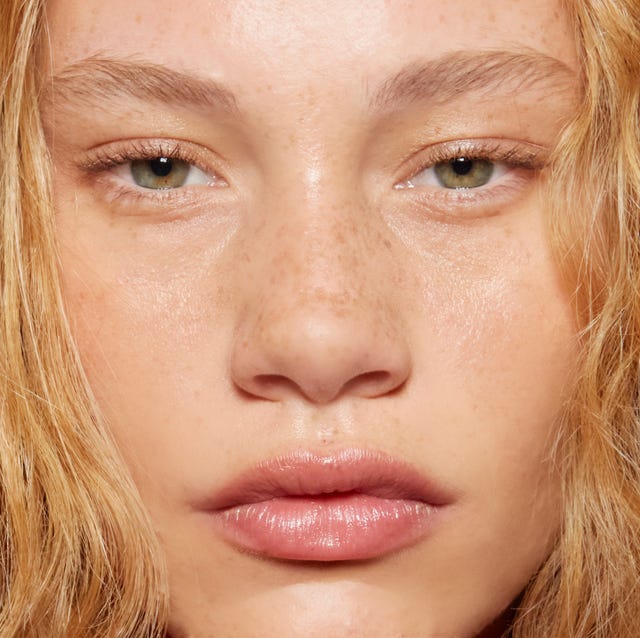
Every item on this page was chosen by an ELLE editor. We may earn commission on some of the items you choose to buy.
A universally effective ingredient, vitamin C has cropped up in your favorite formulas, from facial cleansers to face masks to moisturizers , and wrinkle creams . “Vitamin C is a topical antioxidant that has many beneficial properties,” says celebrity dermatologist Dr. Karan Lal . “It reduces hyperpigmentation and acts as a cofactor for many cellular processes to maintain naturally glowing skin. Most of all, it scavenges free radicals that we come in contact with every single day.”
In addition to enhancing skin with a touch of radiance, vitamin C yields the power to make skin appear more youthful. According to fellow dermatologist Dr. Omar Ibrahimi , “[it’s] a key molecule for optimizing skin health and is an important and necessary cofactor (supporting molecule) that is required for the production of collagen, which is our skin’s main building block and currency for youthful skin.”
However, there’s one caveat that you should keep in mind while selecting a vitamin C serum for yourself. Some vitamin C serums are quite potent due to high concentration levels, so it’s essential to pay attention to this. “Vitamin C can be irritating at concentrations at or above 20 percent,” says Dr. Lal. Especially if you’re new to the vitamin C world, Dr. Lal recommends choosing a serum that includes a 10 percent concentration level. Overall, though, no matter your tolerance, Dr. Ibrahimi says to look for vitamin C formulas with L-ascorbic acid, the true active form of vitamin C. “L-ascorbic acid is the best option for most, as it is the most bioactive vitamin C compound,” he says.
Our top picks for vitamin C serums in 2024
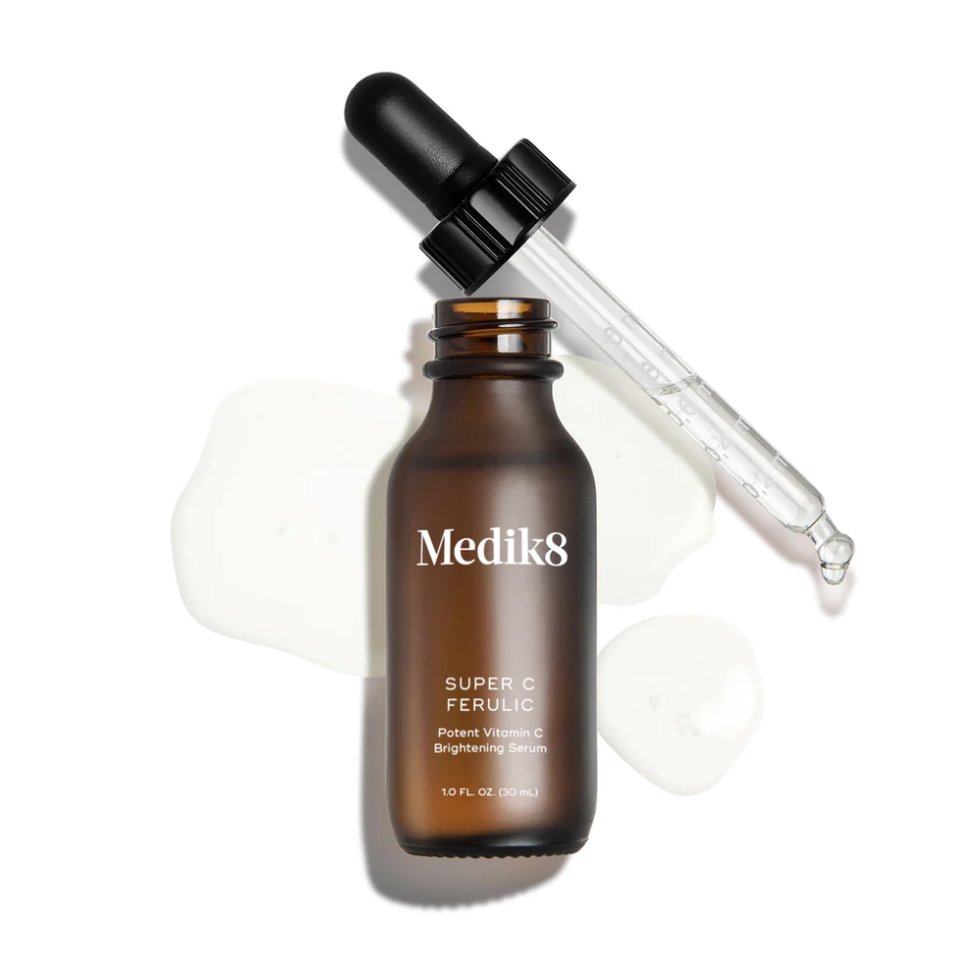
Best Overall
Medik8 super c ferulic.
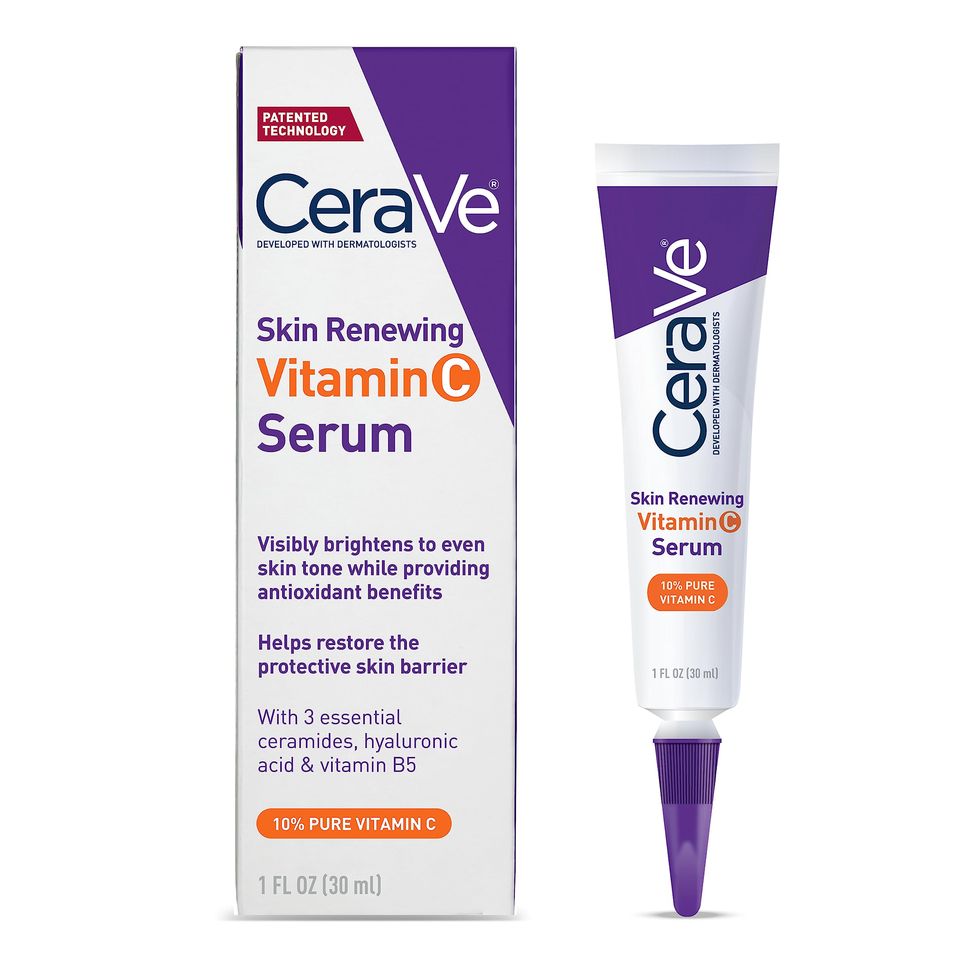
Best for Beginners
Cerave skin renewing vitamin c serum.
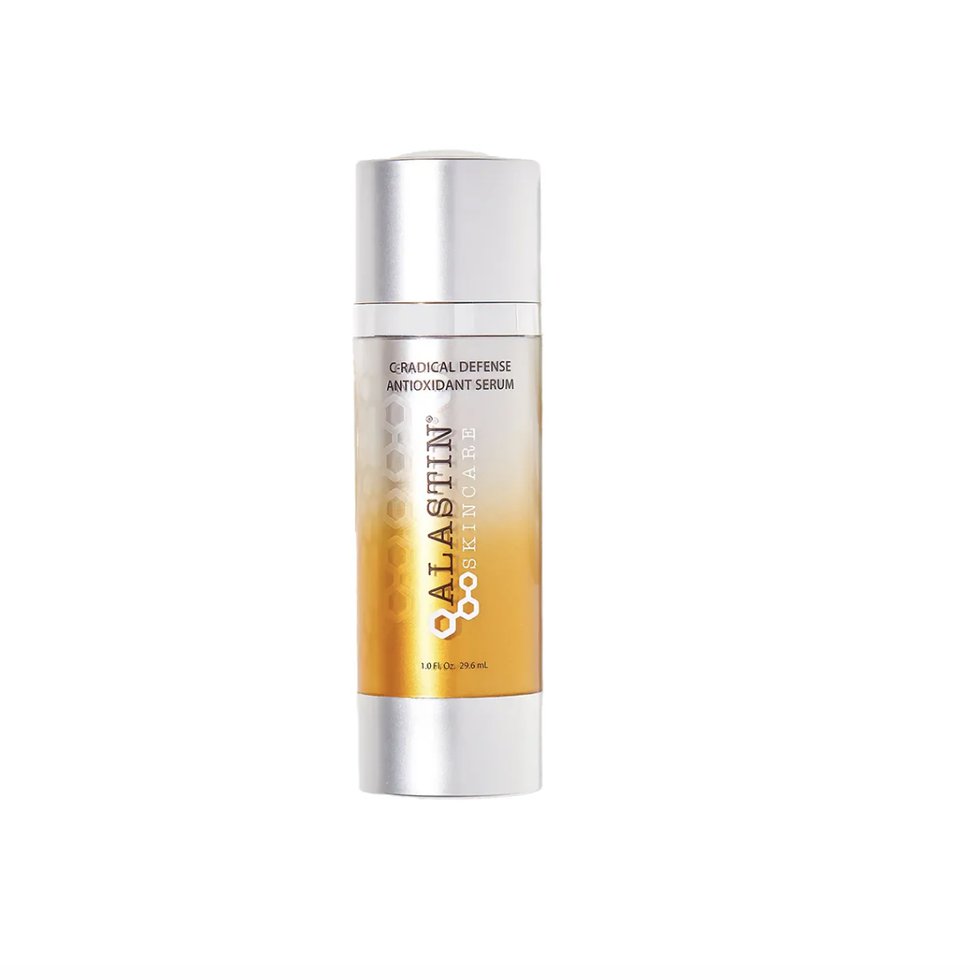
Best Antioxidant-Rich Formula
Alastin c-radical defense antioxidant serum.
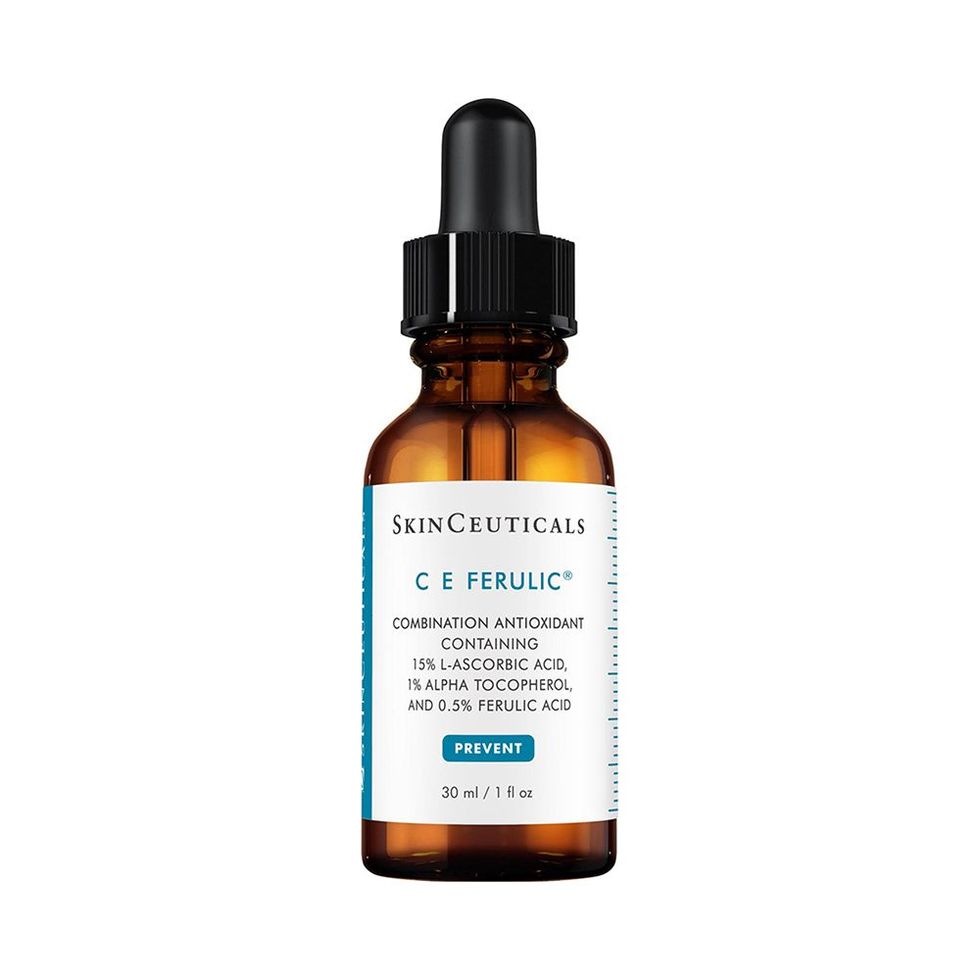
SkinCeuticals C E Ferulic
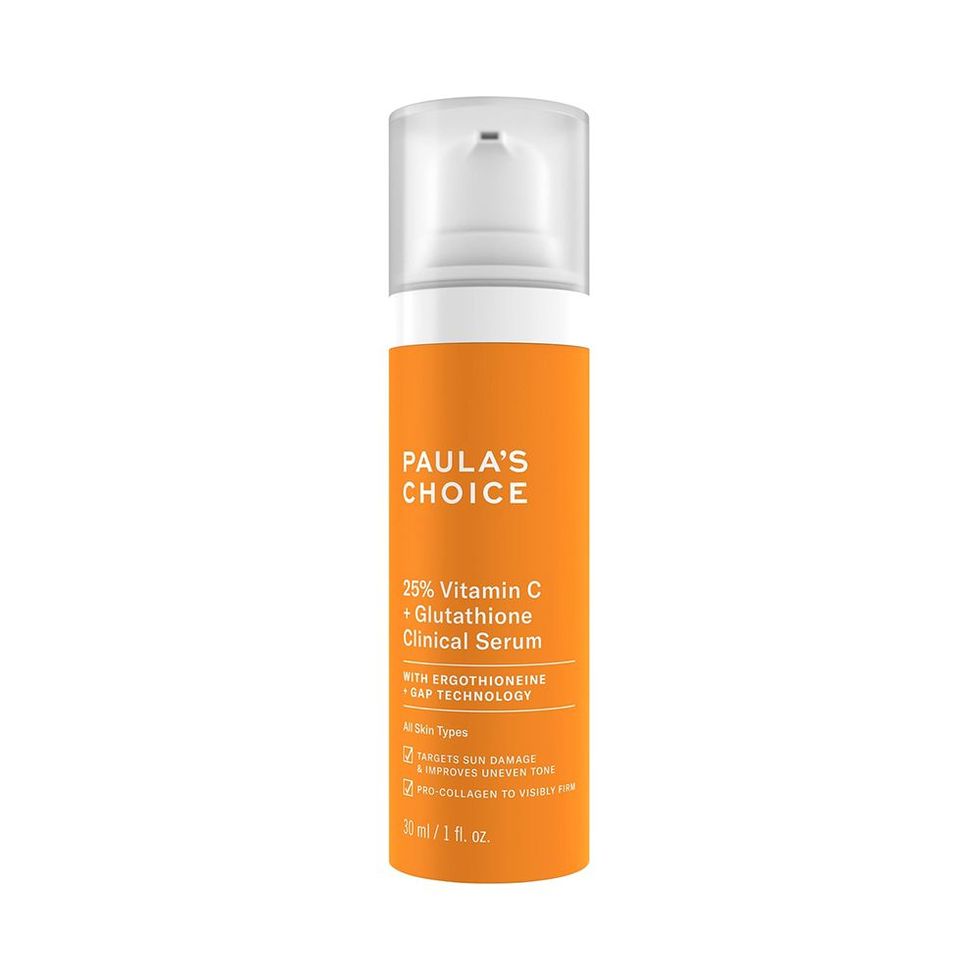
Best for Brightening Skin
Paula's choice 25% vitamin c + glutathione clinical serum.
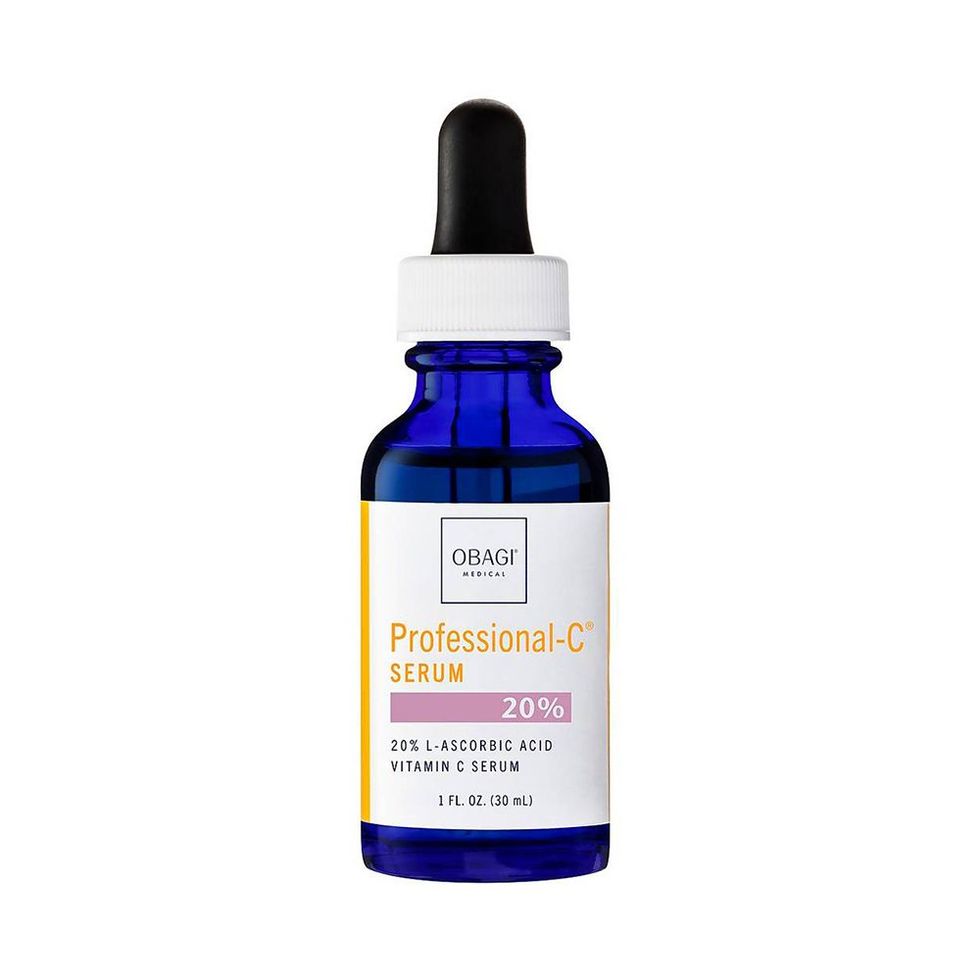
Best for Hyperpigmentation
Obagi medical medical professional-c serum 20%.
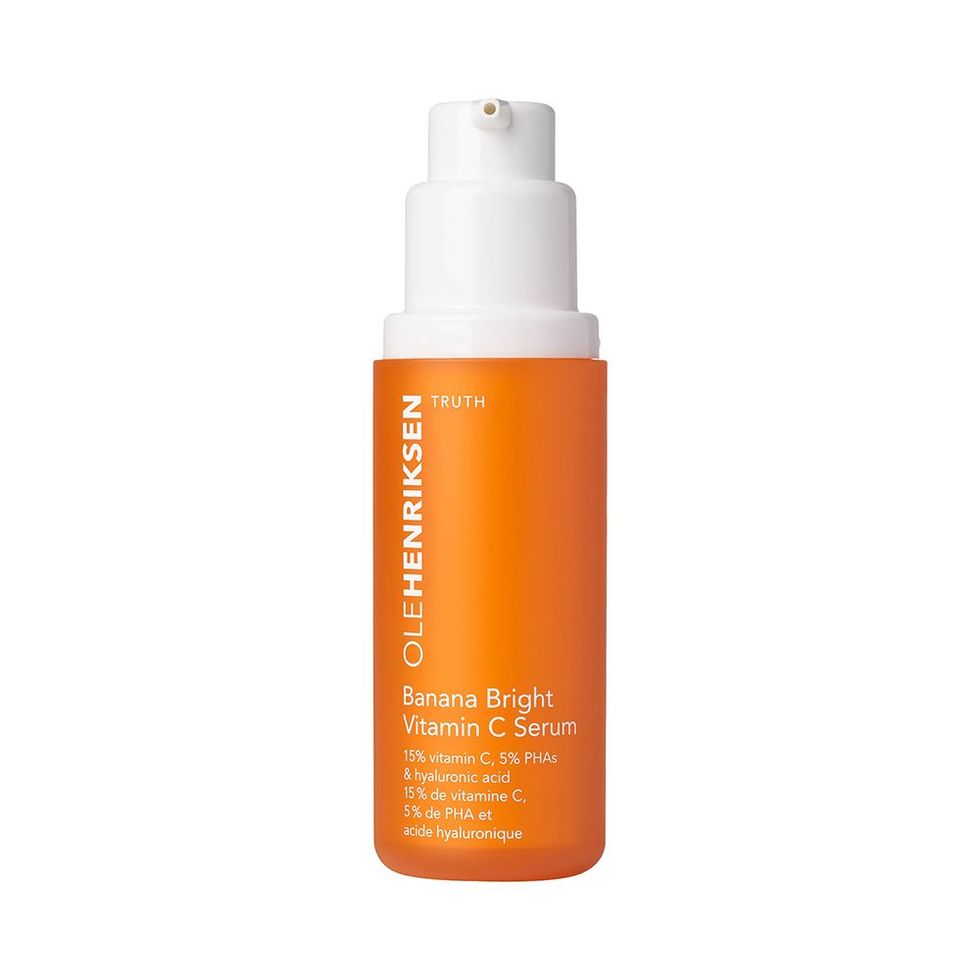
Best for Fine Lines
Olehenriksen banana bright 15% vitamin c dark spot serum.
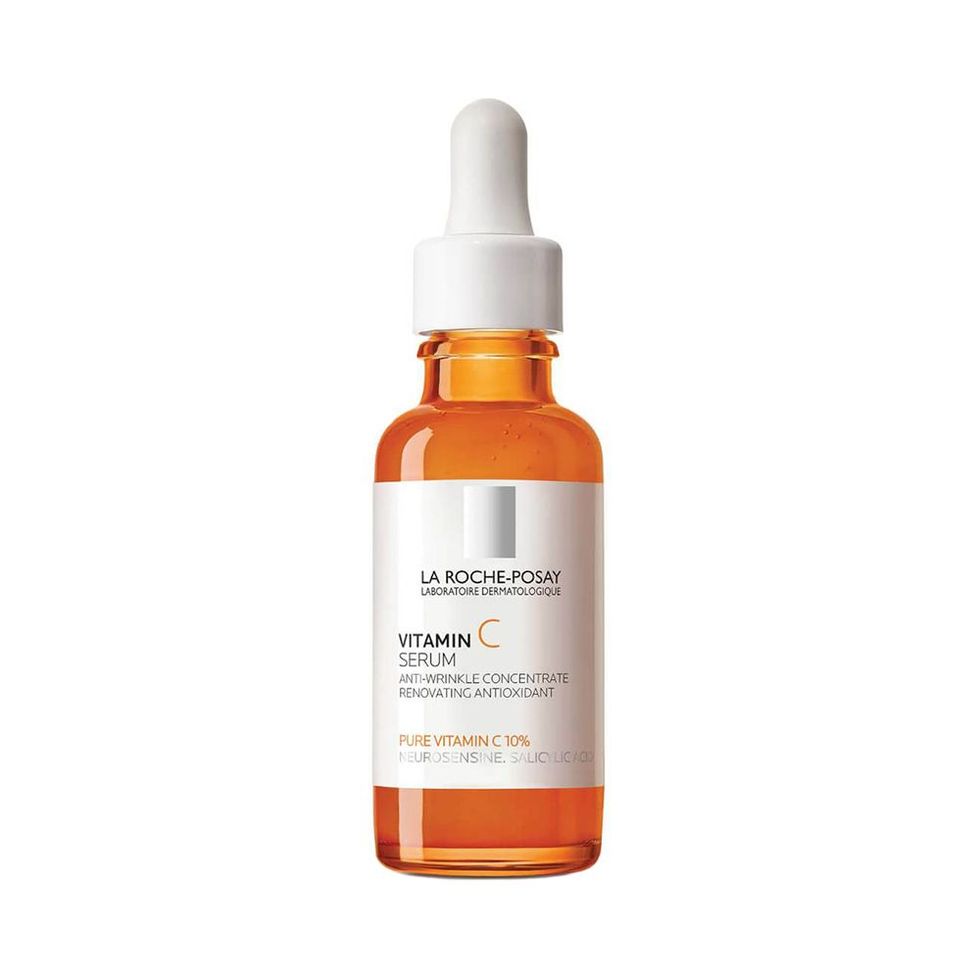
Best for Acne-Prone Skin
La roche-posay pure vitamin c face serum.
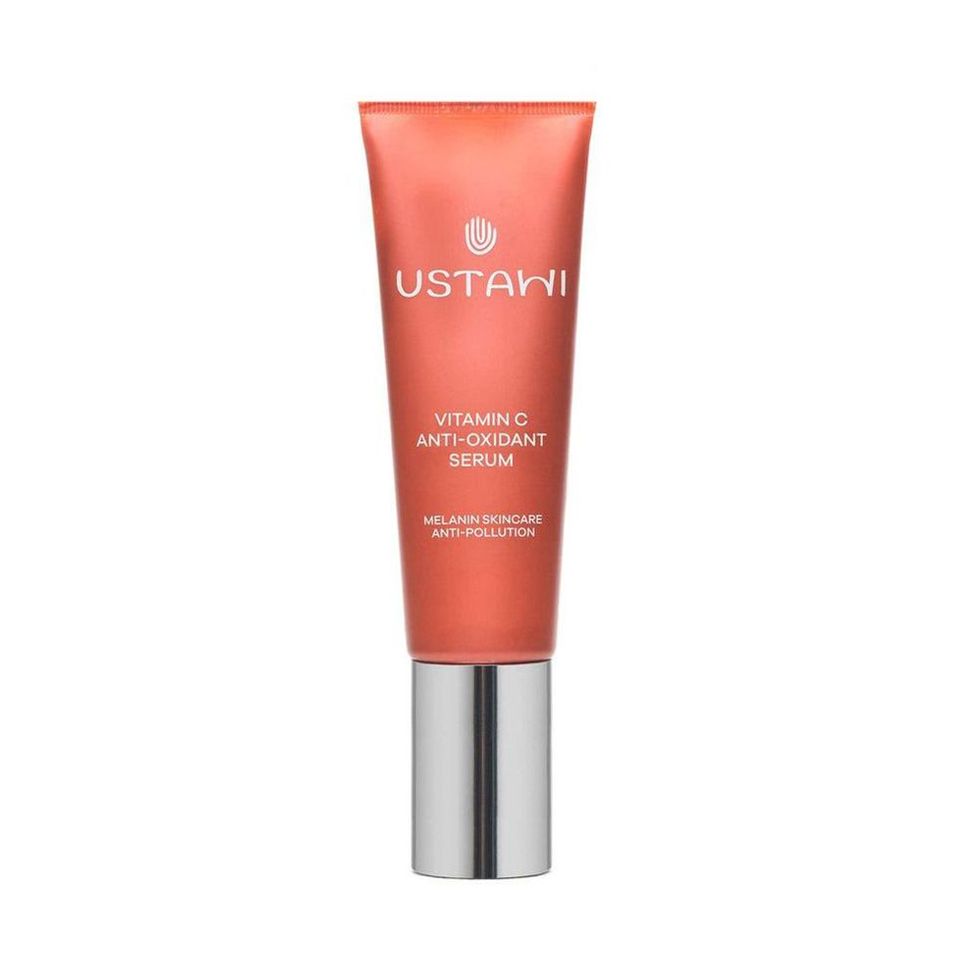
Best Time-Release Formula
Ustawi vitamin c antioxidant serum.
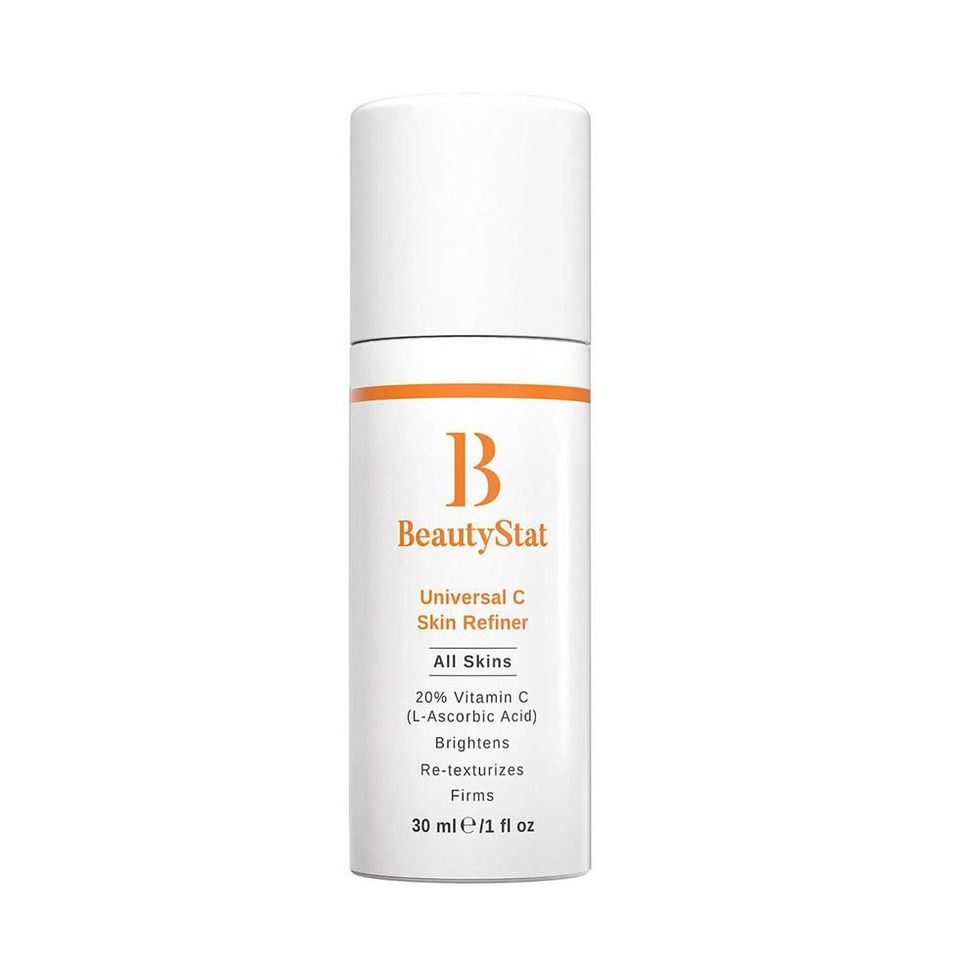
Best for Skin Texture
Beautystat universal c skin refiner.
If you think your skin needs a vitamin C boost , look no further. We’ve perused thousands of customer reviews and consulted our personal collection of products to find the 15 best vitamin C serums for glowy skin.
Key ingredients : L-ascorbic acid, ferulic acid, vitamin E
Size : 1 fl oz
Vitamin C plays well with a number of ingredients, but none better than ferulic acid. Both vitamin C and ferulic acid are potent antioxidants that address discoloration and ward off free radicals that prompt premature aging . This Medik8 formula packages 30 percent (!) L-ascorbic acid and ferulic, along with vitamin E for added cushion.
Medik8 rating : 4.6/5 stars
An ELLE Editor says : “As a former vitamin C hater, I was skeptical to try a new formula but was pleasantly surprised by how well my skin behaved with Super C Ferulic (read my review here ). I have the most stubborn dark marks, so I knew I wouldn’t see any major transformation. However, after a few uses of this serum, my skin looked brighter and felt smoother, and some marks even lightened up. The consistency is light and absorbs fast, so no sticky residue here!” — Nerisha Penrose , ELLE.com beauty commerce editor
Key ingredients : l-ascorbic acid (vitamin C), hyaluronic acid, ceramides
What’s not to love about CeraVe? The brand is powered by gentle yet efficacious ingredients and backed by your favorite dermatologists. This vitamin C serum costs about as much as two bottles of orange juice, but the results last longer than the taste of the final sip. Brightening vitamin C works in tandem with nourishing ceramides and hyaluronic acid to whip dull, stressed skin into shape. Amazon rating : 4.5/5 stars Our expert says : “Who is a good candidate for vitamin C? In general, all skin types and skin tones can benefit from a vitamin C serum. I love CeraVe Skin Renewing Vitamin C Serum because it’s formulated with 10% l-ascorbic acid, which is the most active form of vitamin C, and in the right concentration to deliver peak benefits, like improved skin tone and texture. It’s also fragrance-free, non-comedogenic, and allergy-tested, so it’s effective yet gentle.” — Dr. Charles Puza
Key ingredients : Sodium ascorbate (vitamin C)
Thanks to this formula, an army of antioxidants takes on a slew of tasks to bring you closer to the skin of your dreams. By now, we know vitamin C corrects dullness and prevents any damage free radicals cause ; simultaneously, the antioxidant-powered serum improves elasticity, boosts collagen, and protects against external stressors that trigger the skin.
Alastin rating : 4.5/5 stars
An Alastin reviewer said : “Love, love, love this serum! It’s the only Vitamin C product I’ve found that isn’t oily and doesn’t sting. It has a wonderful silky texture that absorbs almost immediately. I’ve used this since it was introduced and my skin is brighter and more even-toned.”
Key ingredients : Antioxidants, hyaluronic Acid, vitamin C, vitamin E Size : 1 fl oz
Beloved by many a smooth-skinned celeb and knowledgeable dermatologists, this brightening serum contains vitamin C, vitamin E, and ferulic acid to replenish the skin. Because vitamin C can be very unstable in skincare, a dding ferulic acid helps it last longer –and work better.
Dermstore star rating : 4.7/5 stars
An ELLE editor said: “I can’t remember what life was like before the C E Ferulic acid became a mainstay in my morning routine, but it had to be as dull and lifeless as my skin at the time. As a former scar picker, this serum helped balance my tone and smooth my texture over time. Now, I’m not so ashamed to go makeup-free as I once was.” — Nerisha Penrose
Key ingredients : Vitamin C, glutathione, ergothioneine Size : 1 fl oz
With vitamin C, glutathione, and ergothioneine, this serum instantly brightens dull skin . Depending on your skin’s sensitivity, you can use the product alone or add a few drops to your favorite moisturizer for a more diffused but equally effective application.
Sephora star rating : 4.7/5 stars
A Sephora reviewer said: “ This product is absolutely amazing. I am always looking for vitamin C products and recently started trying Paula’s Choice products. I use 1-2 pumps all over my face and I think it is brightening up my skin tone and texture. I recommend it. I actually bought this for my sister and mom as well.”
Key ingredients: Antioxidants, hyaluronic acid, vitamin C Size: 1 fl oz
Obagi’s vitamin C serum is super lightweight, but it still makes a powerful impact on your skin. This L-ascorbic acid-infused blend effectively penetrates the skin while brightening hyperpigmentation and providing antioxidant protection from UV damage.
A Dermstore reviewer said: “Whenever anyone asks me about my skin, I always tell them I use this. It makes my face more hydrated, smoother, and radiant after use. It’s my amazing holy grail.”
Key ingredients : Vitamin C, phas, hyaluronic acid Size: 1 fl oz
Environmental damage is often the worst enemy to skin, as it causes irritation, damage, and even fine lines. Olehenriksen’s vitamin C-infused serum actively fights and protects against environmental stressors while reducing the appearance of wrinkles. You’ll notice a less inflamed , smoother, and happier complexion.
Sephora star rating : 4/5 stars
A Sephora reviewer said: “This is honestly a great vitamin C serum, it definitely brightens your face in the span of just wearing it for a few minutes. I noticed it helped smooth and clear my skin due to its 15 percent vitamin C.”
Key ingredients : Hyaluronic acid, vitamin C, salicylic acid
This serum does it all and then some; vitamin C is used to brighten and improve skin texture, hyaluronic acid adds moisture and plumpness to the skin, and salicylic acid reduces oiliness , which leads to breakouts. The result is radiant, glowing skin that’s hydrated and blemish-free.
Amazon star rating : 4.6/5 stars
An Amazon reviewer said: “I have hormonal acne that I thought would never go away. Plus, I’m in my late 20s and started to see signs of aging. I love this product. It helps with fine lines and wrinkles while also opening up your pores to release gunk. Fantastic.”
Key ingredients : Vitamin C, niacinamide, licorice root
This powerful yet gentle serum uses a version of time-released vitamin C in its formula, so the antioxidant effects of the ingredient last throughout the day as you wear it. It’s also made up of primarily naturally derived ingredients, so you can be sure you’re not putting your skin through too much stress.
Nordstrom star rating : 4.2/5 stars
A Nordstrom reviewer said: “ This serum is light yet hydrating. I love the fresh scent and texture, which melts into my skin. After several weeks of daily use, my skin feels firmer and more even. I use it once a day under my moisturizer. It is not sticky, either.”
Key ingredients : Vitamin C, squalane
This serum contains 20 percent potent, stable vitamin C to brighten, firm, and smooth textured skin for fast and effective results . It doesn’t mess around, so be ready to notice results faster than expected. Even Hailey Bieber , aka the queen of glazed doughnut skin, is a fan of its “incredible softening and brightening effects,” she said in a video interview .
Amazon star rating : 4.2/5 stars
An ELLE editor says: “This formula contains the highest percent of pure vitamin C allowed in over-the-counter topicals and has a patented encapsulated delivery system preventing oxidation. I never thought that vitamin C worked on my skin, and it often would cause my other serums to pill, so it’s a skin care step I often skipped—until this formula. I have been using this daily for about a month and notice the texture of my skin is smoother and more radiant.” — Danielle James , digital beauty director
Biossance Squalane + Vitamin C Dark Spot Serum
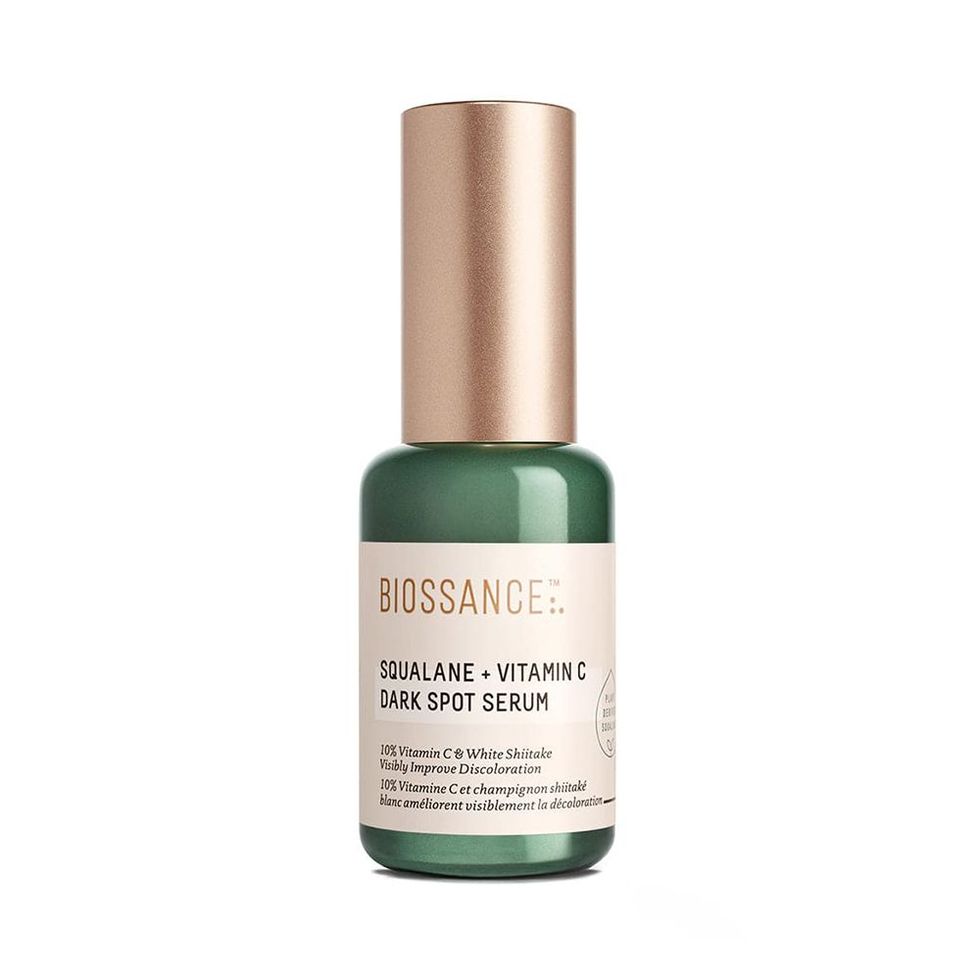
While vitamin C helps fade dark spots on the skin, the combination of squalane and natural extracts p rotects the skin from future photodamage . That means that over time, you’ll notice your skin tone becoming more even and supple—as did one of ELLE’s beauty writers, who now swears by the product .
Biossance star rating : 4.5/5 stars
A Biossance reviewer said: “Within a week or two of using this, I had a brown spot on my forehead go away that I never thought would disappear without going to a dermatologist. I have used every designer cream, but this one is all about the environment and works. So in love. Try this; you’ll be so happy!”
Sunday Riley C.E.O. 15% Vitamin C Brightening Serum

Key ingredients : Vitamin C Size : 1 fl oz
In the short term, this potent serum will help skin look radiant and glowy , like you just got a facial. But with continual use, the vitamin C and glycolic acid combo fades dark spots , hyperpigmentation, reduces pore visibility, and smooths out the skin’s textur e .
Nordstrom star rating : 4.4/5 stars
A Nordstrom reviewer said: “ At 51, I have a couple of age spots, and this serum has lightened them gradually. My skin is glowing. I use this with the Good Genes and have seen a dramatic result in reducing pore size.”
Dr. Barbara Sturm The Good C Vitamin C Serum
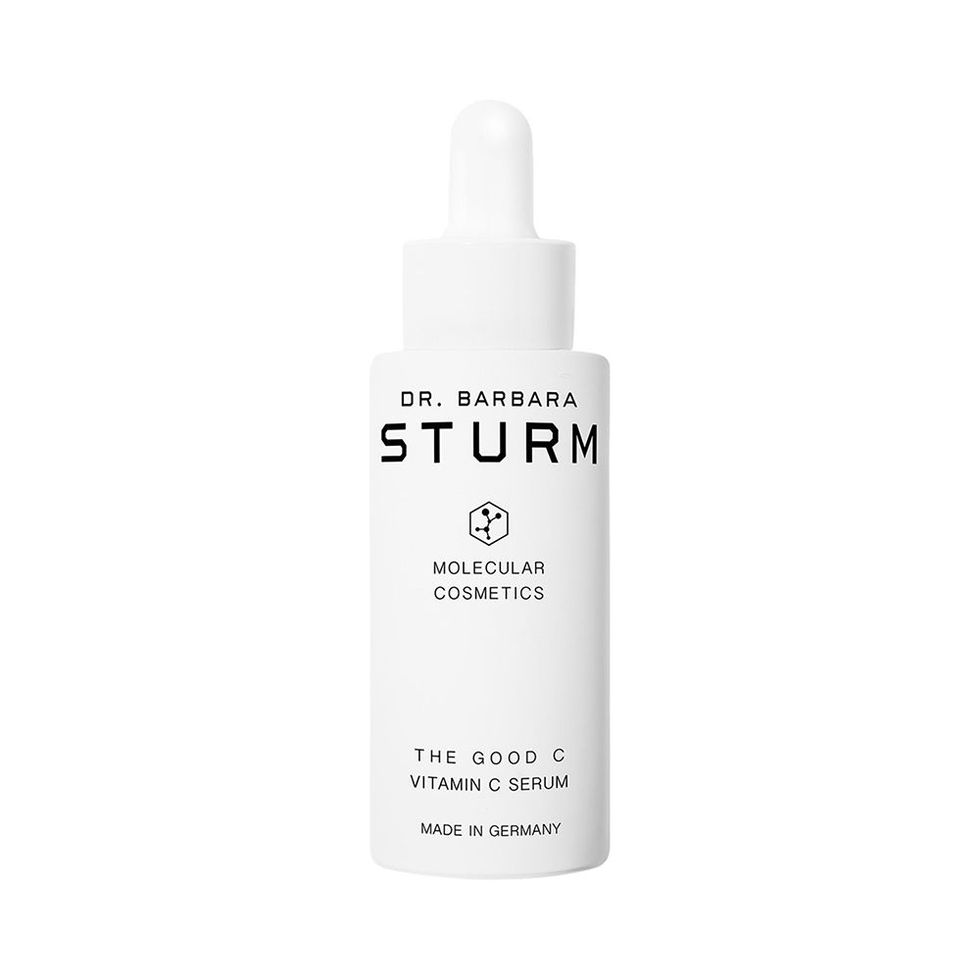
Key ingredients : Vitamin C, kakadu plum extract
This celeb-favorite skincare line created a gentle vitamin C serum perfect for anyone with reactive skin . Using a combination of synthetic and naturally-derived vitamin C, your skin will be red carpet ready and glowing in no time.
Nordstrom star rating : 3.6/5 stars
An ELLE editor said: “I like this formula for maintenance of my even skin tone. It plays well with my skincare routine and does not pill when I apply sunscreen as my last step. With only 5 percent Vitamin C, this isn’t the strongest of formulas, so if you are looking for something to get rid of hyperpigmentation and dark spots quickly, I’d suggest a formula with a minimum of 10 percent Vitamin C. However, if you have sensitive skin, this will be a great option for you.” — Danielle James
Vichy LiftActiv Vitamin C Serum
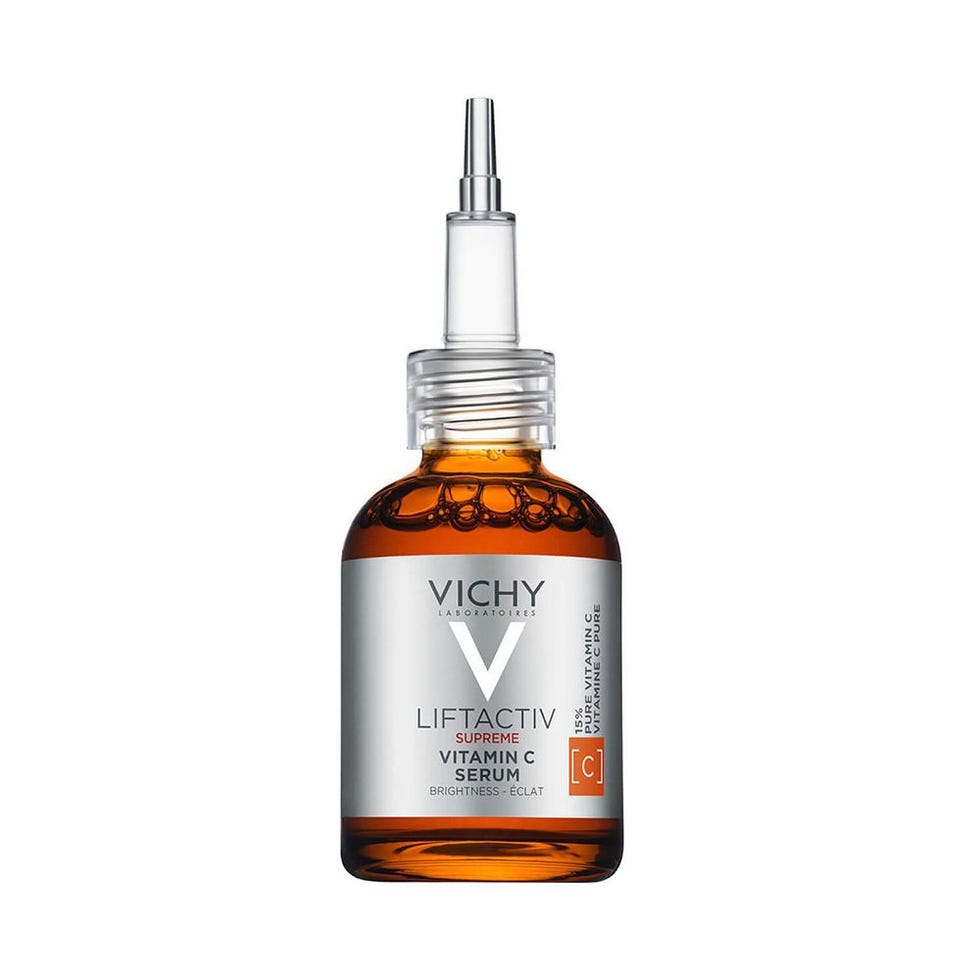
Key ingredients : Vitamin C, vitamin E
With 15 percent vitamin C, vitamin E, and a special antioxidant derived from pine bark, this anti-aging formula corrects and treats dullness, discoloration, and fine lines . With so many powerful ingredients in one bottle, you can probably cancel your next facial appointment.
Vichy star rating : 4.3/5 stars
A Vichy reviewer said: “I’ve only been using this for a week and am already seeing great results with reduced fine lines around my mouth and face. It feels rejuvenating when you use it, and I actually feel a tightening happening. My skin is brighter and more illuminated. I am turning 60 this year, so really looking for ways to battle these lines, and they look good!”
Omorovicza Daily Vitamin C Serum
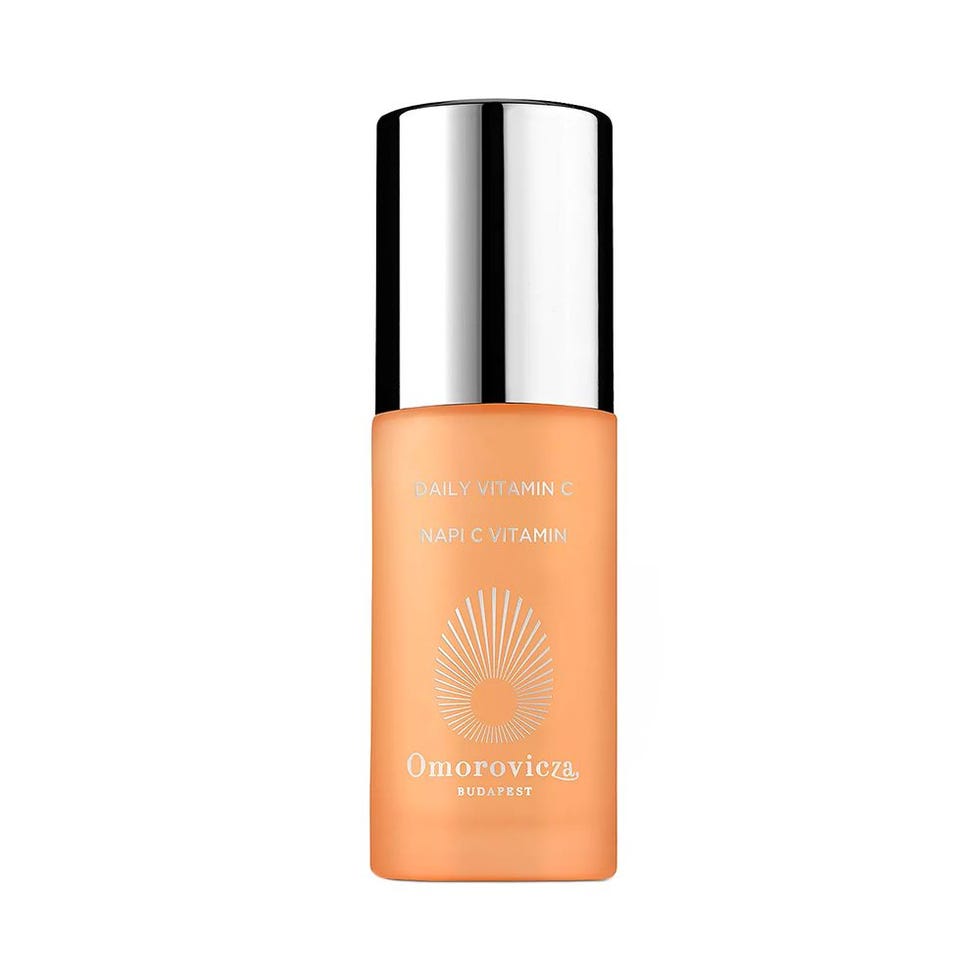
Key ingredients : Vitamin C, hyaluronic acid
Omorovicza uses vitamin C to stimulate collagen in your skin , leading to a more plumped, youthful texture. The milky formula absorbs quickly while leaving your skin nourished and hydrated.
Nordstrom star rating : 3.8/5 stars
A Nordstrom reviewer said: “I really liked how lightweight the product went on. It felt airy and my skin absorbed it so quickly without feeling dry afterward. I was also really impressed with how lustrous my skin looked.”
.css-1wfsl5s{font-family:SaolDisplay,SaolDisplay-fallback,SaolDisplay-roboto,SaolDisplay-local,Georgia,Times,serif;font-weight:normal;margin-bottom:0.625rem;margin-top:0.625rem;text-align:center;}@media(max-width: 48rem){.css-1wfsl5s{font-size:2.375rem;line-height:1.2;}}@media(min-width: 48rem){.css-1wfsl5s{font-size:2.375rem;line-height:1.2;}}@media(min-width: 64rem){.css-1wfsl5s{font-size:3rem;line-height:1.2;letter-spacing:-0.0225rem;}}@media(min-width: 73.75rem){.css-1wfsl5s{font-size:3rem;line-height:1.2;}}.css-1wfsl5s b,.css-1wfsl5s strong{font-family:inherit;font-weight:bold;}.css-1wfsl5s em,.css-1wfsl5s i{font-style:italic;font-family:inherit;} Is vitamin C safe?

In addition to choosing the right formula strength for you, it’s important to note that “vitamin C is photolabile, which means it gets degraded with exposure to sunlight,” says Dr. Lal. “It also degrades upon exposure to air. For this reason, keep your vitamin C product in a dark place and make sure you tightly close your bottle to prevent breakdown of the product.”
Who is a good candidate for vitamin C?

While vitamin C has impressive benefits for the skin, it's important to understand whether your skin can tolerate it.
“In truth, everyone should be using a vitamin C product due to its reparative properties,” says Dr. Lal. “However, those with dry, sensitive skin, or acne should be careful and start out slow to prevent breakouts.” You can begin by patch testing, then gradually incorporate the serum into your routine to build up a tolerance. Lal also notes that serums are lightweight and usually combined with agents that allow for better penetration, whereas creams and lotions are meant to stay on top of the skin and work superficially. “Vitamin C serums take at least 12 weeks to take effect because it takes time for new cells to regenerate and for pigment to start clearing,” he adds.
When should you use vitamin C?

If vitamin C immediately conjures images of orange juice, then you already have your answer. “As a board-certified dermatologist, I consistently counsel my patients on the benefits of adding a vitamin C serum into their routine. I recommend applying a vitamin C serum each morning after cleansing the skin and before applying moisturizing and sunscreen,” Dr. Charles Puza says.
Can I use a vitamin C serum everyday?

Yes, as long as you’re not cocktailing too many actives and using sunscreen. If you have sensitive skin, patch testing is essential. “If you have sensitive skin, you might want to test the product on the side of your face or neck for a few days before widely applying it,” says Dr. Ibrahimi. “Try to use a derivative that tends to be better tolerated. I would also avoid using Vitamin C during or immediately after any laser or microneedling procedures as the skin barrier becomes more sensitive and there is a higher likelihood of irritation even in folks that do not have sensitive skin.”
Meet the Experts

Dr. Karan Lal is a double board-certified celebrity dermatologist with Schweiger Dermatology Group in New Jersey.
Dr. Omar Ibrahimi is a board-certified dermatologist and founder and medical director of the Connecticut Skin Institute .
Dr. Charles Puza is a board-certified dermatologist at MOMA Dermatology and CeraVe brand partner.

Sabrina Elba Is Introducing A-beauty to the Masses

13 Best Cellulite Creams for Smooth Skin

The 20 Best Face Exfoliators for Every Skin Type

The 10 Best Facials Worth the Splurge in 2024
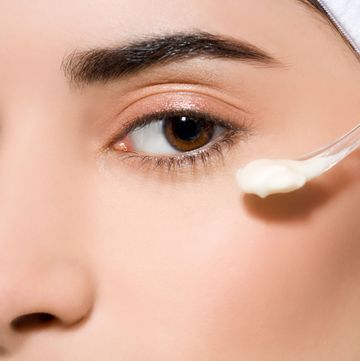
10 Best Peptide Eye Creams for Smoother Under Eyes

10 Home Red Light Therapy Devices to Reduce Acne

The 12 Best Anti-Wrinkle Creams

What Are Best Growth Factor Serums?

Best Skin Care Benefits of Seaweed
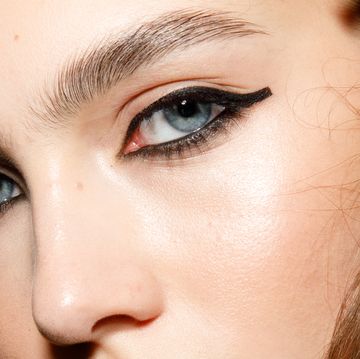
12 Best Wrinkle Filler Serums
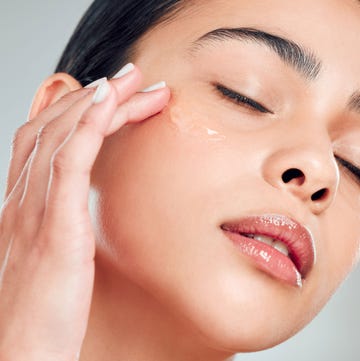
A Detailed Guide on Polyhydroxy Acids in Skin Care

IMAGES
VIDEO
COMMENTS
Vitamin D. Vitamin C gets a lot of attention when it comes to immune system functioning, ... Many road warriors swear by Emergen-C, the effervescent, travel-friendly powdered drink mix that now comes in an immune-boosting formula with 1,000mg of vitamin C, vitamin D and zinc. Drink it before and during your travelers to fight of sickness.
Immunity. #1. Vitamin D. This vitamin is crucial to bring with you during your travels because it supports bone, blood, and immune system health. Vitamin D allows your body to absorb calcium to build strong bones. It also helps maintain phosphorus levels in the blood and helps your immune system fight off disease.
Supplements for the immune system. Traveling can put a stress on the immune system so it's important that it is functioning well. Key nutrients for the immune system include vitamin A, C, D, Zinc, Elderberry and Beta Glucans. Don't fret over taking all of these individually, as many supplement companies offer immune complexes which have most ...
Tip #1: Do Not Worry about the TSA. Tip #2: Leave the Liquid Vitamins at Home or on the Store Shelf. Tip #3: Keep Your Vitamins in Your Carry-On Bag. Tip #4: Use a Special Container to Hold Your Vitamins. Tip #5: Purchase Vitamins That Are Packed in Good Containers. Tip #6: Look for Hard Vitamins.
This travel supplement packs some key nutrients—vitamin C, vitamin D3, and zinc—known to support a healthy immune system into one convenient tablet. "In addition, it contains astragalus, an ...
Travel With Theanine. Giphy. If it's relaxation you're after during your travels, turn to Theanine. "This is an amino acid found in green tea, among other places, and is connected to the relaxing ...
A Vitamin C supplement like 1000 mg Chewable Tablets can be a beneficial travel companion as it's an easy way to keep up your immune health routine.† 4. Vitamin D. Taking a Vitamin D supplement can be beneficial as part of your regular health routine, particularly when you're traveling, as Vitamin D is essential to support a healthy ...
Vitamin C is a tried-and-true friend when it comes to keeping you healthy on your journeys. Many travel-goers claim the best vitamin C for travel comes in effervescent tablets that dissolve in water (such as Emergen-C). However, this essential vitamin also comes in chewables, pills, and even in gummies.
If you do develop a cold, zinc lozenges may help to reduce the severity and/or duration of symptoms. (If you develop a cold while taking vitamin C, it may modestly reduce symptom severity and duration, but starting vitamin C supplementation after symptoms have already begun may not be helpful.) Keep in mind when traveling that certain ...
For example, vitamin C enhances iron absorption, while vitamin D aids in calcium absorption. Keep in mind these interactions when selecting your supplements to maximize their efficacy. ... and stress management during travel. Vitamin C, vitamin D, B vitamins, and antioxidants are often recommended for these purposes. Target specific health ...
4. Helps with wound healing. Vitamin C encourages collagen growth, which is an important part of your body's healing process. "Collagen is a protein that keeps our skin looking young," Peart ...
"Specifically vitamin C, vitamin D, zinc, and probiotics." Get enough sleep. Prepping for a healthy and happy trip also means ensuring you catch enough Zs before you go.
Turmeric. Magnesium. B vitamins. tl;dr. Design by Dana Davenport. My body never knows what time zone it's in. As a travel writer, I typically go on at least two trips a month. It's a dream ...
Yes, you can take vitamins in your carry-on and personal item luggage. While not required, it can help the screening process to have your vitamins clearly labeled or in their original containers. Liquid vitamins and supplements do still have volume limits of 3.4 oz, or 100 mL, just lke all carry-on liquids.
Vitamin C : Mini & Travel Size Products. A quick dash to the airport for a weekend getaway or business trip requires one to pack efficiently. Packing travel-sized toiletries, makeup and essentials is the way to do it. A toiletry bag can have anything from soap, shampoo, conditioner, toothpaste, toothbrush, body wash, sunscreen, body lotion, dry ...
Although colds and flu are not uniquely travel-related hazards, many people try to avoid these illnesses during a trip. Complementary health approaches that have been advocated for preventing or treating colds or influenza include echinacea, garlic and other herbs, nasal saline irrigation, probiotics, vitamin C, zinc products, and others. Echinacea
Safety: Even at high doses, vitamin C supplements appear safe. Other Approaches for Colds and Flu There's no strong evidence that echinacea, garlic, Chinese herbs, oil of oregano, or eucalyptus essential oil prevent or treat colds or that the homeopathic product Oscillococcinum prevents or treats influenza or influenza-like illness.
8 Qualities to Look For in Small Travel Bags For Women. May 19, 2023. The Most Popular CREED Perfume Choices. February 27, 2023. International Christmas Traditions: Gift Baskets Edition. December 24, 2023. 10 Gift Ideas for Every Woman in Your Life: The Ultimate Gift Guide. October 5, 2022.
4. Beauty Pie Superactive Capsules Pure Double Vitamin C & Vitamin E Serum. While all of the products in this article are TSA- approved and relatively small in size if you like to travel with as ...
Vitamin C: Known for its immune-boosting properties, Vitamin C is commonly included in travel vitamin packs to help support the immune system. Vitamin D: Important for bone health and immune function, Vitamin D is often included, especially for travelers visiting sun-limited destinations.
Our Top Picks. Best Overall: Fenty Skin The Glow Around 4-piece Travel Skincare Essentials Set at Sephora ($42) Jump to Review. Best Overall, Runner-up: 35thousand All the Radiance Set at ...
Skip to main content.us
That said, there's research showing that vitamin C can have a smoothing effect. 1. For one, it helps your skin produce collagen —a protein that gives your complexion a firmer, bouncier look ...
Size: 1 fl oz. Obagi's vitamin C serum is super lightweight, but it still makes a powerful impact on your skin. This L-ascorbic acid-infused blend effectively penetrates the skin while ...